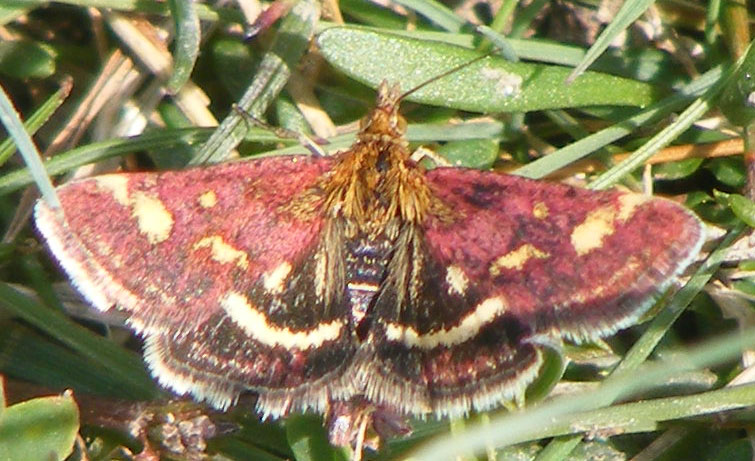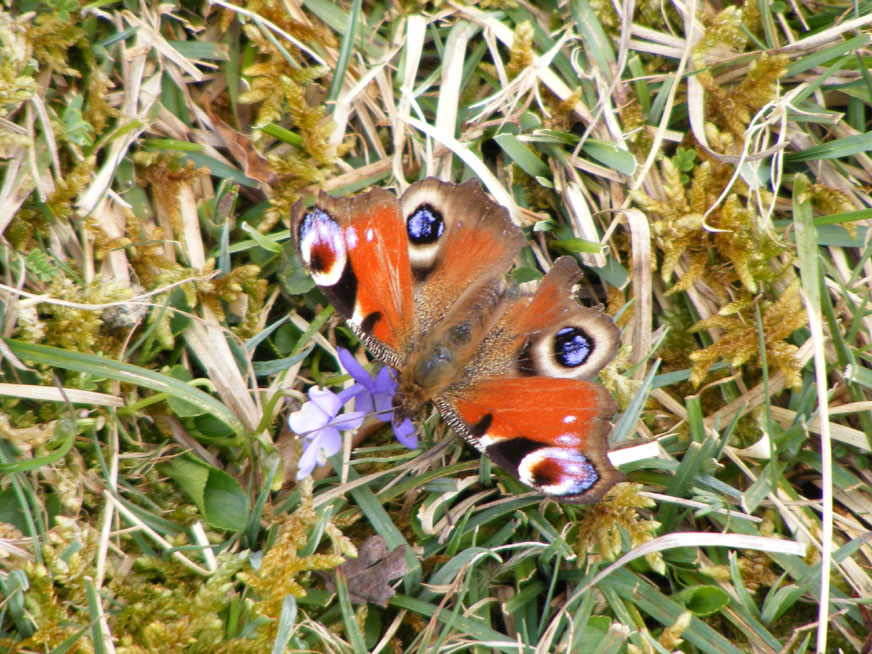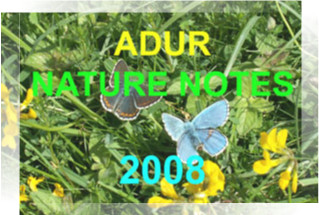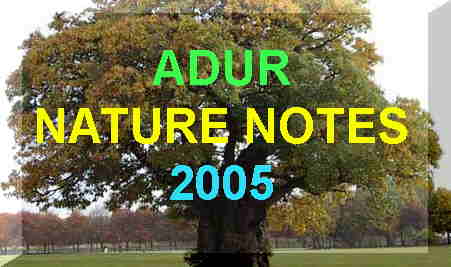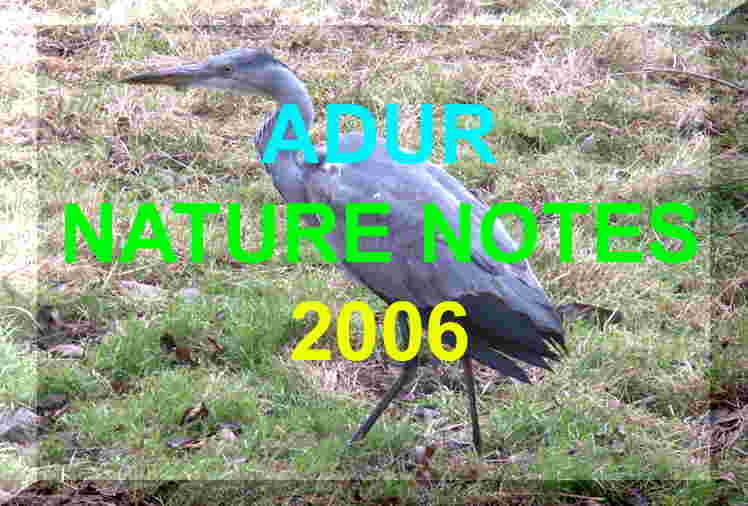-
Adur
Valley
Wildlife
-
Butterflies
and
the Larger
Moths
2009
-
 All
observations by Andy Horton, unless stated otherwise.
All
observations by Andy Horton, unless stated otherwise.
-
It
would be tedious to list all sightings on the main pages, but for
flight
times purposes the following
butterflies
and moths
include ones not recorded on the main Nature Notes
pages:
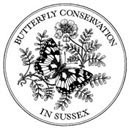
Sussex
Butterfly Reports (Butterfly Conservation Society)
UK
Butterflies: Sightings
Adur
Moths
Adur
Butterfly Flight Times
Adur
Butterflies: First Dates
Adur
Skippers
WILDLIFE
REPORTS
(Narrative):
Butterfly
List 2010
10
-13 November 2009
Continual
poor weather with rain means I think we
have seen the last of the butterflies
for the year, the complete demise after the first few days of November
as in previous years since 2003.
9 November
2009
As
expected it was almost a complete miss for butterflies
on Mill Hill, but in the north-west corner
of Mill Hill Nature Reserve I almost stumbled
over a Clouded Yellow Butterfly which
fluttered on to the Old Erringham pasture and when I almost trod on it
it flew over the Hawthorn
scrub in the direction of the lower slopes of Mill Hill. It
was only positive butterfly sighting of the day and the last butterfly
of the year.
7 -
8 November 2009
After
the torrential rain starting in the afternoon and continuing throughout
the night and into all the morning with a few remissions, I would not be
surprised if I do not see any more butterflies this year, unless a spell
of sunshine or disturbance entices out a Red
Admiral. It was too damp for a visit to Mill
Hill.
7 November
2009
A
Red
Admiral flew around the eaves in West
Street in Shoreham town centre and I assume
that this was the one seen before on three or four occasions. Another Red
Admiral flew over the Dovecote Estate, north-west
Shoreham.
5 November
2009
I
found 60+ Large White Butterfly
caterpillars feeding on four Brussels
Sprouts and Broccoli
plants in a garden near Mill
Hill. There were a wide range of instars
but it seems rather late in the year.
A
Red
Admiral flew near some Ivy on the Bridlepath
to the west of Hoe Cottage, Lancing (on the way from the Sussex Pad to
Lancing
Ring).
4 November
2009
Another
white
butterfly flew near St. Michael's Church,
Southwick, but again it was too far away to determine which out of three
possible species (it wasn't large enough for a female Brimstone).
Later there was just the one Clouded Yellow
was
seen at the northern end of the lower slopes of Mill
Hill, visiting Devil's Bit Scabious
in the early afternoon, before the black clouds
produced a torrential downpour. This Clouded
Yellow was very lively and flew rapidly over
the Hawthorn
scrub to the brow of the hill.
2
November 2009
It
appeared to be a Large White Butterfly
that
fluttered over the top of Buckingham Road, Shoreham (in front of White
Lodge), but I could not get close enough to see for sure to make it the
first time this species has been recorded in November
in these Nature Notes pages. When the sun emerged
from from behind the frequent clouds a Peacock
Butterfly emerged from hibernation by
the Ivy on the edge of the Pixie Path, looking
slightly tatty and this was the first time this species has been seen in
November.
There was also a possible Speckled Wood
flying high over the path.
On
Mill
Hill, a Clouded Yellow
was the first butterfly
to be seen. There were three on the lower slopes including a yellow one
mating with a helice
type (female) which was white with black markings on the upper wing and
creamy yellow on the underside. The was the first time I had seen this
butterfly actually copulating, which occurred over the Horseshoe Vetch,
Hippocrepis
comosa, slopes just over the path. The
Clouded
Yellow Butterflies usually appear with their
wings closed, but it has been reported
that the wings actually open and close faster than the human eye can observe,
and in the photograph above, I surmise pre-mating sequence of about a second,
that the wings open and close at a slower rate. A
further Clouded Yellow
was seen on the upper slopes by the
Reservoir,
the last butterfly seen in the afternoon. This one was teased on to my
finger as it appeared slightly lethargic.
Clouded
Yellow Butterfly (Link to a recommended photograph by Dave
Appleton)
Pre-mating,
female Clouded
Yellows (as well as Berger's
and Pale
Clouded) may hold their wings open for
some considerable time (up to a minute) and males will attend them with
wings half-open.
More
Images (by Guy Padfield)
A few
minutes afterwards the first female Common
Blue visited a Hawkbit
and then the single Devil's Bit Scabious flower.
This was the first of three females and a tatty male (or indeterminate)
Common
Blue. This species was another first for November.
The Adonis Blues
were not seen.
Adur
Butterfly Flight Times
Three
species plus a probable
30
October 2009
A
Red
Admiral flew over the Waterworks
Road, Old Shoreham.
29
October 2009
The
Indian summer resumes (15.5
°C at
midday)
and I visited Mill Hill directly through
the Dovecote Estate, where at the top of the estate in Chanctonbury Drive
(SE of the Mill Hill Bridge) amongst the fallen Sycamore
leaves on the grass patch, a damaged Painted
Lady Butterfly seemed incapable of flying
long distances but was able to flutter out of camera range. With the exiguous
supply of nectar flowers on Mill Hill,
the seven other butterflies
were very lively indeed fluttering from Devil's
Bit Scabious (two flowers) to Hawkbits
and away on the breeze. There were two male Adonis
Blues, two Common
Blues (one faded male and a very faded
female), and a bright yellow Clouded Yellow
on
the lower slopes, and another Clouded Yellow
(last butterfly of the day) above the ridge on the top of the hill. A Red
Admiral flew strongly over the Hawthorn
scrub.
Five
species
27
October 2009
Two
Red
Admirals were seen in the Shoreham residential
area.
26
October 2009
I
was in an absent-minded reverie enjoying the brief sunshine and not thinking
about butterflies
when exactly the same Holly Blue Butterfly
of
the previous day fluttered along the
Pixie Path
and was later seen in the Butterfly Copse with the slightly aberrant spot
or damage on the forewing. A Red Admiral
flew
over Frampton's Field, and after I turned the corner on the west-east stretch
of the footpath that runs parallel with the A27,
a very faded pale Clouded Yellow Butterfly
flew past. Less than a minute later on the same part of the Pixie Path
an extremely bright Clouded Yellow
flew over the chestnut fencing into Frampton's Field. I thought I was going
to draw a complete blank on the lower slopes of Mill
Hill, when a pure white black lined Clouded
Yellow fluttered rapidly past. This was the
first time I had seen a completely white one and I have identified this
as a female Clouded Yellow var. Helice,
which would be a first for Mill Hill. (It could have been a rarer Pale
Clouded Yellow or even a Berger's
Clouded Yellow?).
2006
records of Helice variants
Then
to my surprise a nearly new iridescent
male Adonis Blue
was spotted on a single Devil's Bit Scabious
flower
its presence preventing a female
Common
Blue
from landing. This particular Common Blue
was marked very much like a Brown Argus,
and I chased it around until it settled with its wings closed so I could
confirm its identity from its spots. A few minutes later a completely brown,
tatty, and more obvious female Common Blue
showed. The Adonis Blue
was seen to visit the sparse collection of nectar flowers favouring a Stemless
Thistle but also landing on the small Hawkbits
and one Lesser Centaury.
Then another bright Clouded Yellow
flew northwards.
 |
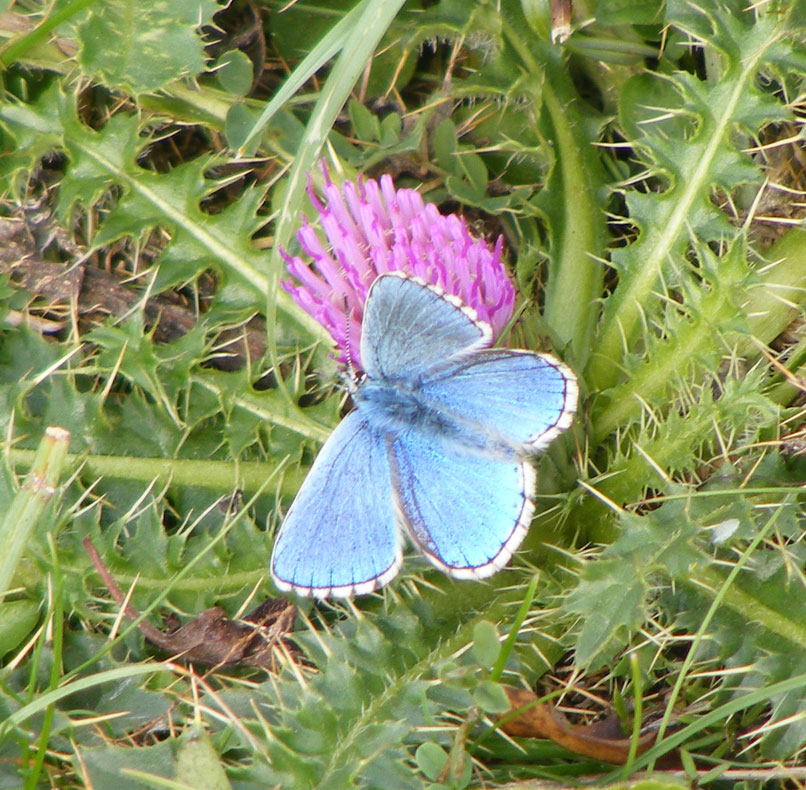
|
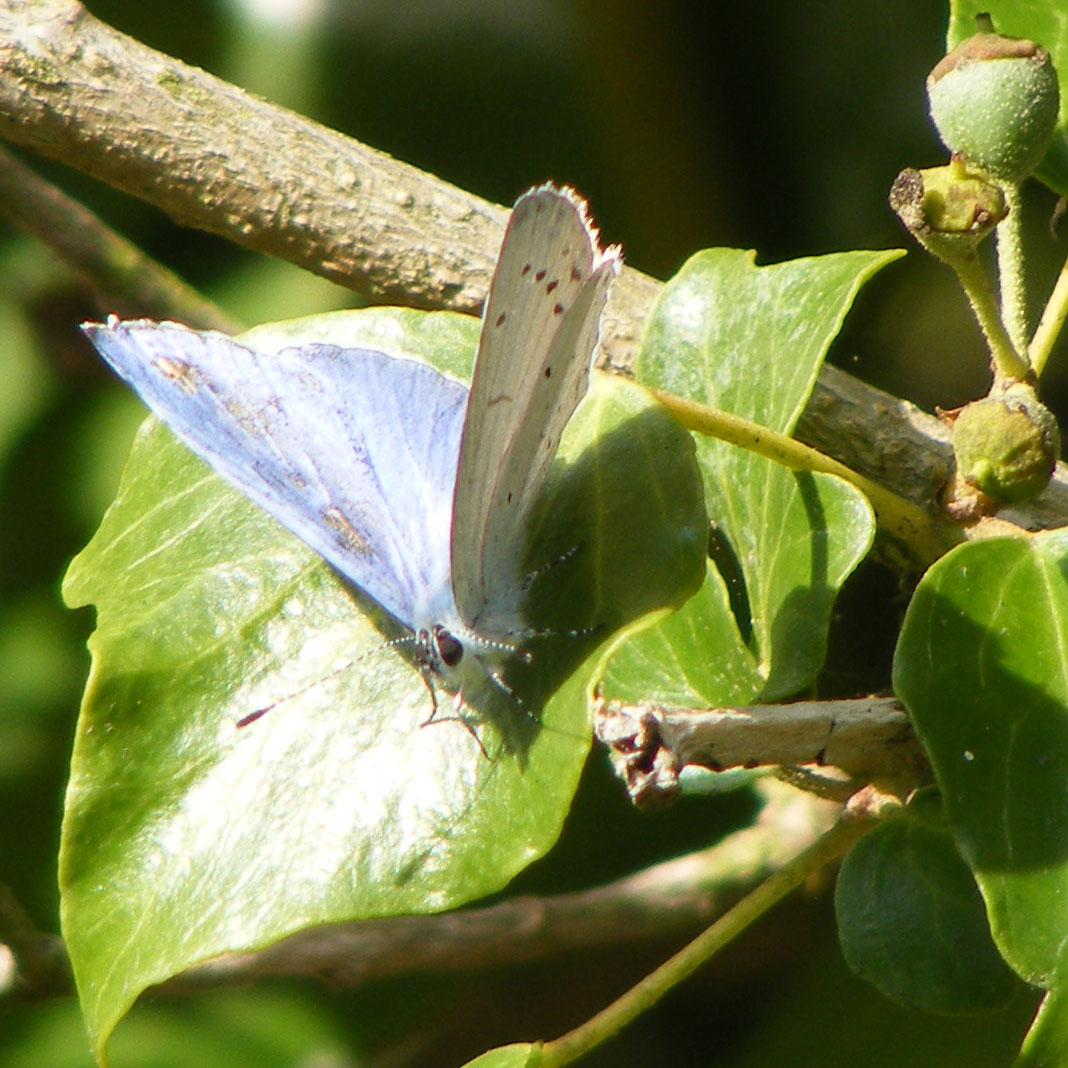
|
|
The
iridescence was quickly noticeable when the Adonis
Blue was first spotted
|
The
Adonis
Blue repeatedly returned to the Stemless
Thistle
|
The
Holly
Blue had distinctive markings and would
not settle for a second
|
The
Waterworks
Road added a Red
Admiral and a Small
White. The Coastal-Downs Link Cyclepath
in the early afternoon, after the sun had disappeared behind the clouds,
produced just the one Painted Lady
on Ivy. There were three Red Admirals
in Shoreham town, the last butterfly of the day rising high into a Fir
tree in St. Mary de Haura Churchyard in the fading
light of approaching dusk..
Seven
species plus the variant
25
October 2009
A
Holly
Blue Butterfly
fluttering
around the Holly and Ivy in the Butterfly Copse next to the
Waterworks
Road surprised me. As I attempted to get
a photograph before the numerous Common Wasps
disturbed the butterfly a Speckled Wood
appeared.
Three Red Admirals
were seen in Shoreham town and a Small
White along the towpath to Cuckoo's Corner.
The Red Admiral
in West Street, Shoreham, was the last of the day in the early afternoon.
Four
species
23
October 2009
With
the first mushrooms
after the rain and an autumnal feel under a cloudy sky, I was already looking
for the last butterfly
of the year, and one was not found until the very last Ivy bush next to
the Pixie Path bordering on Mill
Hill Road before the bridge over the A27.
It was a good condition Red Admiral.
21
October 2009
No
butterflies
were seen in Old Shoreham on a cloudy day, but there was a Vapourer
Moth fluttering at low level over the
towpath just north of the Toll Bridge.
18
October 2009
Just
after midday on
a sunny but cool day under a blue sky of cumulus
clouds, two male Common Blues
fluttered between the small Hawkbits that
decorated the northern part of the lower slopes of Mill
Hill. It was a passage trip and I only stayed for long enough to discover
that the Devil's Bits Scabious was
no longer in flower and I could not
even find the remnants of the last flowering clump. The first Clouded
Yellow flew by. On the verges of the path
as it entered the Hawthorn
scrub a Speckled Wood
fluttered over the short grass, and above a Peacock
Butterfly glided over the Clematis covered
shrubbery. By the gate to Old Erringham, another Clouded
Yellow visited a Small
Scabious that had turned white and the third
one of the day fluttered over the unoccupied pasture. The middle slopes
and top meadows and plateau were devoid of butterflies
until I cycled down trip on the Pixie Path
and disturbed a Red Admiral.
In
Shoreham town I examined the Ivy in the twitten
between Ropetackle and Victoria Road and found it covered in Drone Flies
(a hoverfly) and no butterflies seen
in the first two minutes and I only spotted a good condition Painted
Lady resting on an Ivy leaf at the last
moment. Over the central town area I added a Red
Admiral and later a Large
White Butterfly over residential Shoreham.
Seven
species
16
October 2009
I
had a quick walk around Mill Hill at lunchtime
and I saw three Clouded Yellows,
one Painted Lady,
one Red Admiral
and several Small Coppers
that were all were flying purposefully and did not land.
A
Speckled
Wood fluttered in the churchyard of St.
Mary de Haura in central New Shoreham. A Large
White was seen over Shoreham town.
15
October 2009
Three
Large
Whites, a Peacock
Butterfly and a Vapourer
Moth seen in Windlesham Road, fluttered
over Shoreham town. A Red
Admiral fluttered over the mud flats at
Old Shoreham, with another one along the towpath to Cuckoo's Corner with
the first Clouded Yellow
of the day, a Small White
and a Large White.
Butterflies
were few and far between in the afternoon with two Speckled
Woods and another Red
Admiral seen on the bridlepath to Lancing
Ring from the Sussex Pad. In the main
part of the Nature Reserve I spotted a Clouded
Yellow flying over the fringes of the dewpond,
and just the Red Admiral
flying over the unshorn meadows.
Six
butterfly species
14
October 2009
Butterflies
seen over Old Shoreham on a cloudy afternoon
were one Clouded Yellow and
four Red Admirals
all
seen near the River Adur
at low tide.
13
October 2009
Butterflies
seen over Southwick and Shoreham in the morning
were one Clouded Yellow,
three Large Whites and
two each of Speckled Woods,
Painted
Ladies and Small
Whites. The Clouded
Yellow was seen flying across the western
approach to Southwick Square and the two Speckled
Woods were courting over a Yew
sapling in St. Julian's Churchyard, Kingston Buci.
12
October 2009
Life
for the declining number of butterflies
was beginning to becoming more difficult. The Ivy was still an attractant
but everywhere the bushes were dominated by swarms of wasps,
bees and flies with the occasional
bumblebee
and the butterflies if they were able to find a perch it was an even chance
that it would be right at the top of the bush. Predatory dragonflies
were frequently seen, mostly Common Darters,
but also at least one Southern Hawker
which I have seen prey on large butterflies (in previous years). A few
Garden
Orb Spiders,
Araneus diadematus,
cast
their webs amongst the Ivy and Garden Privet hedges. On Mill
Hill, nectar plants were few and far between, and for this reason the
numbers of each butterfly were problematical and it may have been the same
butterfly seen on two occasions and the excluding of these is reflected
in the lower number count than actual sightings.
 |
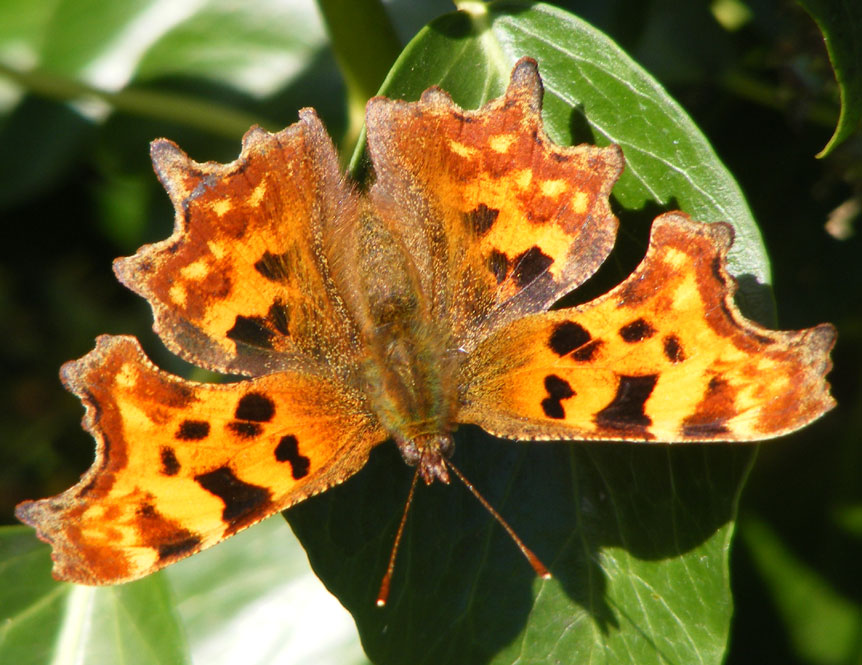
|
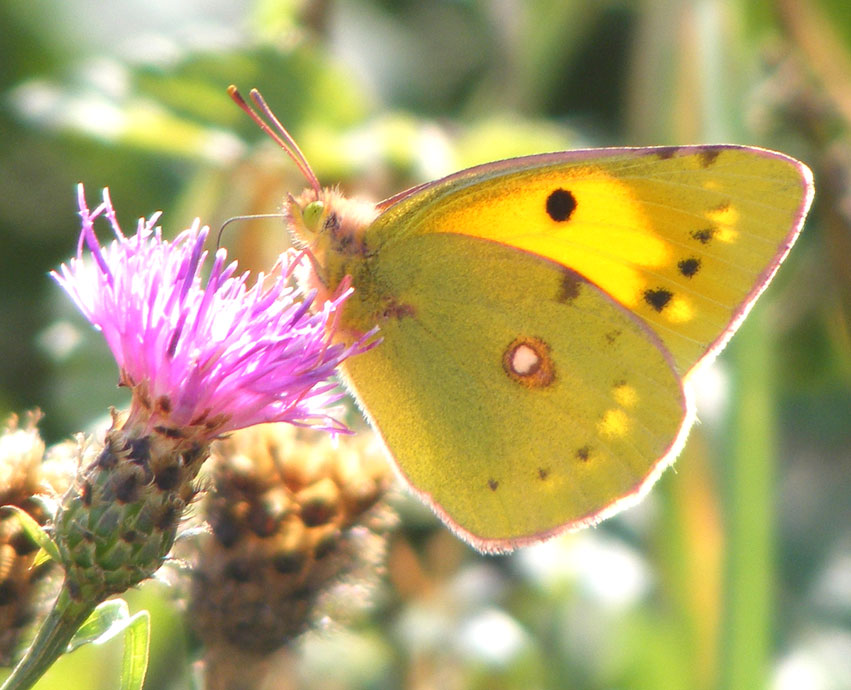 |
|
Painted
Lady
|
Comma
|
Clouded
Yellow
|
The
first butterfly seen was a Comma
amongst the Ivy on the Pixie Path in the late
morning before the sun had shined. The first Clouded
Yellow of the day flew over the northern
part of Frampton's Field and the same one may have been seen at the southern
end an hour later. On the lower slopes of Mill Hill, the half dozen male
Common
Blues visited the small Hawkbits,
and quarrelled with the Brown
Argus
and
Small Copper Butterflies over a single
clump of Devil's Bits Scabious. On
the top meadow of Mill Hill, a Clouded Yellow
or two visited a few remaining flowering
Greater Knapweed, Hardhead and the flowers
of Creeping Thistle.
Just the two Meadow
Browns;
they were not seen until I was about to leave Mill Hill. The Ivy and Buddleia
on the railway embankment next to the twitten
between Ropetackle and Victoria Road in Shoreham town
hosted three Painted Ladies,
five Red Admirals,
three Large Whites
and a Comma.
| Small White |
Dolphin
Road in Shoreham 1 (the last butterfly seen in the afternoon) |
| Large White |
Shoreham
Town 4 Waterworks Road 1 Pixie Path 1 = 6 |
| Red
Admiral |
Shoreham
Town 6 Downs Link Cyclepath 3 Pixie Path 2 Mill Hill
2 or 3 New Erringham Pasture 1 = 14 or 15 |
| Painted
Lady |
Shoreham
Town 3 Downs Link Cyclepath 1 Pixie Path 5
= 9 |
| Clouded
Yellow |
Pixie
Path 1 or 2 Mill Hill 2 or 4 Old Erringham Pasture
1 New Erringham Pasture 1 = 5 to 8 |
| Speckled
Wood |
Pixie
Path 3 Mill Hill 2 = 5 |
| Meadow
Brown |
Mill
Hill 2 (south of the Reservoir on my return) |
| Common
Blue |
Mill
Hill 6+ (males on the lower slopes) |
| Brown
Argus |
Mill
Hill lower 1 or 2 |
| Wall
Brown |
Mill
Hill upper 1 |
| Small
Copper |
Mill
Hill 1 or 2 (lower slopes) |
| Comma |
Shoreham
Town 1 Pixie Path 2 = 3 |
Red
Admirals were the only butterfly that were
numbered in double figures with 14 or 15.
Twelve
species
11
October 2009
On
a cloudy day with spots of rain the only butterfly
seen was a Painted Lady
in Ham Road, Shoreham.
10
October 2009
A
quick walk with the dogs this morning up to the top of Mill
Hill around 10:00 am,
I spotted five Painted Ladies,
one Comma,
one Common Blue,
one Red Admiral,
one Specked Wood,
and two Clouded Yellows.
8
October 2009
I
was curious to discover how much the inclement weather of the last four
days and the rain deluge of the previous day had affected the butterfly
populations and if I would see any at all. As
I opened my gate in Corbyn Crescent, Shoreham, an unexpected Clouded
Yellow Butterfly flew past, skirting the
Garden
Privet
hedges. A promising start was followed by the first of occasional
Large Whites seen in the early afternoon,
about 15 minutes later by a Red Admiral
flying high over Old Shoreham Road, north of the the Swiss Gardens. And
then a few minutes after that, the first of three Clouded
Yellows and another Red
Admiral flying over the Sea
Purslane and mud flats at low tide
on the River Adur
south of the Toll Bridge. Over the
Pixie
Path, five more
Clouded Yellows were
seen quite quickly with two courting over some Creeping
Thistles in Frampton's Field. The Ivy attracted
swarms of wasps, bees and flies
and just a few butterflies including two out of four Red
Admirals and a Peacock
Butterfly. At the top of the Pixie Path
the lazy flight of a Small White Butterfly
enabled it to be easily identified.
 |
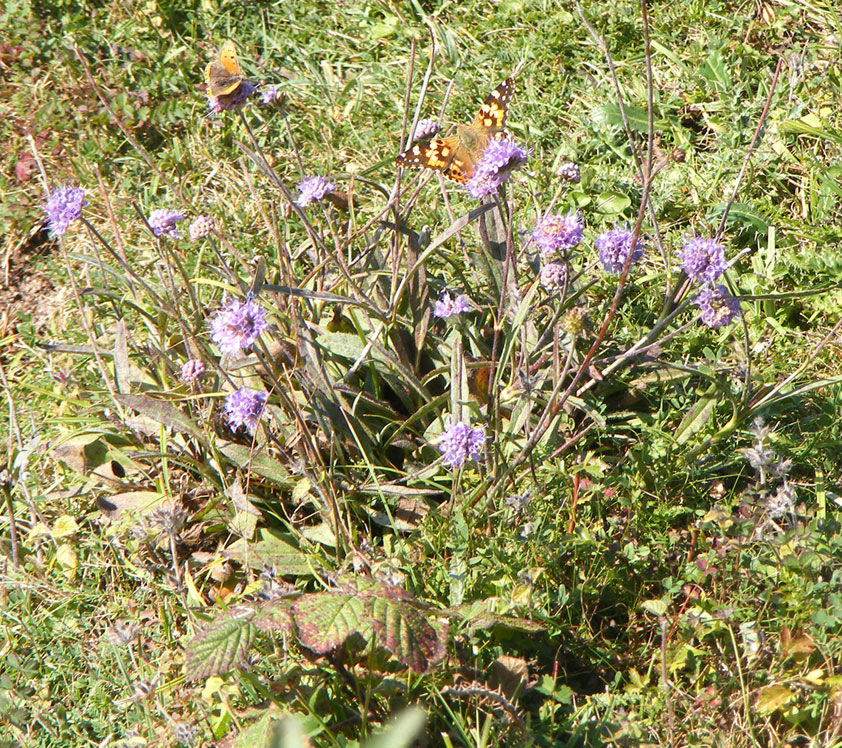
|

|
|
Painted
Lady
|
Devil's
Bit Scabious
|
Small
Copper
|
By
the time I had reached Mill Hill, the weak
sun was beginning to shine out of a blue sky, with the first Speckled
Wood and another Red
Admiral seen on the steps leading down to
the lower slopes from the south. A Silver
Y Moth was quickly seen followed by the
first of 13 more Clouded Yellows.
I ambled down to the northern end of the lower slopes without seeing anything
apart from the first of just three Meadow
Browns.
I sat down by a small patch of Devil's Bit
Scabious and waited for the butterflies to
come to me. From this vantage point the first Painted
Lady of the day settled followed by three
Common
Blues,
two males and a pretty bluish female, two old but intact Small
Coppers and two positive views of Brown
Argus
Butterflies.
Another Clouded Yellow
was the first one seen to settle this year, but only for a couple of seconds
on the Devil's Bit Scabious.
Two further Clouded Yellows
were seen over Old Erringham pasture from the gate. The Ivy in the north-west
of Mill Hill Nature Reserve again attracted
swarms of wasps, but also two Peacock Butterflies,
three Red Admirals
and a Painted Lady.
The Hawthorn scrub area added three further Speckled
Woods. The top meadows were devoid of butterflies
but the breeze-swept open grassy areas added two more Clouded
Yellows and a Wall
Brown fluttered past and was seen clearly
just north of the Reservoir.
On
the Downs-Coastal Link Cyclepath in Old Shoreham
(south of the Toll Bridge) a single patch of still flowering Buddleia
attracted two Painted Ladies,
a Peacock, a
Large
White and a transient passing Holly
Blue Butterfly. The Holly
Blue was a surprise third brood butterfly.
Shoreham town added another
Red Admiral
and a Large White.
Thirteen
species including two not seen before this month
3 October
2009
Returning
(from the last car boot sale of the year in a field on the Adur
Levels west of Mill Hill) along the Downs-Coastal Link Cyclepath from
the Old Erringham layby to Shoreham, I noted at least two Comma
Butterflies, frequent Speckled
Woods, and at least one each of a Painted
Lady,
Small White, Red
Admiral, Vapourer
Moth, and in Shoreham town
a Large White Butterfly.
Six
butterfly species
2
October 2009
As
the sun was still shining, I thought I would make a detour through the
outskirts of Old Shoreham where two Clouded
Yellows graced the towpath just north
of the Toll Bridge. Over the Pixie
Path and the top of Chanctonbury Drive in the vicinity of the Ivy,
Red
Admirals (20+) and
Painted
Ladies (12+) were both frequently seen,
with one Comma,
one surprise Peacock,
one Speckled Wood
and a handful of Large Whites.
Under the blue sky I could not resist the temptation for a quick cycle
ride up to the upper car park on Mill Hill,
where there were about fifty Common Darter
dragonflies
over the tarmac path next to the meadow to the north but very few butterflies
seen in a ten minute foray with just two Wall
Browns, a Clouded
Yellow and a male Common
Blue. The small brown moths seen over
the hedgerows and for the last few days were thought to be Vapourer
Moths, Orgyia antiqua.
Adur
Moths
Nine
butterfly species

|

|

|
|
Comma
Butterfly
|
Painted
Lady
|
Red
Admiral
|
|
Meadow
Brown
|
Speckled
Wood
|
Red
Admiral
|
Common
Blue
|
|
Clouded
Yellow
|
Comma
|
Wall
Brown
|
Small
Heath
|
|
Painted
Lady
|
Large White
|
Small White
|
Peacock
|
|
Small
Copper
|
|
|
|

Thirteen
species of butterfly seen in the first two days of October
2009
1
October 2009
A
pleasant (17.3 °C)
beginning to October with
a Light Breeze (Force 2) blowing form the NNW (N veering to NW) brought
butterflies
out to visit the few remaining nectar flowers. The Ivy on the Pixie
Path and
Mill Hill attracted the Red
Admirals (2+2), Painted
Ladies (3+0) and Meadow
Browns
(0+3).
How
Painted Butterflies Navigate
(BBC Web Site)
| Small White |
Mill
Hill lower slopes 2 |
| Large White |
Occasional
over urban Shoreham, outskirts and Mill Hill 3 |
| Red
Admiral |
Pixie
Path 2 Mill Hill 5 |
| Painted
Lady |
Pixie
Path 3 Mill Hill 1 |
| Clouded
Yellow |
Mill
Hill 3 |
| Speckled
Wood |
Mill
Hill 2 |
| Meadow
Brown |
Mill
Hill 13 |
| Common
Blue |
Mill
Hill 8 (including two females) (lower 4 upper meadow 4) |
| Small
Heath |
Mill
Hill lower 1 |
| Wall
Brown |
Mill
Hill upper 2 |
| Small
Copper |
Mill
Hill 1 (lower slopes) |
| Comma |
Pixie
Path 1 Mill Hill 1 |
Twelve
species
28
September 2009
A
Painted
Lady Butterfly flew into some still flowering
Buddleia
next to the Eastern Avenue railway crossing gates in Shoreham.
27
September 2009
I
visited Mill Hill in the afternoon on a
sunny day (on the route from the Waterworks Road and along the Pixie
Path), visiting the lower slopes and returning by the second ridge
route. Butterflies were widespread and scattered,
the only congregations were 19 Meadow
Browns,
five Common
Blues, three
Small
Heaths and a Wall
Brown at the northern end of the lower
slopes of Mill Hill, and a mixture on the Ivy in the north-west of Mill
Hill Nature Reserve (to the south of the gate to Old Erringham pastures)
of two Red Admirals,
two Meadow
Browns,
one Painted Lady,
a Speckled Wood
and a Large White.
| Small White |
At
least one on the Downs Link Cyclepath in Old Shoreham |
| Large White |
Occasional
over urban Shoreham, outskirts and the downs |
| Red
Admiral |
Old
Shoreham 3 Pixie Path 1 Mill Hill 3 |
| Painted
Lady |
Old
Shoreham 1 Pixie Path 7 Mill Hill 1 |
| Clouded
Yellow |
Pixie
Path 1 Mill Hill 2 |
| Speckled
Wood |
Old
Shoreham 3 Mill Hill 4+ |
| Meadow
Brown |
Mill
Hill 27 |
| Common
Blue |
Mill
Hill 5 (including one female) |
| Small
Heath |
Mill
Hill lower slopes 1 |
| Wall
Brown |
Mill
Hill upper meadow 2 |
| Small
Copper |
Mill
Hill (above the ridge) 1 |
Eleven
species
25
September 2009
Large
White Butterflies were frequently seen
everywhere. A
Red
Admiral and a Painted
Lady were seen over the Ivy on the western
verge of the cyclepath south of the
Toll
Bridge. On a cycle ride along the towpath to Upper Beeding added a
Comma
Butterfly and a Speckled
Wood over the cyclepath part. The vast
grass downland expanses of Anchor Bottom
were almost devoid of butterflies although
a Red Admiral
flew high overhead further up the slope, and a Large
White was seen in the distance. The south
facing Horseshoe Vetch field is the most promising area, but it was a few
minutes before a Meadow
Brown
Butterfly
fluttered
in a lopping lackadaisical manner before briefly (a second or two) landing
on a Devil's Bit Scabious
(which was my first report of this plant on this site) and then Sow
Thistle.
As I followed it, a the bright yellow of a Clouded
Yellow Butterfly distracted my attention.
The return by the Downs-Coastal Link Cyclepath
to Old Shoreham added a few more Speckled
Woods and to my surprise a definite Wall
Brown on the path verges about about 100
metres north of the Toll Bridge.
Eight
species
24
September 2009
Five
Clouded
Yellow Butterflies were seen on another
nearly warm (>18.9 °C)
day, all in the first 30 minutes and although the butterflies settled very
briefly (> 5 seconds) on yellow flowers, notably Dandelions
in Gordon Avenue, Shoreham, their stay was much too brief for a clear photograph.
The second one was seen fluttering across the eastern end of nearby Rosslyn
Road. The other three (possibly five) were seen on the west side of the
cyclepath by Widewater Lagoon and
mostly chose Ragwort
to visit. Other butterflies seen on the beach
route were frequent Large White
and frequent Small White Butterflies,
at least one Red Admiral
over Lancing. Only Large Whites flew over a mown McIntyre's Field, north-east
Lancing, with occasional Speckled Woods
by the trees and on the bridlepath at the top of the field. Next to the
ploughed field north of Cuckoo's Corner, the orange vanessid was probably
a Painted Lady
(the habitat did not seem right for a Comma).
Six
species
23
September 2009
A
few Large White Butterflies
were seen on my travels on an overcast afternoon with one Painted
Lady Butterfly and about twenty Speckled
Woods on a cycle ride up the Downs-Coastal
Link Cyclepath from Old Shoreham halfway to Upper Beeding and a return
by the towpath.
Three
species
21
September 2009
I
had a quick walk around the top part of Mill
Hill at lunch time and saw two Wall
Browns, a pristine Small
Copper and a Common Blue.
In
contrast to the previous day, it was the Small
White and Green-veined
White Butterflies that were frequently
seen along the cyclepath from Weald Dyke, Shoreham
Beach, going eastwards towards Lancing Beach Green where a Clouded
Yellow Butterfly fluttered northwards
across the mown grass. Large White Butterflies
were only occasionally seen. On a hurried passage route along the cyclepath
south of the Toll Bridge, another
Clouded
Yellow was conspicuous.
Four
species (personal tally)
20
September 2009
On
an energy sapping humid morning, both hoverflies
and butterflies were active around one large
clump of Ivy on the Pixie Path (near the NW
corner of Frampton's Field) and it was a flash of orange I saw first which
I thought was a Comma,
but it turned out to be one of five pristine Painted
Ladies and a Red
Admiral seen immediately followed by a
Comma
Butterfly seen in less than a minute and
another duller Comma
spotted about three minutes after the initial sighting. Two Large
White Butterflies were spotted over Frampton's
Field and this butterfly was frequently seen in widespread places on the
downs, outskirts and over Shoreham streets
and allotments. Almost all of these were the larger species, but at least
two Small Whites
were also noted on passage.

|

|

|
|
Painted
Lady
|
Small
Copper
|
Red
Admiral
|
A Meadow
Brown
Butterfly
visited
a Hardhead next
to the southern steps down to the lower slopes of Mill
Hill. But it was a few minutes before the next butterfly, one of two
Small
Heath Butterflies over my one acre transect,
three Large Whites,
two Meadow Browns,
three male Adonis Blues,
and just as I was about to leave the lower slopes, a sparring Clouded
Yellow and Small
Copper Butterfly. The Hawthorn scrub area
added three Speckled Woods,
two more Painted Ladies
and at least one more Meadow Brown.
The middle slopes mixed scrub and open spaces hosted two good condition
Wall
Brown Butterflies. The upper meadows of
Mill Hill again seemed almost devoid of visible butterflies with only a
Red
Admiral spotted. South of the Reservoir
there was a Large White Butterfly
and in amongst the dying herbs a
Silver
Y Moth fluttered about.
The
Butterfly Copse hosted two Speckled Woods,
and the Waterworks Road
a further two and a Large White.
Twelve
butterfly species.
18
September 2009
A
Red
Admiral was seen over Shoreham streets
and white butterflies
over the allotments.
14
September 2009
A
Clouded
Yellow Butterfly was spotted on the shingle
between the beach huts at the eastern end of Lancing Beach Green and a
Red
Admiral at the western end. Over the town
and allotments frequent white butterflies
were spotted, both Large Whites
and Small Whites.
Four
species
10
September 2009
This
brightly coloured caterpillar was spotted crawling across the tarmaced
approach to Tarmount Public Hard
in Shoreham. It is the larva
of the Sycamore Moth Acronicta
aceris. The moth varies in colour
from pale grey to dark sooty-grey. The caterpillar
feeds
on the leaves of Sycamore or Horse Chestnut.
What's
this Caterpillar? |
 |
9
September 2009
An
anticipated decline in butterflies was noted:
the Pixie Path recorded six Speckled
Woods, two Red
Admirals and a Holly
Blue. The one acre transect on the lower
slopes of Mill Hill produced ten Adonis
Blues
(seven
males and three females), seven Meadow
Browns,
three Small Heaths,
one female Common Blue
and a Treble-bar Moth. The
Hawthorn scrub on Mill Hill added at least eight Speckled
Woods and four Meadow
Browns
plus
two more in the clearing on the middle slopes known as the Triangle, where
three male Common Blues were
also seen.
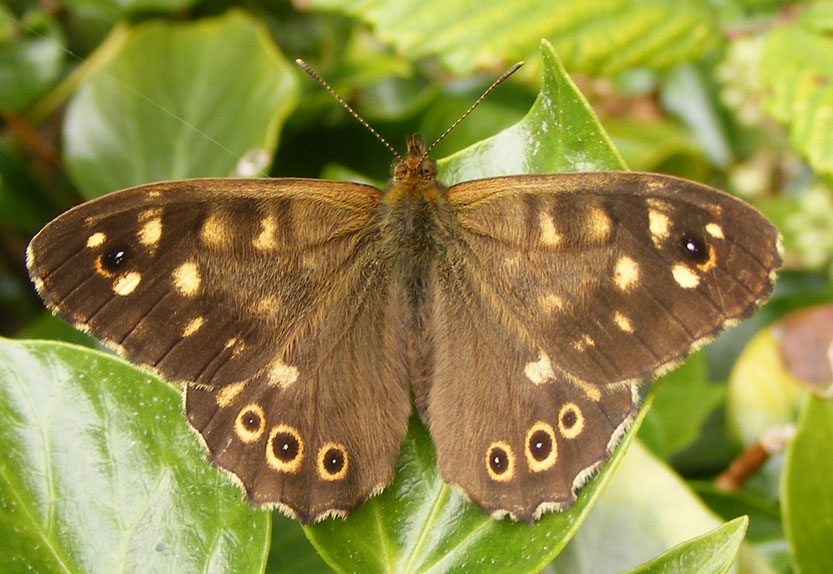
|
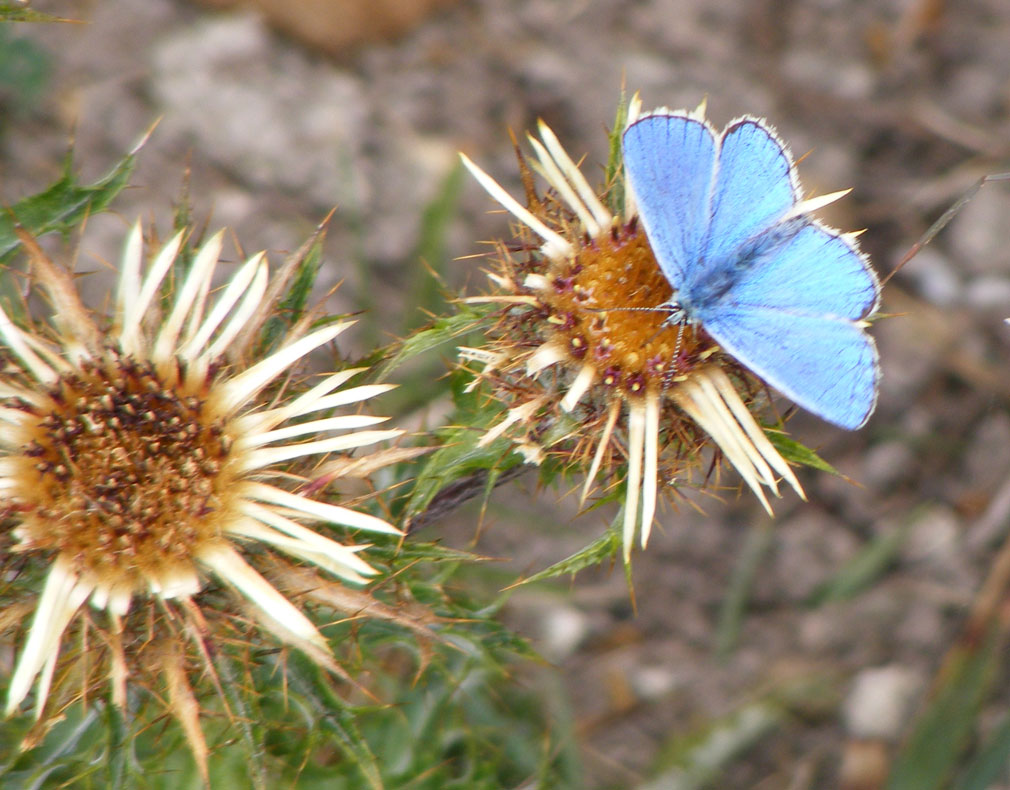 |
 |
|
Speckled
Wood
|
Adonis
Blue
|
Holly
Blue
|
The
top meadows and plateau were almost devoid of butterflies with just the
one Speckled Wood
in the shelter of a Hawthorn bush and a few Silver
Y Moths and a Treble-bar
Moth in the meadow north of the upper car
park. In Shoreham town and outskirts there were frequent
Large
Whites, occasional Small
Whites and another Red
Admiral.
NB:
Holly
Blues have been very few and far between this
year. The only time one opened up his wings, I was disturbed by a passer-by.
Nine
butterfly species
8 September
2009
On
a warm day with a midday air temperature at 20.8
°C, a Comma
Butterfly fluttered across Buckingham
Park with a Speckled Wood Butterfly
under the trees at the top and a few more at the top of The Drive, Shoreham-by-Sea.
A Silver Y Moth
but no butterflies was seen on the verges
of Buckingham Cutting south. Frequent
Large White Butterflies were seen flying
over the allotments and gardens in Shoreham town.
Four
species
6
September 2009
A
Red
Admiral Butterfly rested on a white wall
in West Street, Shoreham. A long
aching
walk to Mill Hill was rewarded by frequent
butterflies
on the lower slopes, under fifty were seen. Adonis
Blues
were
first to make an appearance with nine males and four females seen, two
Large
Whites and a reduction in the numbers
of Meadow
Browns
with
an estimated only about fifteen all at the northern end of the lower slopes,
where I noted one Small Heath Butterfly
and a Common Blue.
I returned by the ridge route and added three Speckled
Woods from the Hawthorn tunnel. Amongst
the Ivy on the verges of the cyclepath south of the Toll
Bridge in Old Shoreham, the hoverflies
and bees would not give the butterflies any
rest and three pristine Red Admirals
and three faded Painted Ladies
were disturbed.
Eight
species
5 September
2009
Great
Butterfly Hunt (Independent) Article
3 September
2009
On
another overcast rainy day, just the two butterflies
were seen; a Comma Butterfly
nearly underneath the A27
Flyover on the western bank of the river
where a patch of Fleabane
and Ragwort were
still in flower*,
and a Small White
on the cyclepath south of the Toll
Bridge in Old Shoreham. (*The
bicycle broke down here and I proceeded no further.)
2 September
2009
After
the deluge and on a cool cloudy breezy day, I visited Mill
Hill to check out whether any Gatekeepers
were still around. I must have looked at over fifty Meadow
Browns
but
even the brown and orange butterflies in the hedgerows were Meadow
Browns.
They were divided about equally between male and females. On the lower
slopes of Mill Hill, there were at least 21 Adonis
Blues
(16
males and five females), a slightly greater number of Common
Blues
of
both genders, 40+ Meadow Browns,
one Speckled Wood and
three Small Heath Butterflies.
It
is was very difficult to put the brown females to species and there may
have been up to a dozen
Adonis Blue
females and some of these could even have been Chalkhill
Blues. Some of the male Adonis
Blues were very tatty and there could have
others identified as Common Blues.
I returned by the ridge route and another 20+ Meadow
Browns and three more Small
Heath Butterflies were spotted. On the Devil's
Bit Scabious on the lower slopes of Mill Hill,
a very large grey butterfly was tilted over in a peculiar way. These butterflies
have been seen in most years on the exposed ridge flying off so rapidly
as to elude positive identification. I have always dismissed them as Meadow
Browns. There is a possibility that this was
a Grayling Butterfly
which has not been recorded on Mill Hill since 1968.
On a second look I think it was a Meadow Brown.
In
Shoreham town there were Large
Whites, Small
Whites and one Speckled
Wood.
Grayling
in Sussex
Seven
definite species
30
August 2009
After
several days of inclement weather I noted a Red
Admiral Butterfly visiting Buddleia
in the twitten between Corbyn Crecent
and Adelaide Square in Shoreham town. Large
White Butterflies were frequently
seen courting.
29
August 2009
I
returned to Steyning Rifle Range
expecting to observe a downward trend in Brown
Hairstreak numbers, but got a rather nice
surprise! There was also a visit of a Purple
Emperor. We saw a total of nine female
Brown
Hairstreaks, along with the 'usual suspects'
including Wall
and Clouded Yellow.
There had clearly been a 'second wave' of emergence, as all nine of the
Brown
Hairstreaks were in better condition than
the brown I saw during my last visit on 21
August 2009. Some were very fresh and probably
only a day or two old.
25
August 2009
 On
a breezy day, the lower slopes of Mill Hill
were sheltered compared to the exposed plateau. Meadow
Browns
were
the most prevalent butterfly with about fifty
seen on the lower slopes and something like the same number again on passage
over the top meadows and scrub. The most notable sightings were the large
number of female Adonis
Blues on the lower slopes only. Out of
38
Adonis
Blues,
21 were males and 17 were the brown
females and for most of the time the female count outnumbered the bright
blue males. This count of females is the highest
ever on the lower slopes. There was a possibility that a few, four at most,
were female Chalkhill Blues. On the lower
slopes there were four male Chalkhill Blues,
two Common Blues,
two Wall Browns,
a Large White or
two, at least one Small Heath,
one Speckled
Wood, at least one Gatekeeper
and
a strong flying Clouded Yellow.
There were frequent small pyralid
moths
and a few Shaded Broad-bar Moths,
Scotopteryx
chenopodiata. Both Speckled Woods
and Meadow
Browns
were
frequent in the Hawthorn scrub with two more Wall
Browns recorded. In contrast the top meadows
hosted Common
Blues
of
both genders in lesser numbers than previously but well over fifty actually
seen under an overcast sky. All the potential
Brown
Argus
turned out to be female Common Blues.
Blown
about on the top of the hill there was just one Painted
Lady and one Small
Heath seen and occasional Small
Whites. There was a Holly
Blue around the Ivy on the southern part
of the Pixie Path.
On
a breezy day, the lower slopes of Mill Hill
were sheltered compared to the exposed plateau. Meadow
Browns
were
the most prevalent butterfly with about fifty
seen on the lower slopes and something like the same number again on passage
over the top meadows and scrub. The most notable sightings were the large
number of female Adonis
Blues on the lower slopes only. Out of
38
Adonis
Blues,
21 were males and 17 were the brown
females and for most of the time the female count outnumbered the bright
blue males. This count of females is the highest
ever on the lower slopes. There was a possibility that a few, four at most,
were female Chalkhill Blues. On the lower
slopes there were four male Chalkhill Blues,
two Common Blues,
two Wall Browns,
a Large White or
two, at least one Small Heath,
one Speckled
Wood, at least one Gatekeeper
and
a strong flying Clouded Yellow.
There were frequent small pyralid
moths
and a few Shaded Broad-bar Moths,
Scotopteryx
chenopodiata. Both Speckled Woods
and Meadow
Browns
were
frequent in the Hawthorn scrub with two more Wall
Browns recorded. In contrast the top meadows
hosted Common
Blues
of
both genders in lesser numbers than previously but well over fifty actually
seen under an overcast sky. All the potential
Brown
Argus
turned out to be female Common Blues.
Blown
about on the top of the hill there was just one Painted
Lady and one Small
Heath seen and occasional Small
Whites. There was a Holly
Blue around the Ivy on the southern part
of the Pixie Path.
Thirteen
species
24
August 2009
On
a passage cycle ride through Lancing and Old Shoreham, Large
Whites were frequent everywhere, with
occasional Small Whites and
Painted
Ladies, and at least one Holly
Blue, Green-veined White,
Red Admiral and Comma
Butterfly. The
Comma
Butterfly fluttered amongst the Stinging Nettles
along the footpath section of the
Waterworks
Road.
Seven
species
23
August 2009
In
the afternoon (3:00 pm)
of the second day of the Shoreham Air Show, the sun was still out and the
butterflies
noted as I negotiated the crowds in Old Shoreham and on the Pixie
Path were all the usual ones: Large
Whites, Small Whites, Common
Blues, Meadow
Browns,
Painted
Ladies, Chalkhill Blues (Mill
Hill Cutting SW), Holly Blues, Speckled
Woods, two Red
Admirals (not seen since the 17
August 2009), but no Gatekeepers
were observed.
Nine
species
Anchor
Bottom (TQ 210 0930)
Two
Clouded
Yellows,
Large
Whites and Small
Whites,
Brown
Argus,
Adonis
Blues, Common Blues,
Small
Heaths,
Speckled
Wood,
Meadow
Browns,
and a glimpse of a possible Wall Brown.
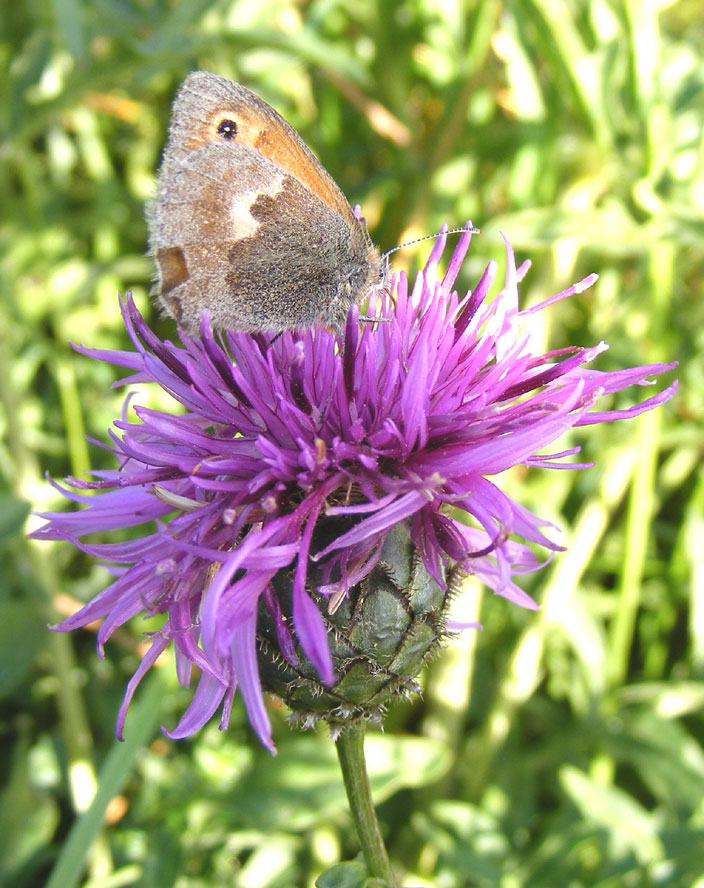
22
August 2009
In
the late afternoon (3:30 pm)
of Shoreham Air Show, the sun was still out and a smattering of butterflies
on the lower slopes of Mill Hill where
I recorded 28 male Adonis Blues,
36 mixed gender Common
Blues,
just one male Chalkhill
Blue plus two brown females which could
have been either Adonis or
Chalkhill
Blue.
Meadow
Browns
were
by far the most frequent butterfly on show, estimated at 75+ including
30+ large females. The lower slopes also hosted a few Painted
Ladies, (now declining in numbers and
condition), nine Small Heath Butterflies,
two Wall Browns,
a Large White or
two, and a smattering of the small pyralid moths.
A Clouded Yellow Butterfly
fluttered past without stopping and there altogether four sightings of
at least three separate butterflies. I returned by the shortest ridge route
where I saw at least one Speckled Wood
in the Hawthorn tunnel, three female Gatekeepers
(when none were seen around the hedges on the lower slopes) and one Green-veined
White as well as some more Meadow
Browns.
A brief sortie through the meadow and picnickers and some more Common
Blues
and
Meadow
Browns
were
disturbed and a flash of orange which I thought could have been a late
skipper
but it was another Small Heath.
It fluttered from Hardhead
to Ragwort. I
arrived via the Pixie Path where a few Small
Whites were identified with the more numerous
Large
Whites,
Meadow
Browns
in
Frampton's Field, and a Holly Blue
by the hedge at the top. Passing Mill Hill Cutting, I noted a male Chalkhill
Blue from the Pixie Path.
Thirteen
species
21
August 2009
Much
too breezy for butterflies, but I needed
some fresh air so I visited the upper part of Mill
Hill where I saw most of the expected butterflies: scores of Common
Blues,
frequent
Large Whites,
Meadow
Browns,
Painted
Ladies and Speckled
Woods, occasional Small
Whites and Silver
Y Moths, at least one Brown
Argus
and
one male Adonis Blue.
The
Mill
Hill Cutting added three of each sex
Chalkhill
Blues,
the females both courting the attention of the good condition males as
well as crawling through the Horseshoe Vetch to discharge their eggs. Holly
Blues were occasionally to be spotted
amongst the Ivy on the Pixie Path. A Gatekeeper
was
not spotted.
Only
ten butterfly species
19
August 2009
As
the sun was out I could not resist another visit to Mill
Hill to see if I could capture the Brown
Hairstreak on my camera. Alas, as was usually
the case a brief search was unsuccessful. I only visited the upper part
of Mill Hill where Common Blues
were frequently seen everywhere, with an estimated twenty Meadow
Browns,
frequent
Painted
Ladies, six Wall
Browns, two Adonis
Blues, a few Speckled
Woods, just the one definite Gatekeeper,
one
Small
Heath and one smallish skipper
that looked and behaved like an Essex Skipper.
Female
Chalkhill Blues
The
route to Mill Hill went through the Mill Hill Cutting
(SW) where there were a dozen Chalkhill
Blues,
including four females, all seen at the same time. The four female Chalkhill
Blues were rather worn and ragged, but at
least two of them crawled in amongst the prostrate leaves of Horseshoe
Vetch, Hippocrepis
comosa. A Green-veined
White landed on a Bramble leaf and I thought
that the triangular shape of the wings was most pronounced and this would
help with the practical difficulties in identifying the white butterflies.
There were three Wall Browns
and two Holly Blues
on the northern stretch of the Pixie Path with Meadow
Browns
and
Common
Blues
in Frampton's Field. In Shoreham town
both Large Whites
and Small Whites
were frequently seen with occasional
Painted
Ladies,
Speckled
Woods and Holly
Blues.
Thirteen
species
On
a brief visit to Mill Hill where there was up to three Clouded
Yellows and also a second brood Dingy
Skipper as well as plenty of Adonis
Blue.
18
August 2009
Steyning
Rifle Range was still producing the goods
and getting quite busy! No less than six different female Brown
Hairstreaks down low, differentiated on
the basis of wear and tear (although one was fresh and scale-perfect).
Some appeared several times during their wanderings around the site. I
watched quite a lot of egg-laying today and I reckon they are just about
at peak. I was surprised at how readily they flew over several 100 metres
of open ground to get to new stands of Prunus (they prefer to lay on bullace
here), rather than hugging the hedge-lines.
The
Brown
Hairstreak spends most of its time around
the tops of tall mature trees (Oak and Ash) where mating takes place, and
so tends not to be seen, except for the female when she comes down to lay
her eggs on fairly low Blackthorn bushes.
Comments
from the Birdguides CD-ROM on British Butterflies
17
August 2009
I
was shocked by the sighting of a Brown
Hairstreak Butterfly*
on Mill Hill south of the upper car park.
It flew off rapidly and was lost to my sight in about 20 seconds, so this
was my first ever glimpse of this hedgerow
butterfly
that lays its eggs on Blackthorn (Sloe). I caught a brief sighting with
its wings closed (I was trying to identify if it was a Gatekeeper
or Meadow Brown.)
and it was not until I got home that I identified the species. It was about
the size of a Gatekeeper
and larger than the Green Hairstreak. This
has increased the total species seen in Shoreham and all on Mill Hill to
33.
*Later
doubts have crept in about the identification of this butterfly. I did
not get a good enough look to be 100% certain.
Sighting
and Photograph in 2010
Other
species of butterfly seen on the day on Mill Hill and its approaches and
the Downs-Coastal Link Cyclepath from Old Shoreham
to Upper Beeding (by the Cement Works), were 54 Adonis
Blues,
an estimated 75+ Painted Ladies,
an estimated 100+ Common Blues,
an estimated 80+ Meadow
Browns
(including
frequent females), frequent
Gatekeepers, 13 Chalkhill
Blues, frequent Speckled
Woods, frequent Large
Whites, frequent Small
Whites,
occasional
Wall Browns, occasional Brown
Argus
Butterflies,
occasional Green-veined Whites,
occasional Small Heath Butterflies,
occasional Holly Blues,
one
Small Tortoiseshell,
one Red Admiral,
two Comma
Butterflies and one Peacock
Butterfly*. Larger moths
noted included a few Shaded Broad-bar Moths,
occasional Silver Y Moths,
at least one Carpet Moth,
one Brimstone Moth and
occasional Treble-bar Moths.
(*The
sudden disappearance of most of the Peacock
Butterflies was probably because of early
hibernation.)
Full
List by Location
Adur
Butterflies: First Dates
Eighteen
or Nineteen butterfly species
Notes:
The
Brown
Hairstreak Butterfly you saw at Mill Hill
may well have come as a surprise to you, but I very much doubt that it
was either a 'vagrant' or has been introduced. Brown
Hairstreak is our most elusive species 'by
a country mile' and many sites are known solely from egg surveys. The eggs
are much easier to see than the adults. Steyning is throwing them up with
impressive regularity (once you know where to look and when), but until
I discovered eggs here in January 2008
the colony was unknown. Similarly, it was only when I discovered eggs on
Cissbury
Ring (January
2007) that Brown
Hairstreak was added to the species list for
the site - despite being transect-walked for decades and visited by butterfly-watchers
on a very regular basis. They can be living on 'your patch', undetected,
for donkey's years! Now you know they're there and will be watching out
specifically for them, you will start to see more - but great patience
is required!
After
escaping from work, I trundled up to Mill Hill above the delightful A27
for some total escapism. The delights this evening on offer were a single
Clouded
Yellow, a single Gatekeeper,
two Wall Brown,
two Painted Lady,
several Common Blue,
Chalkhill
Blue, Adonis Blue,
Small
Heath and Meadow
Browns.
Far fewer than earlier on in the day, but it was near the butterflies bedtime!
 16
August 2009
16
August 2009
On
a breezy overcast day, an appointment meant the cycle ride was a passage
one through Buckingham Cutting (south) where
occasional Large Whites
and Small Whites,
a Holly Blue
and a few Common Blues
and at least one Silver Y Moth
were noted. Down to the Mill Hill Cutting (SW) where more Common
Blues, one Chalkhill
Blue, a Painted
Lady and a Speckled
Wood were seen. The Pixie Path route was
then due south to the Waterworks Road
noting another Painted Lady
more Common Blues
of both sexes and a few Speckled Woods
with more Large Whites.
On the cyclepath in Old Shoreham south to Ropetackle, there were more Common
Blues and a Brimstone
Moth.
Seven
butterfly species
13
August 2009
A
cycle ride was originally just going to the Old Fort on Shoreham
Beach and back but it extended along the towpath past the houseboats,
across Adur Recreation Ground and along the towpath adjacent to the Airport
and over the Toll Bridge up the Pixie
Path to the top and a detour to Buckingham Cutting south.
5014.jpg)
|

|
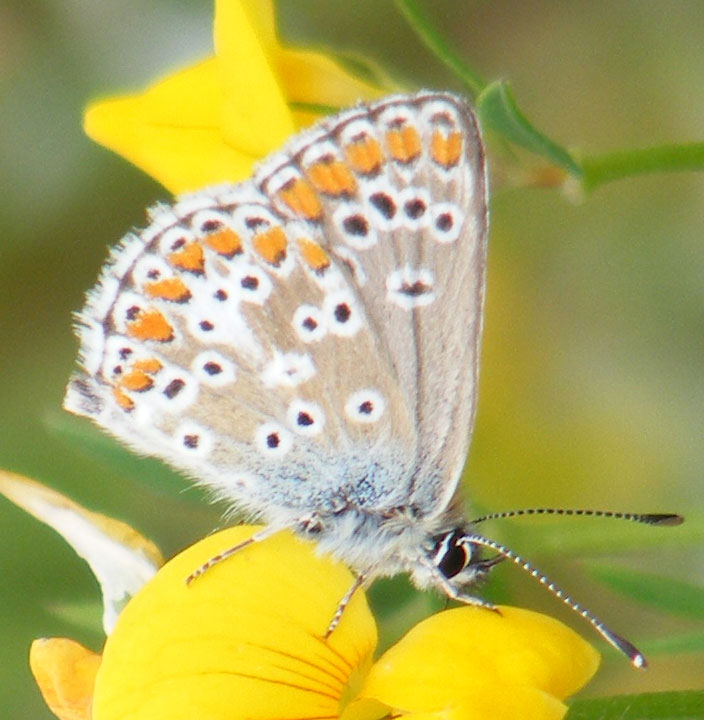
|
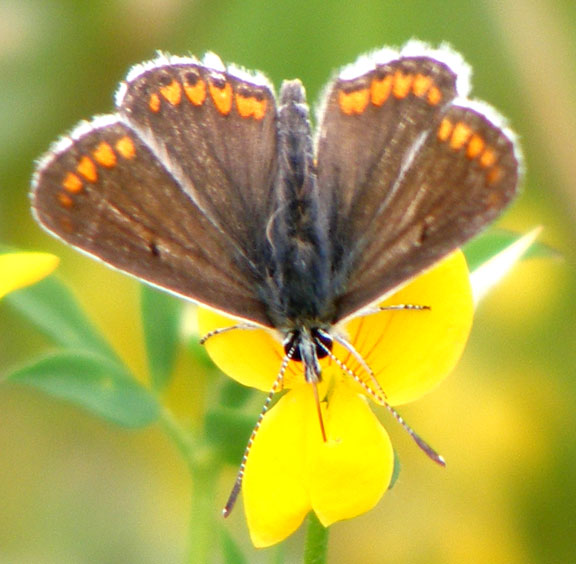
|
|
Common
Blue
|
Common
Blue
(female)
|
Brown
Argus
|
Brown
Argus
|
 The
following butterflies were seen on route:
frequent
Large Whites, Small Whites,
Painted
Ladies, and Common
Blues,
occasional
Green-veined Whites,
Speckled
Woods,
Gatekeepers
and Meadow
Browns,
three Wall Browns,
three fresh Comma Butterflies,
two Red Admirals,
one Small Tortoiseshell,
five Chalkhill Blues
(including
one female at the Mill Hill Cutting south-west), two Holly
Blues, and a confirmed Brown
Argus
and a Small Blue
(both at Buckingham Cutting). Many of the
female Common Blues
are entirely brown on the upper wings with orange spots and no trace of
blue colour.
The
following butterflies were seen on route:
frequent
Large Whites, Small Whites,
Painted
Ladies, and Common
Blues,
occasional
Green-veined Whites,
Speckled
Woods,
Gatekeepers
and Meadow
Browns,
three Wall Browns,
three fresh Comma Butterflies,
two Red Admirals,
one Small Tortoiseshell,
five Chalkhill Blues
(including
one female at the Mill Hill Cutting south-west), two Holly
Blues, and a confirmed Brown
Argus
and a Small Blue
(both at Buckingham Cutting). Many of the
female Common Blues
are entirely brown on the upper wings with orange spots and no trace of
blue colour.
Brown
Argus Identification Notes
Seventeen
species of butterfly (including three not seen the previous day)
12
August 2009
On
an overcast afternoon, I decided to cycle along the Downs-Coastal
Link Cyclepath from Old Shoreham to Annington
Sewer (north of Botolphs). I had no plans
to count the butterflies, only to note the
species. The inevitable Painted Ladies
were frequently seen everywhere, less frequent were Large
Whites, Small
Whites and in the shady areas Speckled
Woods and a few Green-veined
Whites. Gatekeepers
were occasionally seen, many less than a week previously, with two Red
Admirals, two Small
Tortoiseshell and Peacock
Butterfly noted along the cyclepath. Despite
the unpromising breeze, I explored Anchor Bottom
from Dacre Gardens where Meadow
Browns
35+
were frequently disturbed on my trek to the main Horseshoe Vetch slopes
and back. An estimated twenty Common
Blues
(including one female) were mainly amongst the floristically poor longer
grass on the southern slope and were only seen when disturbed so the actual
numbers were much larger. Two Small Heath
Butterflies were seen at the foot of the
Horseshoe Vetch as usual, where after about ten minutes when I had given
up all hope of any blue butterflies,
a bright blue Adonis Blue
was spotted amongst a few flowers near
the Stinging Nettle patch followed by a male Chalkhill
Blue and another one of each. On the return
trip across the foot of the southern slopes of Anchor Bottom I spotted
a Wall Brown,
a Small (or Essex) Skipper and
another Small Heath.
Later in the afternoon, I went blackberrying and almost the only butterfly
on the path running along the south of Frampton's Field, Old Shoreham,
was a Holly Blue over
the hedgerow. For a second, I thought I saw a Clouded
Yellow, but it was a Brimstone
Moth.
Seventeen
species of butterfly
11
August 2009
A
Red
Admiral was seen on the southern path
of Frampton's Field, Old Shoreham, a species not seen the previous
day. In the same general area I counted five Holly
Blues in the hedgerow together. The trip
was a brief one to pick some apples, and the Slonk
Hill south route in the afternoon was not very productive: the species
were frequent Large Whites, Small Whites
and Painted Ladies
in town and country, Speckled Woods
in the linear wood, frequent Common Blues
and a few Meadow
Browns
in
the verge meadows. On Mill Hill Cutting south-west, the Chalkhill
Blue count was ten including one female
and the plant they stayed on longest for nectar was Carline
Thistle, but they made fleeting visits whilst
I was watching to Autumn Gentian,
Bird's-foot
Trefoil and Eyebright.
Nine
species
10
August 2009
Painted
Lady Butterflies were everywhere in town
and country with over fifty an hour seen. Both Large
Whites and Small
Whites were frequently seen as well.
| Meadow
Browns
were frequently seen on the lower slopes of Mill
Hill including mating pairs. |
 |
Lower
Slopes of Mill Hill
Just
a little too overcast and breezy for butterflies
to be out, but there were just 13 Chalkhill
Blues
(including two females) and 41 Adonis
Blues
(including a female, although it was possible that this was a Chalkhill
Blue) with an estimated ten Common
Blues
in flight on the lower slopes of
Mill
Hill. Meadow
Browns
were frequently seen including mating pairs. The lower slopes also recorded
occasional Painted Ladies,
occasional Gatekeepers,
two
Wall Browns,
at least one Small Heath Butterfly,
one Speckled Wood,
at least one Treble-bar Moth, one Shaded
Broad-bar Moth and frequent pyralid
micro-moths of both Pyrausta
purpuralis and
Pyrausta
nigrata. There was a Cinnabar
Moth caterpillar on
a small Ragwort.
Only later when examining the photographs, I discovered I had seen a very
faded Dingy Skipper
that looked like a moth.
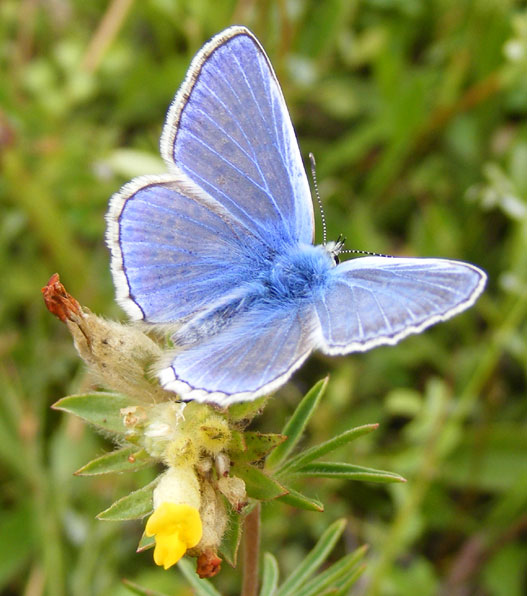
|

|

|
|
Common
Blue
|
Adonis
Blue
|
Chalkhill
Blue
|
Upper
Meadows of Mill Hill
There
must have in excess of 200 Common
Blues
of both sexes in the long herb meadows at the top of Mill Hill, but even
this is a fraction of what can be seen of this butterfly in peak years
when the numbers runs into thousands. There were a few Brown
Argus
as well but it is difficult to be sure how many when there were scores
of female Common Blues.
One
Small (or Essex) Skipper was
noted on the southern part of the hill. Painted
Ladies were frequently seen almost everywhere
but before it began to rain I did not spot any Peacock
Butterflies. A Green-veined
White Butterfly was identified amongst
the scrub.
Approaches
to Mill Hill:
Pixie
Path and Frampton's Field
Common
Blues were conspicuous in the north-west
corner of Frampton's Field with a few Meadow
Browns.
By the hedges there were two Holly Blues
and two Speckled Woods
as well as Small Whites and
the omnipresent Painted Ladies.
Mill
Hill Cutting (south-west)
After
a few minutes the Chalkhill Blues
appeared with nine spotted including a female with at least four Common
Blues.
Buckingham
Cutting (south)
Not
nearly as many as the previous day and it was a minute or two before the
occasional Common Blues
and at least three Small Blues
and Meadow
Browns
were
noticed.
Buckingham
Park
A
passage trip across Buckingham Park encountered a Gatekeeper.
The vegetation was regrowing under the trees at the top where a few Speckled
Woods were seen.
Seventeen
species of butterfly in an hour, excluding three or four common species
9
August 2009
Lower
Slopes of Mill Hill
The
lower slopes of Mill Hill were more crowded
with butterflies than the previous week but
the one acre transect still only recorded a meagre total of 35 Chalkhill
Blues
(including two females) with 30 Adonis
Blues
(including
one female*) and slightly less in number of Common
Blues
of both sexes. Meadow
Browns
were about the same in numbers with a handful of huge females, and I noted
at least one Gatekeeper
and I expect there were many more. At least three Small
Heath Butterflies showed and three or
more Large Whites
fluttered about and a bright yellow Brimstone
Butterfly emerged from the central Tor
Grass area on the lower slopes. The lower slopes also hosted the inevitable
Painted
Ladies, (just a few; there were many more
in Shoreham town), a Green-veined White
(there were two more of these on the Waterworks
Road), three Wall
Browns, at least one good condition Dingy
Skipper (i.e. not the tattered one seen
on 29 July
2009), at least three Treble-bar
Moths, a few Silver
Y Moths and frequent pyralid
moths with Pyrausta nigrata
noted. With time pressing, I retraced my route along the path and only
visited the southern part of Mill Hill where a Small
(or Essex) Skipper was spotted amongst
more Common Blues
and frequent Painted Ladies.
(*
It is not easy to separate female Chalkhill
Blues from the slightly larger Adonis
Blue females.)
Adur
Skippers

|
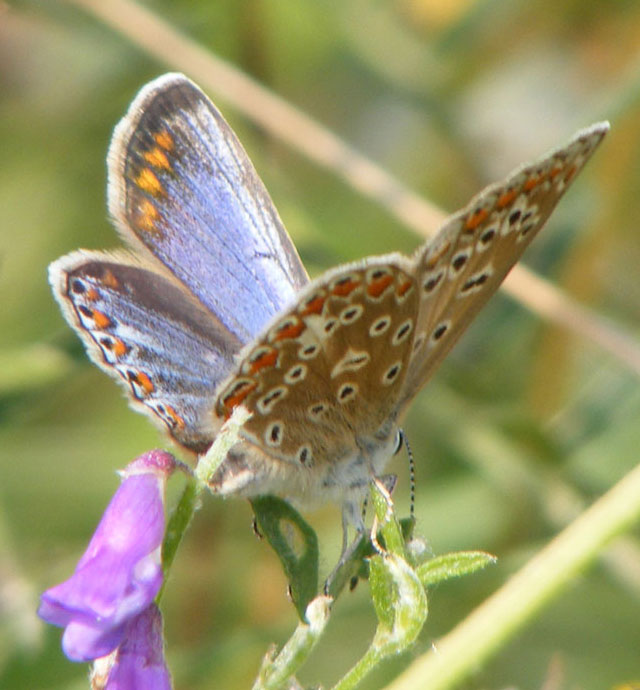
|

|
 |
|
Wall
Brown
|
Female
Common
Blue
|
Female
Chalkhill Blue
|
Female
Chalkhill Blue
|
Buckingham
Cutting (south)
This
small area of herbland was notable for 25+ Common
Blues
with
the blue males and both very small brown females and a few much larger
brown and blue females. It would be easy to mistake the smaller females
for Brown
Argus
Butterflies, but none of the latter were positively
identified. At least two Small Blues were
noted with frequent Meadow
Browns
and
a few Large Whites in
the verge meadows. Amongst the hedgerows and linear wood there were occasional
Gatekeepers
and
a few Speckled Woods.
Mill
Hill Cutting (SW) and the Pixie Path
About
ten Chalkhill Blues
were noted including two females on the Mill Hill Cutting (SW) with three
Treble-bar
Moths. On the Pixie
Path there were three
Wall Browns
and four Speckled Woods.
A Red
Admiral, Holly
Blue and a occasional Small
Whites were seen in Shoreham town.
Seventeen
butterfly species in an hour, excluding two common species
8 August
2009
The
usual gamut of butterflies were seen around
the outskirts of Shoreham including five Comma
Butterflies, not seen two
days previously, the first one the houseboats on the River
Adur and the second one at the western
end of the Toll Bridge, Old Shoreham.
Painted
Ladies were everywhere especially on Buddleia
and there were occasional Red Admirals.
Brown
Hairstreaks
Photographs
by Neil Hulme
I visited
Steyning
Rifle Range (map)
in warm sunshine, almost immediately seeing four male Brown
Hairstreaks flitting around the Master
Trees above the spring-fed ponds. After getting no more than a brief glimpse
of a female Brown Hairstreak heading
across the open fields, I was about to change venue when a second one appeared,
giving a small group of us superb views as she sat in the hedge-line for
a while, before heading off on an egg-laying run. I then moved on to Steyning
Round
Hill, where the very steep slope allowed head-height viewing of two
male Brown Hairstreaks
in the Master Tree above the quarry. My ninth of the day was a female,
again on a mission to lay eggs along the blackthorn scrub-line. The Wall
Brown is certainly having its best year
in Sussex for a very long time and I counted 22 here without searching
exhaustively. A female Clouded Yellow
provided a nice bonus.
7
August 2009
Strictly
a blackberrying
trip, but I did see a Red Admiral on
the south side of Frampton's Field, Old Shoreham, a species not seen the
previous
day.
 6
August 2009
6
August 2009
On
a humid sunny morning the Chalkhill Blue
Butterfly
count in a 15 minute transect on the lower slopes of Mill
Hill was a paltry 37 with just one pristine female
seen. There were frequent
Common
Blues
including males courting with very small females. The first male second
brood Adonis Blues*
were recognised when they settled, as in flight they could not separated
reliably from Common Blues.
There could have been up to a dozen of them. Four Clouded
Yellows were notable, with one on the
lower slopes and at least three on the upper slopes with a pair courting.
Small
Heaths* are back and at least two were
seen one on the lower slopes and another in the upper meadows. There were
at least four Wall Browns
on Mill Hill. Painted Ladies
were present everywhere with over a hundred seen in an hour as well as
frequent Gatekeepers,
Meadow
Browns,
Large
Whites, Speckled Woods and
Peacocks.
One
bright yellow Brimstone Butterfly
was seen in the meadow north of the upper car park where Common
Blues
were frequent including mating pairs. A faded Small
Skipper was spotted amongst the Greater
Knapweed south of the Reservoir. The
purpose of the visit to Mill Hill was to count the Chalkhill
Blues in flight and the visit was hurried.
In the Butterfly Copse near the Waterworks
Road, a Holly
Blue flew amongst the Buddleia.
On the Waterworks Road
itself, two Green-veined Whites
fluttered past. Small Whites
were seen over the allotments in Shoreham town.
Seventeen
butterfly species including four not seen the previous day and two* of
these not seen before this month
5
August 2009
I
spent a very enjoyable day with Guardian journalist
Patrick Barkham, who is touring the UK in an effort to see every species
of British butterfly, and whose experiences
along the way will provide the material for a book. With only three species
to go we had high hopes of bagging Brown Hairstreak,
Adonis
Blue and Silver-spotted
Skipper to complete the set. The sun refused
to show over Steyning, denying us the opportunity of seeing the first on
our list, but by heading a few miles east we managed the others without
difficulty, getting a few bonus species along the way. The highlights of
our tally of 26 species were 25+ pristine
Adonis
Blue (including a mating pair) and a second
brood Dingy Skipper
at Mill Hill, Shoreham (also Wall
Brown,
Chalkhill
Blue, Common Blue,
Small
Heath).
Wall
Brown Butterflies could turn up virtually
anywhere as one on the western towpath underneath the A27
Flyover indicated. Over the bridlepath from
the Sussex Pad to Hoe Cottages there were at least four more and another
one in the Chalk Pit on Lancing Ring
Nature Reserve. Painted Ladies
were present everywhere with over fifty seen in an hour. On the approaches
to Lancing Ring there were the expected few each of Speckled
Woods, Gatekeepers,
Common Blues, Large
Whites and one Red
Admiral. In the meadow at the top of McIntyre's
Field the first butterfly was a tattered Green-veined
White and both Common
Blues
and Meadow
Browns
were
frequently seen with one Brown
Argus
identified and more suspected although some turned out to be female Common
Blues.
A Brimstone Butterfly
and Yellow Shell Moth
were seen at the entrance to the eastern car park on Lancing Ring Nature
Reserve with frequent Speckled Woods under
the trees.

|
 |
|
|
Holly
Blue
|
Hemp
Agrimony
|
Mint
Moth, Pyrausta aurata
|
The
large meadows to the south-east of the main clump of trees was much more
overgrown than in previous years (because
of the rain) and the dense and varied grasses
and herbs hosted frequent Common Blues
but not nearly as many as seen in the best years when thousands were actually
seen. There were frequent Meadow Browns
and frequent Silver Y Moths
with a few Brown Argus
Butterflies and a few Large
Whites. Hemp
Agrimony bordering the hedgerow that can be
found along the south side of the main meadow is a nectar plant visited
by numerous butterflies, but there was not as many as previous years although
the small patch was visited by a few Peacock
Butterflies, the inevitable Painted
Ladies, a few Common
Blues and at least two each of Meadow
Brown,
and Gatekeeper
and a single Small Tortoiseshell.
Two
Clouded Yellow Butterflies
flew strongly over the short grass immediately to the east of the main
clump of trees. There was single Wall Brown
flying around near the dewpond.
A
visit to Ray
Hamblett's back garden in south Lancing, produced half a dozen Painted
Ladies, two Red
Admiral, a Common
Blue, a Speckled
Wood and on the washing stand a Comma
Butterfly repeatedly landed. In Shoreham
town
there was at least one Small White and
a Holly Blue Butterfly
landed amongst the Ivy in the twitten
between Ropetackle and Victoria Road.
Seventeen
butterfly species
 4
August 2009
4
August 2009
The
most notable observation of the day was a markedly-patterned Magpie
Moth amongst
the Stinging Nettles on the Waterworks Road,
Old Shoreham.
A
Wall
Brown Butterfly fluttered across Middle
Road, Shoreham through the wire fencing and into the trees in Middle Road
Open Space. Later on the afternoon there was another one on the towpath
of the
River Adur,
north of Cuckoo's Corner. elsewhere on the outskirts of Shoreham, I noted
frequent Common Blues,
occasional Gatekeepers,
a few Meadow
Browns,
occasional Large
Whites, a definite Green-veined
White and a few Small
Whites. And
of course, frequent Painted Ladies
that fluttered around almost anywhere. At least one Speckled
Wood was seen in the residential area
of Southwick during my travels.
Nine
butterfly species
3
August 2009
Mill
Hill
In
the sunshine at the peak period for Chalkhill
Blues, Mill
Hill registered a mere 46, 44 males and just the two females seen in
the one acre transect walk taking 15 minutes on the lower slopes. Again
they were concentrated at the northern end which means that the number
of the Chalkhill Blues
in flight on Mill Hill were probably around 150 which is a disastrously
low total. Chalkhill Blues
were not seen on the upper or middle part of Mill Hill, but there was one
in the Old Erringham pasture fluttering over from the scrub. Other butterflies
were exiguous too; Meadow
Browns
were
estimated at about 30 on the lower slopes, Common
Blues
at about 20, with a few Gatekeepers
and Large Whites.
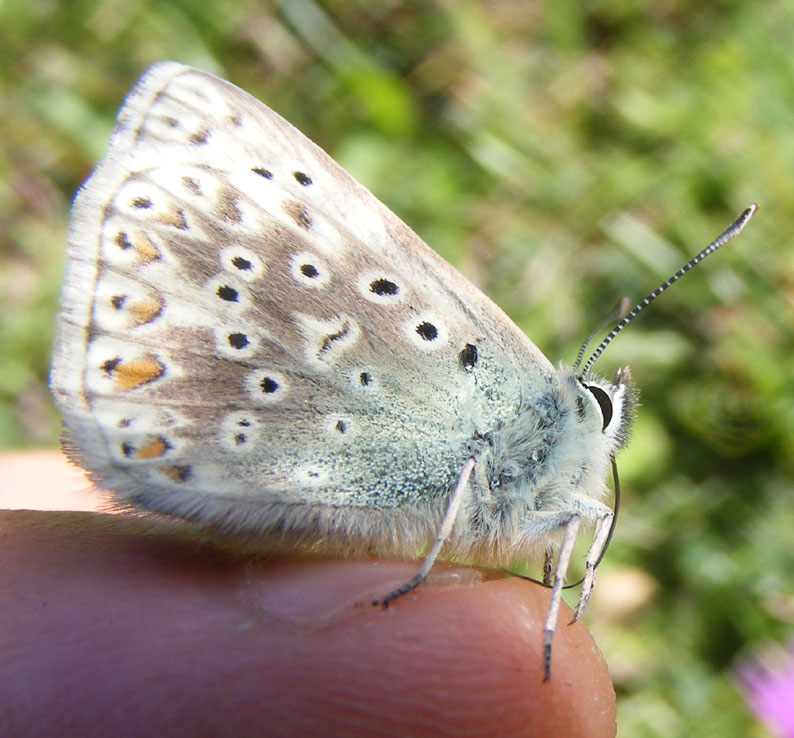
|

|
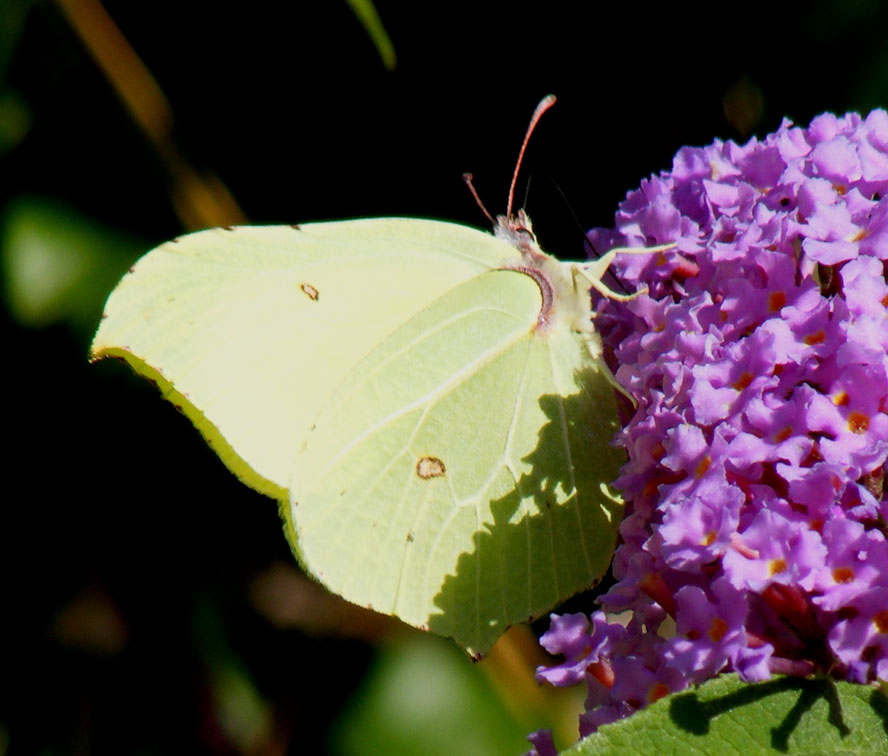
|
|
This
Chalkhill
Blue appeared to be ill or poisoned and
it could he handled. This has been seen before in previous years.
|
This
skipper
was thought to be a fresh
first of the year Essex Skipper
(but it could have been a Small Skipper).
|
Brimstone
Butterfly on Buddleia
on the Downs-Coastal
Link Cyclepath
|
There
were well over a hundred Common Blues
on
the meadows to the north of the northern car park on Mill Hill with frequent
Painted
Ladies all over the hill, about ten Peacock
Butterflies, a surprise Brimstone
Butterfly, and just two fresh first of
the year Essex Skippers
(but they could have been Small Skippers).
Female Common Blues
were frequent and it was only on the Triangle are of the middle slopes
where I was able to separate a few Brown
Argus
Butterflies. In the middle and scrub area
I noted frequent Gatekeepers,
just one Wall Brown,
occasional Speckled Woods,
a few identified Small Whites,
occasional Large Whites,
a Yellow Shell
and occasional Silver Y Moths and
Six-spotted
Burnet Moths.
A
Red
Admiral flew over the plateau. In the
hedge by Mill Hill Road (north of the bridge), I noticed a Comma
Butterfly as I cycled slowly past.
Adur
Butterflies: First Dates
Fifteen
butterfly species
Approaches
to Mill Hill
Buckingham
Cutting South
This
small area still hosted a few Small Blue
Butterflies, occasional
Common
Blues
of
both sexes, a few each of Meadow Browns,
Gatekeepers,
Speckled
Woods and Large
Whites.
Mill
Hill Cutting (south-west)
This
small area hosted even fewer Chalkhill
Blues than the end of July with just six
seen after a few minutes chased around with three Common
Blues, a Meadow
Brown,
Speckled
Wood,
Painted
Lady and a Treble-bar
Moth.
Pixie
Path and Frampton's Field
The
northern part was visited on the way to Mill Hill when a Painted
Lady, Peacock,
Large
White and a Silver
Y Moth were seen on the path with
occasional Meadow
Browns
in
the taller vegetation of Frampton's Field. On the return trip, I cycled
past spotting three male Common Blues
dancing around in F-rampton's Field with three Meadow
Browns.
On the section of the path running north-south a Small
Tortoiseshell flew out of the Stinging
Nettles.
Downs-Coastal
Link Cyclepath from Old Shoreham to Botolphs
I
cycled the route without stopping and picked out the noteworthy two Comma
Butterflies, a Green-veined
White, a definite Small
White as I checked the identifications,
a Brimstone
and two Red Admirals.
I made a detour to Anchor Bottom, but it
looked so bare that I just sat on the southern hill and had a rest. I was
pleased to see my first Small Copper
of the year settled in the grass briefly.
Shoreham
Town
A
Holly
Blue Butterfly fluttered amongst the Ivy
in the twitten between Ropetackle and
Victoria Road.
|
Large
White
|
Small
Blue
|
Meadow
Brown
|
Chalkhill
Blue
|
Red
Admiral
|
Common
Blue
|
|
Speckled
Wood
|
Green-veined
White
|
Brimstone
Butterfly
|
Comma
|
Wall
Brown
|
Holly
Blue
|
|
Gatekeeper
|
Essex
Skipper
|
Painted
Lady
|
Small
Tortoiseshell
|
Small White
|
Peacock
|
|
Small
Copper
|
Brown
Argus
|
Silver
Y Moth
|
Yellow
Shell Moth
|
Treble-bar
Moth
|
Six-spotted
Burnet Moth
|
Twenty
species of butterfly which is second highest day total recorded with four
of the larger moth species
2
August 2009
A
trek along the Bridlepath from Slonk Hill Farm to New Erringham under
a cloudy sky recorded 9+ Common Blues,
5+ Painted Ladies,
2
Wall Browns,
2
Large Whites,
8+ Gatekeepers,
2 Small Whites,
a Peacock
and a Red Admiral.
I
planned to visit the whole of Mill Hill,
but I only had time for the upper meadow which was alive with butterflies.
Over one hundred Common Blues were
seen amongst the tall herbs, with frequent Painted
Ladies, eight Wall
Browns, frequent Gatekeepers,
at least four and probably many more Brown
Argus
Butterflies, with at least one Large
White, frequent Peacocks
(including seven seen altogether on Greater
Knapweed), at least two Meadow
Browns
and a Red Admiral. A
few Six-spotted Burnet Moths were
seen before I had to curtail my visit.
On
the underside hind wing of the Brown Argus two of the spots line up to
form a colon.
Brown
Argus Identification Notes
Ten
butterfly species
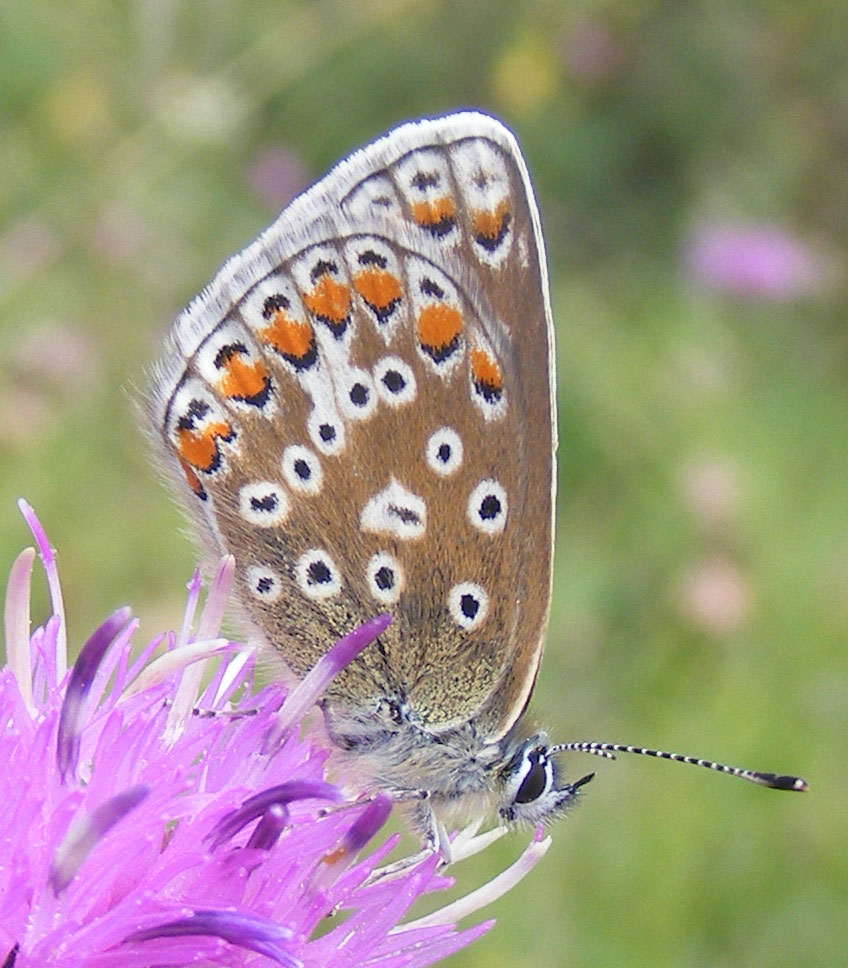 |

|

|
|
Common
Blue
|
Brown
Argus
|
Green-veined
White
|
1 August
2009
About
a dozen Green-veined White Butterflies
flew around the Stinging Nettles and White
Deadnettles etc on an earth bank at the north-east
corner of Adur Recreation Ground by the Railway
Viaduct. Two were about to mate when I disturbed them. This species
may have been seen in the previous few days but were not positively identified.
A Painted Lady
landed on a Stinging Nettle. Around the towpath adjacent to the Airport
there were frequent Common Blues,
at least one Gatekeeper
seen and a Large White
fluttered strongly before it began to rain after midday.
Five
species on passage only
31
July 2009
Mill
Hill
The
weak sun sun shone through the white cumulus
clouds in a bright blue sky on what should have been a peak day for
the Chalkhill Blue Butterflies,
but only 51 were counted in in the one acre transect on the lower slopes
of Mill Hill and one extra just out of
the transect area. Two females were noted and included in the above total.
The spread was uneven with concentrations below the winding path in the
central area and at the northern end and absent from the southern part
of the slopes.
Not all the Chalkhill Blues
were flying so I may have missed half of them. Many had to be disturbed.
I returned by the shortest ridge route so I omitted to visit the scrub
area, middle slopes or plateau of Mill Hill. Other butterflies
of note on the lower slopes was ironically a Speckled
Wood at the southern end amongst the invading
Privet, a fresh Wall Brown,
ten Common Blues
(including a much smaller female,
not a Brown
Argus
though),
five plus Gatekeepers,
seven plus Meadow
Browns,
a Peacock Butterfly and
at least one Silver Y Moth.
On
Mill Hill by the return ridge path above and down south of the Reservoir
were four more Wall Browns
(three on Field Scabious near
the northern gate to New Erringham pasture), one more male Chalkhill
Blue, nine more male Common
Blues, at least nine more Gatekeepers,
only two Meadow Browns
actually noted down, another Chalkhill Blue,
a Small White,
two courting Large Whites,
a Painted Lady
and another Silver Y Moth.
The Meadow Browns
had more females than males. A Six-spotted
Burnet Moth flew across the bridge over
the A27 and a Holly Blue
flew over the hedge at the top of the Pixie Path.
The
Chalkhill
Blue count was very poor as in a poor year
200 would be recorded in the transect acre and 750+ in a good year. This
would compute to 500 and 3000+ on Mill Hill as a day count.
Approaches
to Mill Hill
Buckingham
Cutting South
This
large garden-sized verge on the edge of the A27
carriageway is rich in meadow herbs and attracts
numerous butterflies and on a passage trip lasting about five minutes,
I listed a Small White,
at least ten Common Blues,
at least five Meadow
Browns,
just the two Small Blues and
the four Silver Y Moths
was certainly underecorded as they remain hidden unless disturbed.
I
also noted four Speckled Woods,
at least one Gatekeeper,
a Red Admiral
and two Peacock
Butterflies in the wooded area arriving
from The Drive in north Shoreham.
 Mill
Hill Cutting (south-west)
Mill
Hill Cutting (south-west)
This
is another slightly larger garden-sized verge plot carved out of chalk
with Cotoneaster and Horseshoe Vetch, Hippocrepis
comosa.. At first there were no butterflies to be seen, but after
about three minutes the first Chalkhill
Blue fluttered up from the Horseshoe Vetch
where the first mating pair of the year was seen. There were six males
and two females which was still an extremely low count at the peak period
when between 20 and 50+ would normally be expected. There were also two
Common
Blues, a Large
White, a few Gatekeepers
and
a Speckled Wood.
A Red Admiral
flew over my head.
Pixie
Path and Frampton's Field
This
path leads from the Mill Hill Cutting, south-west, to Mill Hill Road at
the top. No butterflies were seen at first on the northern stretch until
a
Meadow
Brown
showed
in the horse pasture field, followed by three Gatekeepers
and two Common Blues
in the partitioned field as I walked by bicycle past. A Wall
Brown settled on the path itself and there
was a Speckled Wood
at the top. A Small Tortoiseshell wasn't
a definite as it flew too quickly to be sure.
On
the return from Mill Hill, I cycled down
the route at much greater speed noting two Painted
Ladies on passage. In the Butterfly Copse
(leading to the Waterworks Road
which was not visited) there was just a Holly
Blue and on the southern section of the
path just a Speckled Wood
and a Gatekeeper.
Speckled
Woods were seen in Shoreham town with
a Painted Lady
that flew across Buckingham Park and Small
Whites seen on passage.
Thirteen
definite butterfly species and a possible
30
July 2009
An
inclement morning followed by heavy rain in the afternoon excluded butterfly
observations.
29
July 2009
Second
brood Wall Brown Butterflies
have emerged with the first one clearly seen on the breezy lower slopes
of Mill Hill and the second one was a surprise
sighting on the verge of the Coastal-Downs Link
Cyclepath between Upper Beeding and Old Shoreham as the first drops
of rain were felt. On Mill Hill, the Chalkhill
Blues count was even more disappointing
with only 30 seen when even in a poor year over a hundred would be expected.
A single worn second brood Dingy Skipper
was spotted at the extreme northern end of the lower slopes of Mill Hill.
It was nearly overlooked. Common Blues
were the most frequent butterfly on the brief visit
to Mill Hill.
| Species: |
Buckingham
Cutting
|
Pixie
Path & Butterfly Copse
|
Mill
Hill
Lower
Slopes
|
Mill
Hill
Middle
& Upper
|
TOTAL
|
| Chalkhill
Blue |
|
1 |
30+ |
1 |
32+ |
| Meadow
Brown |
Few |
Few |
1+ |
Few |
Frequent |
| Gatekeeper |
Occasional |
Few |
Frequent |
Few |
Frequent |
| Large
White |
|
|
1+ |
Few |
Frequent |
| Small
Blue |
Few |
|
|
|
Few |
| Painted
Lady |
|
Few |
1+ |
Frequent |
Frequent |
| Dingy
Skipper |
|
|
1 |
|
1 |
| Speckled
Wood |
Few |
Few |
|
3 |
Occasional |
| Red
Admiral |
|
|
1 |
1+ |
2+ |
| Peacock |
|
3 |
1 |
Occasional |
Frequent |
| Holly
Blue |
|
1 |
|
|
1 |
| Common
Blue |
Occasional
(incl. females) |
3+ |
Occasional
(incl. females) |
30+ |
Very Frequent |
| Small
White |
|
|
1+ |
2+ |
Occasional |
| Wall
Brown |
|
|
1 |
|
2 |
| MOTHS: |
|
|
|
|
|
| Silver
Y Moth |
|
|
|
Occasional |
Occasional |
| Six-spotted
Burnet Moth |
|
|
|
Frequent |
Frequent |
The
butterflies on the Coastal-Downs Link Cyclepath
were not counted, but as well as the Wall
Brown included Gatekeepers,
Meadow
Browns,
Large
Whites, Small Whites, a Red
Admiral,
Painted
Ladies and a few Peacocks.
Adur
Skippers
Fourteen
butterfly species
28
July 2009
On
the towpath adjacent to the Airport, there were
occasional Painted Ladies
and Gatekeepers and
at least two male Common
Blues, and
elsewhere in Shoreham there were both Large
Whites and Small
Whites and
Green-veined Whites. In the late afternoon
the path from the Butterfly Copse on the southern side of Frampton's Field,
Old Shoreham, to The Street, yielded a probable Holly
Blue Butterfly and a Red
Admiral sparring with a Painted
Lady.
Eight
species
27
July 2009
In
under three minutes on the path from the Butterfly Copse on the southern
side of Frampton's Field, Old Shoreham, to The Street, a Comma,
Small Tortoiseshell, Painted Lady, Gatekeeper, Meadow
Brown,
a Large White
and
two Speckled Woods appeared.
Seven
species
26
July 2009
Mill
Hill was continually found to be disappointing for butterflies
with just over fifty Chalkhill Blue
males being disturbed on the one acre transect, and a female spotted crawling
amongst the Horseshoe Vetch leaves. The
breezy cool conditions were far from ideal for butterflies.
It seems it is going to be another poor year for the blue butterflies.
One
bonus was my first Brown
Argus
of the year seen clearly on the upper Greater
Knapweed meadow south of the copse on the
top of Mill Hill Nature
Reserve. Female Common Blues
were also spotted and the Small Blues
were
still frequently seen, notably on the southern bank of Buckingham
Cutting.

|
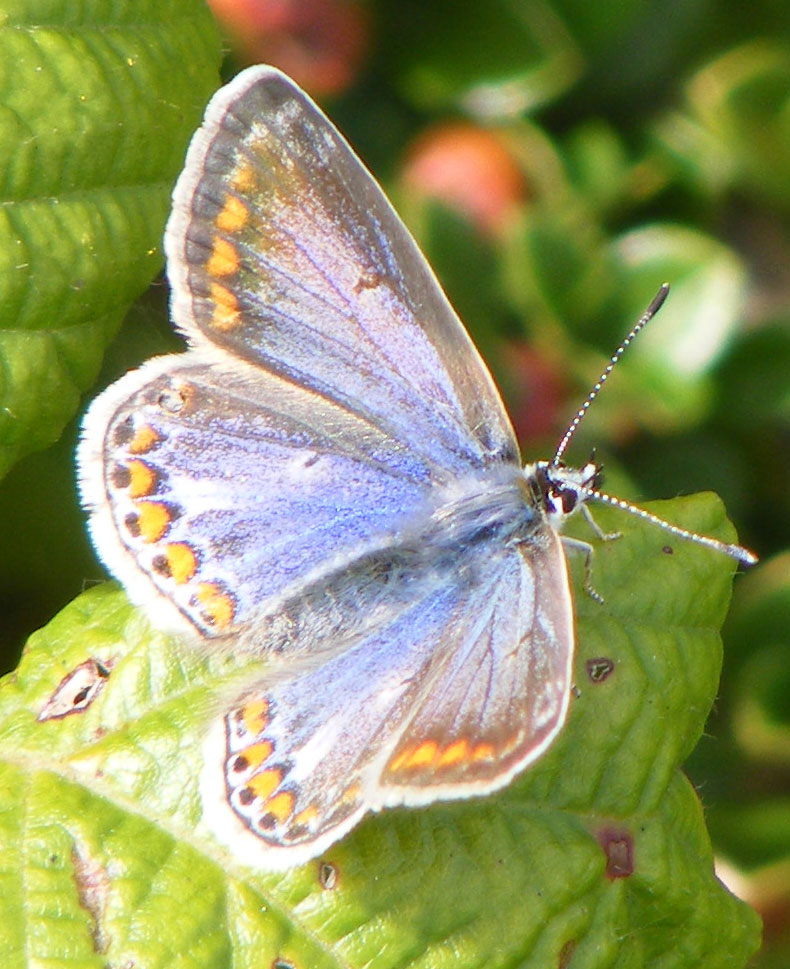
|
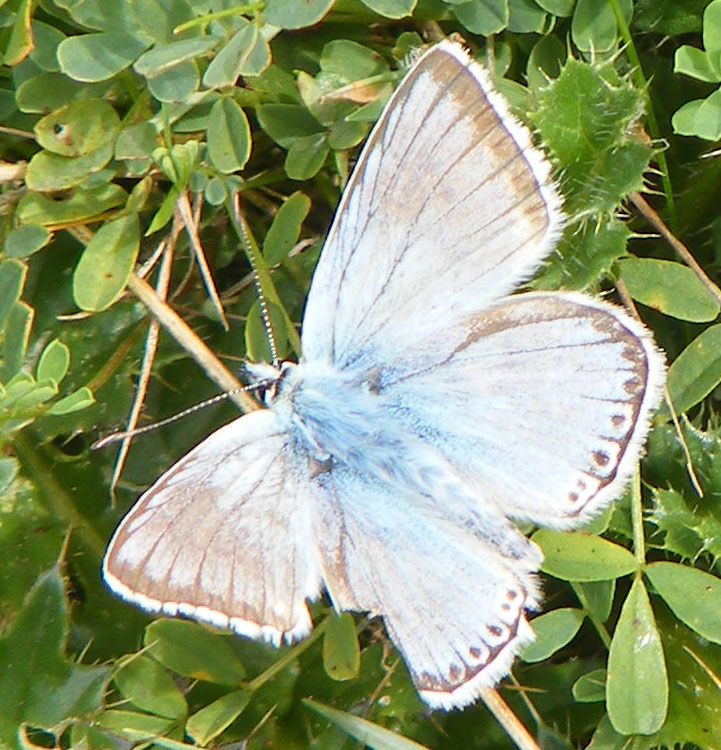
|
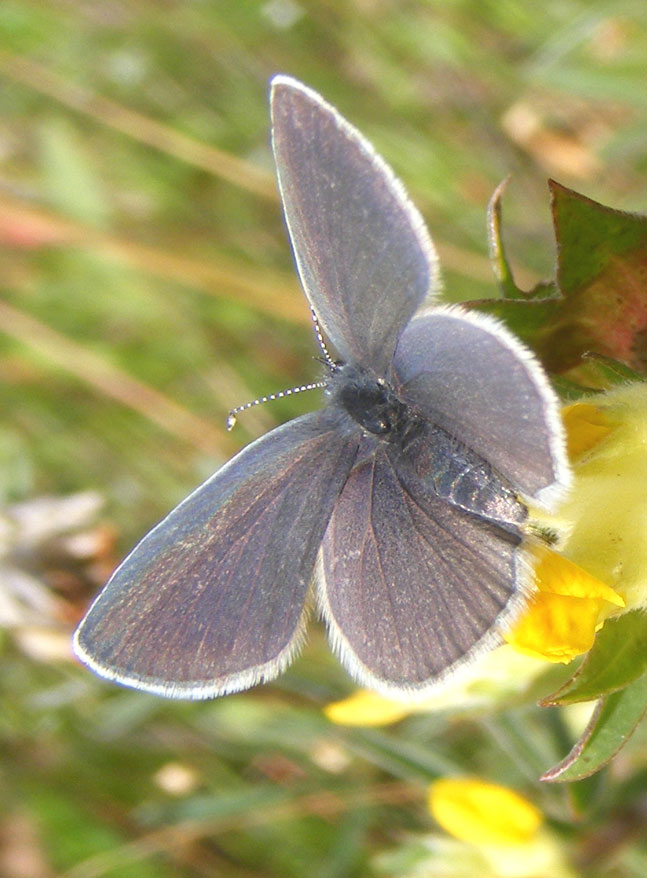
|
|
Small
Tortoiseshell
|
Common
Blue
(female)
|
Chalkhill
Blue
|
Small
Blue
|
| Species: |
Buckingham
Cutting
|
Pixie
Path & Butterfly Copse
|
Mill
Hill
Lower
Slopes
|
Mill
Hill
Middle
& Upper
|
TOTAL
|
| Chalkhill
Blue |
|
|
50+1 |
|
51+ |
| Meadow
Brown |
1+ |
2 |
1+ |
4+ |
Frequent |
| Gatekeeper |
1+ |
8 |
Frequent |
13+ |
Frequent |
| Large
White |
1+ |
|
1+ |
9+ |
Frequent |
| Small
Blue |
15+ |
|
|
|
15+ |
| Painted
Lady |
1 |
7 |
1+ |
21+ |
30+ |
| Small
Tortoiseshell |
|
|
|
1 |
1 |
| Speckled
Wood |
1 |
2 |
|
8+ |
11+ |
| Red
Admiral |
|
1 |
|
1+ |
2+ |
| Peacock |
|
2 |
1 |
5+ |
8+ |
| Brown
Argus |
|
|
|
|
1 |
| Common
Blue |
10+ |
2 |
1+ |
22+ |
35+ |
| Small
White |
|
1 |
|
2+ |
Occasional |
| Marbled
White |
|
|
1 |
|
1 |
| MOTHS: |
|
|
|
|
|
| Silver
Y Moth |
2+ |
|
|
Occasional |
Occasional |
| Pyrausta
nigrata |
|
|
Occasional |
|
Occasional |
| Six-spotted
Burnet Moth |
|
|
|
2+ |
Occasional |
Adur
Butterflies: First Dates
Fourteen
butterfly species
 25
July 2009
25
July 2009
A
fresh batch of Holly Blues
were out as four were seen on a breezy day on the outskirts* of Shoreham
with frequent Painted Ladies, Gatekeepers
and Large Whites,
and a few each of Small Tortoiseshells
(two on Frampton's Field south), Small
Whites,
Red
Admirals,
Peacock
Butterflies, Speckled Woods,
with one Comma
and
at least one male Common Blue
(Mill Hill Cutting SW). (*Adur Recreation
Ground > towpath adjacent to the Airport > Pixie
Path)
Nine
species
23
July 2009
Under
a cloudy sky my first female Chalkhill
Blue Butterfly of the year was blown about
in the breeze, with a count of 24 males
in unfavourable conditions on the lower slopes of Mill
Hill. The highlight of the day, as the sun and vanessid
butterflies
came out along the Coastal-Downs Link Cyclepath
between Upper Beeding and Old Shoreham, was the first
Hummingbird
Hawk-moth since 2006
whirring away amongst the meadow herbs on the edge of the verges, its orange
rear and vibrating wings most distinctive.
Greater
Knapweed Meadow (Image)
Knapweed
Studies
| Species: |
Buckingham
Cutting & the Dovecote Bank
|
Pixie
Path & Butterfly Copse
|
Mill
Hill
|
Coastal
Link Cyclepath & Shoreham Town
|
TOTAL
|
| Chalkhill
Blue |
|
|
25+1 |
|
26 |
| Meadow
Brown |
5 |
1 |
25 |
4+ |
35+ |
| Gatekeeper |
11 |
5 |
26 |
4+ |
46+ |
| Large
White |
1 |
2 |
6 |
4+ |
Frequent |
| Small
Blue |
6+ |
|
|
|
6+ |
| Painted
Lady |
1 |
5 |
29 |
26+ |
61+ |
| Small
Tortoiseshell |
|
|
|
4 |
4 |
| Speckled
Wood |
4 |
2 |
1 |
|
7 |
| Red
Admiral |
1 |
|
|
12+ |
13+ |
| Peacock |
1 |
1 |
8 |
14+ |
24+ |
| Small
Skipper |
|
|
2 |
|
2 |
| Common
Blue |
5 |
|
10 |
|
15 |
| Small
White |
1 |
1 |
|
2+ |
Occasional |
| Comma |
|
|
|
3 |
3 |
| MOTHS: |
|
|
|
|
|
| Silver
Y Moth |
3 |
1 |
6 |
1 |
3 |
| Pyrausta
nigrata |
|
|
Occasional |
|
Occasional |
| Six-spotted
Burnet Moth |
2 |
1 |
1 |
|
4+ |
| Hummingbird
Hawk-moth |
|
|
|
1
|
1
|
Fourteen
butterfly species
21
July 2009
Both
Painted
Lady Butterflies and Large
Whites were seen on passage in Shoreham.
 20
July 2009
20
July 2009
The
weather was still too inclement for butterflies
after a wet and breezy weekend, but despite the poor conditions Painted
Ladies were frequently
(25+) to be seen on the outskirts of Old Shoreham (Coastal-Downs
Link Cyclepath & Pixie Path and Buckingham
Cutting south), with frequent fresh Red
Admirals (10+) and Peacocks
(10+).
 |
 |
A Ringlet
was recorded on the Waterworks Road for the
first time in this location on these web pages
and it flew towards Mill Hill to just about
make a first inclusion in Mill Hill Nature
Reserve. It was joined by a Comma
and a Meadow
Brown
and
frequent (20+) Large Whites.
On Buckingham Cutting (south) this undisturbed (by passing humans) piece
of roadside verge instantly revealed three male Common
Blues, a Small
Skipper, courting Gatekeepers,
a few Speckled Woods,
mating Small Blues
plus handful of solitary ones, a Six-spotted
Burnet Moth and a Burnet
Companion Moth. Over the hedgerow at Buckingham
Cutting a blue butterfly flew and I very much suspect that this was a Holly
Blue, but it was much too restless and
disappeared towards even denser foliage.
Twelve
confirmed butterfly species and one probable
17
July 2009
On
a day too breezy and overcast for butterflies,
the usual July
species were seen on the Coastal-Downs Link Cyclepath
to Upper Beeding: frequent Red
Admirals, occasional
just about everything else listed, Painted
Ladies, Speckled
Woods, Large
Whites, Gatekeepers,
Meadow
Browns,
two Comma Butterflies
(both at Dacre Gardens) and
one Peacock
Butterfly (at
Old Shoreham).
Nine
species (including the Comma
not seen the day before)
16
July 2009
My
first Clouded Yellow Butterfly since
2007
flew over Frampton's Field, Old Shoreham, and disappeared from sight amongst
the
Creeping Thistles.
On Mill Hill in the early afternoon the
count of male Chalkhill Blue Butterflies
was
30. As expected at this time of the year, Large
Whites,
Meadow
Browns
and
Gatekeepers
were all frequently seen.
At least five
Small Blues,
most in good condition were seen on the southern bank of Buckingham
Cutting and this must be a second brood.
| Species: |
Buckingham
Cutting & the Pixie Path
|
Lower
Slopes
|
Scrub
& Copse
|
Plateau
& South, Middle Slopes and Top Meadow
|
TOTAL
|
| Chalkhill
Blue |
|
30 |
|
|
30 |
| Meadow
Brown |
3 |
6 |
11 |
1 |
21+ |
| Gatekeeper |
5 |
14 |
5 |
3 |
27+ |
| Large
White |
1+ |
1+ |
1+ |
1+ |
Frequent |
| Marbled White |
|
2 |
|
1 |
3 |
| Painted
Lady |
|
|
1 |
3 |
4 |
| Clouded
Yellow |
1 |
|
|
|
1 |
| Speckled
Wood |
2 |
|
6 |
|
11 |
| Red
Admiral |
|
1 |
|
|
2 |
| Peacock |
|
|
2 |
|
2 |
| Small
Blue |
5+ |
|
|
|
5+ |
| Small
Skipper |
|
|
|
2 |
2 |
| Common
Blue |
2 |
3 |
|
1 |
6 |
| Small
White |
1 |
|
|
|
Occasional |
| Brimstone
Butterfly |
|
1 |
|
|
1 |
| |
|
|
|
|
|
| Silver
Y Moth |
1 |
1 |
|
1 |
3 |
| Pyrausta
nigrata |
|
Frequent |
|
|
Frequent |
| Six-spotted
Burnet Moth |
Frequent |
|
Frequent |
Frequent |
Frequent |
In
Shoreham, including Buckingham Park, there were three Speckled
Woods at the top (where all the vegetation
under the trees had been mown and disposed of), frequent Large
Whites and occasional Small
Whites and another Red
Admiral added up in the above totals.
Greater
Knapweed Butterfly Study
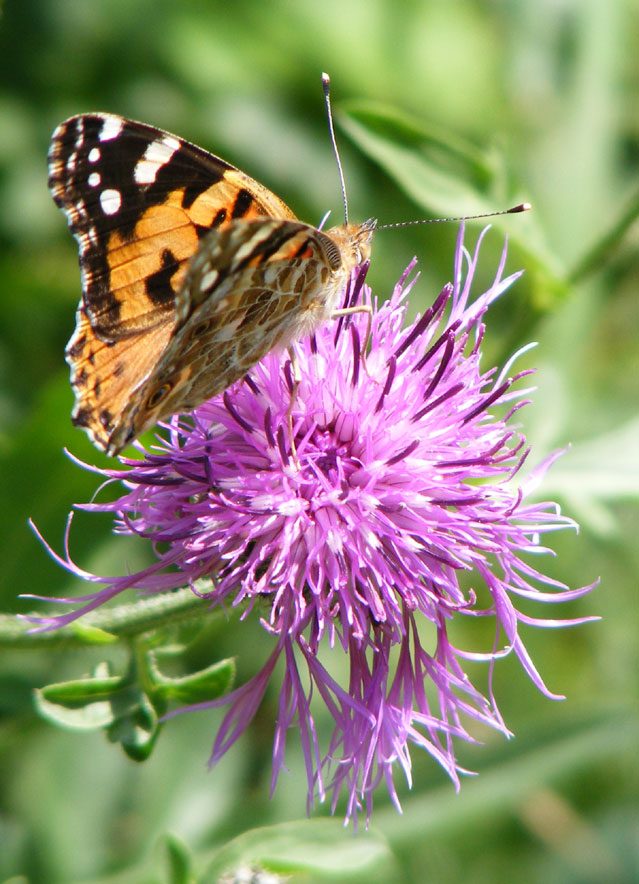
|
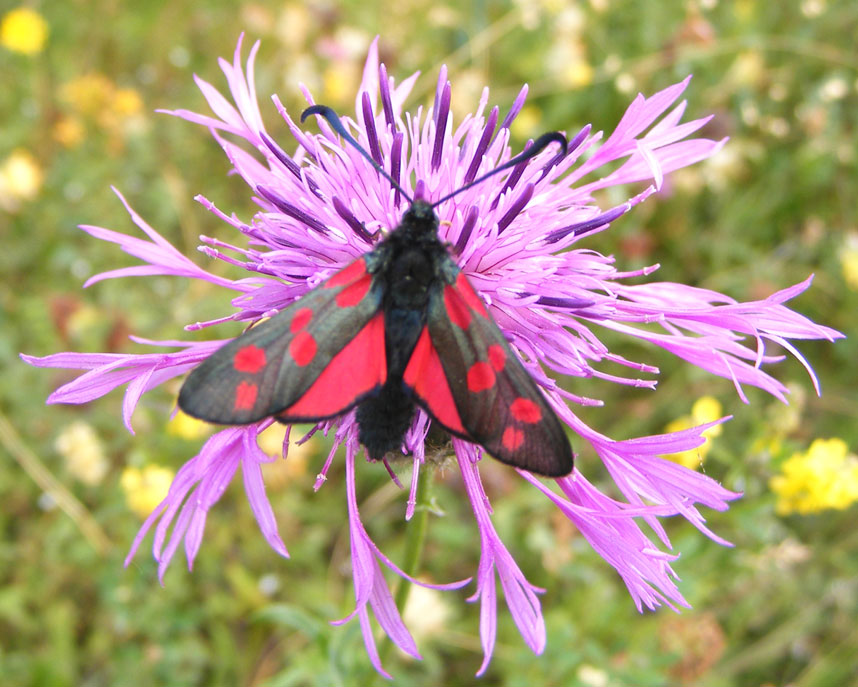
|

|
|
Painted
Lady
|
Six-spotted
Burnet Moth
|
Peacock
Butterfly
|
In
the early evening there were further Small
Skippers (2+) frequent Meadow
Browns,
occasional Gatekeepers
on the southern bank of the Slonk Hill Cutting, and on the bridlepath north
of Slonk Hill Farm there were three Painted
Ladies (two pristine and one badly mauled)
and a Peacock Butterfly.
These are not included in the table above. Six-spotted
Burnet Moths were frequently seen both
on Buckingham Cutting (south), north Shoreham,
and on Mill Hill.
Fifteen
butterfly species (the most in a day this year by one)
Adur
Butterflies: First Dates
Adur
Burnet Moths
Mill
Hill & its Butterflies Article
In
the last good year in 2003
the
numbers of Chalkhill Blue Butterflies
recorded on Mill Hill were:

| Date |
|
| 11
July 2003 |
First
visit
|
| 11
July 2003 |
50
|
| 20
July 2003 |
1200+
|
| 21
July 2003 |
200+
|
| 30
July 2003 |
2000+
|
| 2
August 2003 |
3000+
|
| 7
August 2003: |
120
|
| 20
August 2003 |
30
|
UK
Butterflies Chalkhill Blues 2009
14
July 2009
A
visit to Tottington Woods, Small Dole, with
Jan
Hamblett, resulted in the sightings of
two butterflies not recorded personally in
the Lower Adur Valley area before.

|
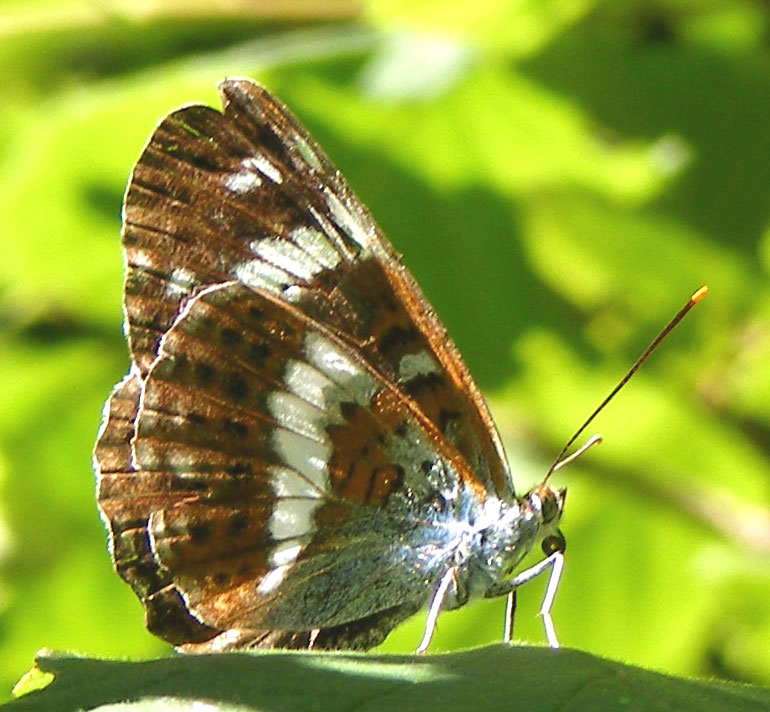
|
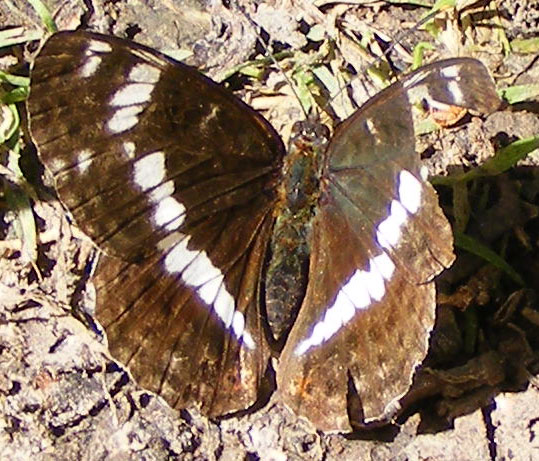
|
|
Silver-washed
Fritillary
|
White
Admiral
|
White
Admiral
|

There
were frequent flights under the canopy of Oak
and
Willow
of
the large and splendid
Silver-washed Fritillaries
flying up to about five metres above the ground vegetation and wood piles
and occasionally landing for a photograph. Two splendid White
Admirals
were spotted, the first one slightly
worn and intact, and the one that landed in front of us was damaged with
two chunks missing out of its left forewing. Other butterflies seen in
the woods were frequent Large Whites,
occasional Small Whites,
frequent Peacock Butterflies,
frequent Speckled Woods,
frequent Gatekeepers,
occasional
Meadow
Browns,
occasional Comma Butterflies,
a few Small Skippers,
at least two Large
Skippers, at least one Red
Admiral, frequent Ringlets,
and on the mown field immediately outside of the woods to the south-east
a Marbled White fluttered
amongst the shorn grass.
Adur
Butterfly Flight Times
Fourteen
butterfly species (equal most in a day this year)
|
Large
White
|
Peacock
|
Meadow
Brown
|
Chalkhill
Blue
|
Red
Admiral
|
Common
Blue
|
|
Speckled
Wood
|
Marbled
White
|
Small White
|
Comma
|
Large
Skipper
|
Ringlet
|
|
Gatekeeper
|
Small
Skipper
|
Painted
Lady
|
Small
Tortoiseshell
|
Silver-washed
Fritillary
|
White
Admiral
|

18
species of butterflies were recorded on the 13
& 14th July 2009
|
Clouded
Yellow
|
Small
Blue
|
Brimstone
|
21
species of butterflies were recorded on the 13th,
14th & 16th July 2009
13
July 2009
On
the first fine day since the 4
July 2009, it was still a bit breezy and
overcast for butterflies, but a visit to
Mill
Hill produced 14 Chalkhill Blues
and the following common species:
| Species: |
Plateau
& South
|
Lower
Slopes
|
Scrub
& Copse
|
Middle
Slopes and Top Meadow
|
Mill
Hill
TOTAL
|
| Chalkhill
Blue |
|
12 |
|
2 |
14 |
| Meadow
Brown |
Few |
Occasional |
Occasional |
Occasional |
Frequent |
| Gatekeeper |
Occasional |
Occasional |
Occasional |
Occasional |
Frequent |
| Large
White |
|
Frequent |
1 |
1 |
Frequent |
| Marbled White |
|
2 |
|
1 |
3 |
| Painted
Lady |
|
|
2 |
|
3 |
| Comma |
|
|
|
1 |
1 |
| Speckled
Wood |
|
|
5 |
|
5 |
| Red
Admiral |
|
|
4 |
|
4 |
| Peacock |
|
|
2 |
|
2 |
| Small
Tortoiseshell |
2 |
1 |
|
|
3 |
| Small
Skipper |
3 |
1 |
|
1 |
5 |
| Common
Blue |
|
|
|
2 |
2 |
| Small
White |
|
|
1 + |
|
1+ |
| |
|
|
|
|
|
| Mother
Shipton Moth |
|
1 |
|
|
1 |
| Silver
Y Moth |
|
1 |
|
|
1 |
| Pyrausta
nigrata |
|
Frequent |
|
|
Frequent |
| Six-spotted
Burnet Moth |
|
1 |
|
6 |
7 |
Fourteen
butterfly species (equal most in a day this year)
12
July 2009
As
the breeze blew the upright Teasel
almost horizontal at times, it wasn't a day conducive for watching butterflies
but the following were noted on the outskirts of Old Shoreham: occasional
Large Whites, occasional pristine Red
Admirals, occasional Gatekeepers,
a few Meadow
Browns,
a few Small Skippers,
a few Speckled
Woods, a few unidentified smaller
whites (Green-veined &/or Small?)
and
a few flying Six-spotted Burnet Moths.
Seven
butterfly species
9 July
2009
A
Speckled
Wood Butterfly flew over the hedge in
the twitten between Adelaide Square and Corbyn
Crescent in Shoreham town.
After
three days of rain, an overcast day was too cool for downland butterflies
as almost all of them were resting until disturbed and the Chalkhill
Blue was not seen. Mill
Hill produced on a quick visit two Red
Admirals, one Peacock,
seven Gatekeepers,
three Marbled Whites,
a few Meadow
Browns,
one Small Skipper,
two Large Whites, one
Small Heath and two Six-spotted
Burnet Moths. By the Reservoir the first
Cinnabar
Moth caterpillars of the year were seen
on a small clump of Ragwort.
The Pixie Path and Waterworks Road added a
faded and tattered Painted Lady,
two Gatekeepers,
at least three Large Whites,
two Speckled Woods,
two Comma Butterflies,
another
Small Skipper
and a definite Green-veined White.
Eleven
species
5
July 2009
There
was still just the one Chalkhill Blue Butterfly
over the lower slopes of Mill Hill, flying
rapidly around in the breeze. On the approaches there were three Large
Whites, one Large
Skipper and three Small
Skippers, three Speckled
Woods, a few Meadow
Browns,
a few Gatekeepers,
two Marbled Whites and
a Silver Y
Moth. On Mill Hill (lower slopes and return
by the ridge route) in addition ot the Chalkhill
Blue, there were about a dozen Marbled
Whites (six over the lower slopes), occasional
Gatekeepers,
occasional
Meadow Browns,
one Comma,
at least one Small Skipper
and one Red Admiral.
The two small pyralid micro-moths
Pyrausta purpuralis and
Pyrausta
nigrata
were frequently seen.
Eleven
species
4
July 2009
A
late afternoon cycle ride to Cuckoo's Corner and the field to the north
produced
frequent
Meadow Browns, frequent Large
Whites, frequent Gatekeepers,
occasional good condition Red Admirals,
one Comma,
one Small Tortoiseshell,
occasional Skippers and at least one Large
Skipper and one Small
Skipper
were positively identified, at
least one
Small White,
one Speckled Wood
and one Marbled White.
Eleven
species
3
July 2009
A
pristine Peacock Butterfly was
spotted on the Coastal-Downs Link Cyclepath
halfway between Upper Beeding and Old Shoreham which makes 18
species seen in the first three days of July.
Other butterfly species on the cycle ride
to Annington Sewer and back were frequent
Meadow Browns,
occasional
Large Whites, frequent Gatekeepers,
occasional (8+) Red Admirals,
occasional (6+) Commas,
occasional Ringlets,
at least six Small Tortoiseshells
on the path from the South Downs Way Bridge to Annington and one in Old
Shoreham, one Speckled Wood
and one Marbled White.
Ten
species
2
July 2009
The
brilliant sky blue of the first Chalkhill
Blue Butterfly of the year rose from the
lower slopes of Mill Hill just before 11:00
am in the humid sunshine.
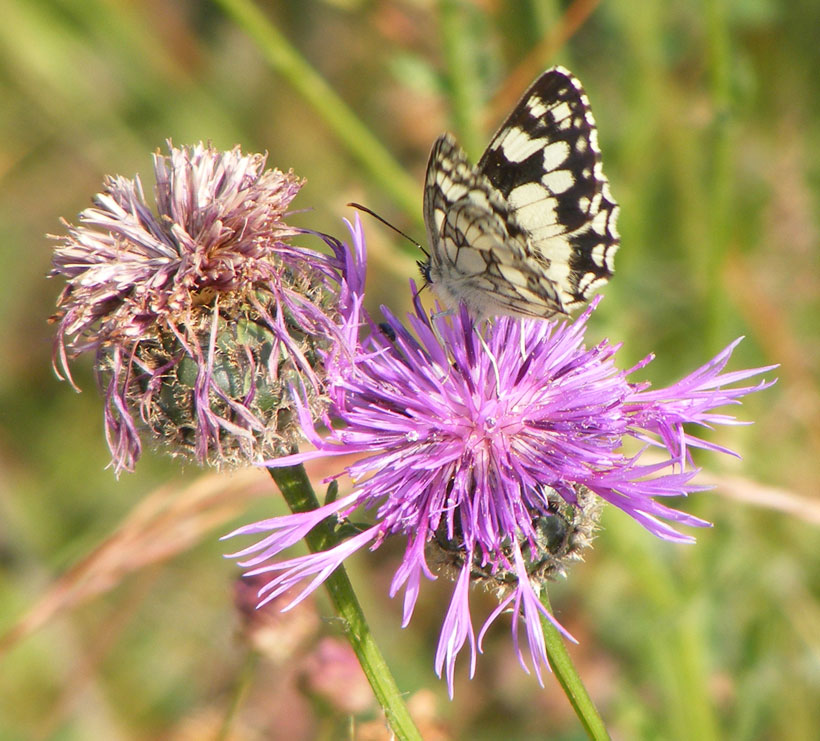 |
 |
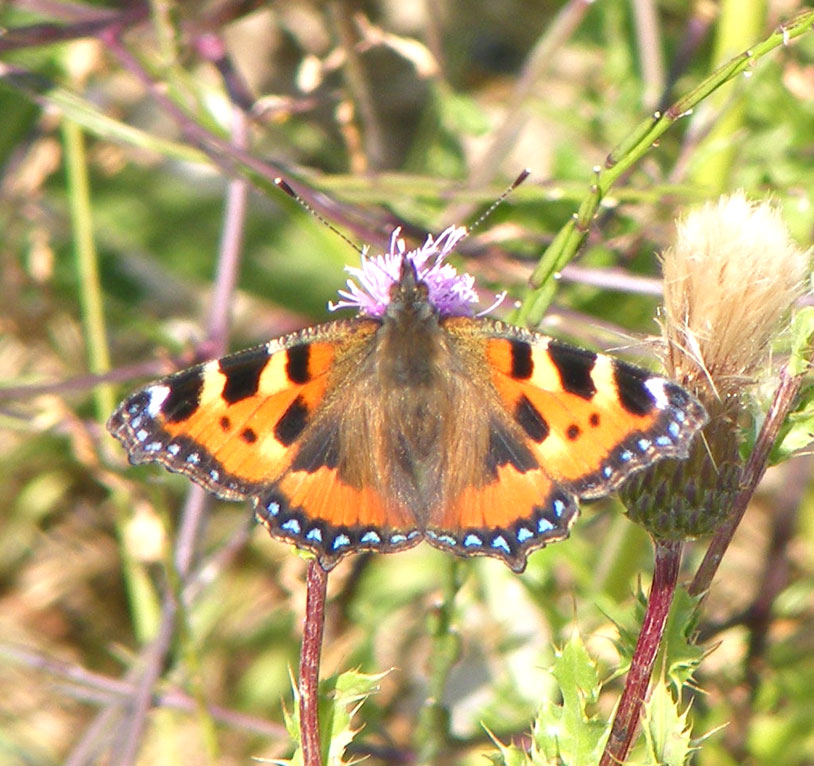 |
|
Marbled
White on Greater
Knapweed
|
Chalkhill
Blue
|
Small
Tortoiseshell
|
| Species |
Buckingham
Cutting (south) |
Pixie
Path & Frampton's Field + Waterworks Road |
Mill
Hill Plateau and southern top section |
Lower
Slopes of Mill Hill |
Scrub,
Middle Slopes & Copse on Mill Hill |
TOTAL |
| Large
White |
2
|
4 |
3 |
|
5 |
14 |
| Speckled
Wood |
2
|
|
|
|
1 |
3 |
| Gatekeeper |
5 |
2 |
4 |
1 |
2 |
14 |
| Small
Blue |
1 |
|
|
|
|
1 |
| Marbled
White |
3 |
3 |
5 |
3 |
18 |
32 |
| Small
Skipper |
1 |
1 |
|
|
2 |
4 |
| Meadow
Brown |
1 |
10 |
3 |
|
12 |
26 |
| Small
Heath |
|
|
1 |
1 |
|
2 |
| Painted
Lady |
|
|
1 |
|
|
1 |
| Chalkhill
Blue |
|
|
|
1 |
|
1 |
| Comma |
|
1 |
|
|
2 |
3 |
| Small
Tortoiseshell |
|
3 |
|
1 |
|
4 |
| Red
Admiral |
|
|
|
|
2 |
2 |
| Large
Skipper |
|
|
|
|
1 |
1 |
| |
|
|
|
|
|
|
| Burnet
Moth (unidentified to species) |
|
|
|
2 |
1 |
3 |
| Cinnabar
Moth |
|
|
|
|
1 |
1 |
| Silver
Y Moth |
1 |
|
|
|
1 |
1 |
| Pyrausta
purpuralis |
|
|
|
3+ |
|
3+ |
| Pyrausta
nigrata |
|
|
|
1+ |
|
1+ |
Fourteen
butterfly species, the equal most in a day this year,
plus three day-flying larger moths
|
Large
White
|
Small
Blue
|
Meadow
Brown
|
Chalkhill
Blue
|
Red
Admiral
|
Common
Blue
|
|
Speckled
Wood
|
Marbled
White
|
Small
Heath
|
Comma
|
Large
Skipper
|
Ringlet
|
|
Gatekeeper
|
Small
Skipper
|
Painted
Lady
|
Small
Tortoiseshell
|
Small White
|
|
Seventeen
species of butterflies were recorded in the first two days of July
2009
1
July 2009

|

|

|
Narrow-bordered
Five-spot
Burnet Moth
|
Ringlet
Butterfly
|
Six-spotted
Burnet Moth
|
| Species |
Holmbush
Close Field |
Bridlepath
to Southwick Hill |
Southwick
Hill (part) |
Bridlepath
going west to Stonechat Junction |
Bridlepath
going south to Slonk Hill Farm |
Slonk
Hill Cutting (south & Buckingham Cutting (south) |
TOTAL |
| Small
White |
1
|
|
|
|
|
|
1
|
| Meadow
Brown |
32
|
4
|
15
|
23
|
6
|
14
|
94
|
| Marbled
White |
32
|
6
|
6
|
1
|
|
1
|
45
|
| Gatekeeper |
11
|
1
|
1
|
|
2
|
2
|
17
|
| Small
Heath |
3
|
|
|
|
|
|
3
|
| Large
White |
|
6
|
7
|
1
|
|
|
14
|
| Small
Skipper |
|
1
|
1
|
1
|
|
|
3
|
| Painted
Lady |
|
|
2
|
3
|
1
|
|
6
|
| Common
Blue |
|
|
|
1
|
|
|
1
|
| Comma |
|
|
|
2
|
|
|
2
|
| Small
Tortoiseshell |
|
|
|
|
7
|
|
7
|
| Speckled
Wood |
|
|
|
|
|
3
|
3
|
| Ringlet |
|
|
|
|
|
5
|
5
|
| Small
Blue |
|
|
|
|
|
2
|
2
|
| Narrow-bordered
Five-spot Burnet Moth |
4
|
|
|
|
|
|
4
|
| Six-spotted
Burnet Moth |
|
|
|
|
|
1
|
1
|
| Silver
Y Moth |
|
|
|
|
|
1
|
1
|
| Burnet
Companion Moth |
4
|
|
|
|
|
|
4
|
| Cinnabar
Moth |
3
|
1
|
|
|
|
|
4
|
203
butterflies in the afternoon of fourteen butterfly species, the most in
a day this year, plus five day-flying larger moths
Addenda:
I went out in the early evening down by the River
Adur and saw occasional Meadow
Browns and a few Large
Whites and Speckled
Woods, and at east one tattered Painted
Lady and a Marbled
White.
30
June 2009
The
first Brimstone Moth
of the year was seen in Worthing Town Centre (Chatsworth Road). The first
Holly
Blue since 14
June 2009 was seen fluttering over Ray
Hamblett's back garden in south Lancing, with frequent Large
Whites, two Comma
Butterflies, one Small
White (over the Sea Purslane at low tide),
one Large Skipper
(Waterworks Road), two Gatekeepers
and occasional Meadow
Browns
seen
on the outskirts of Shoreham and passage through Lancing.
Seven
species
 29
June 2009
29
June 2009
I
suspected that the small brown butterflies
blown about in the breeze of the last few days were Gatekeepers,
but one settled for confirmation. And it was a female which appear after
the first males. There were a few Painted
Ladies
on the outskirts of Shoreham, notably
on the towpath to Cuckoo's Corner where a faded
Small
Tortoiseshell was spotted on the path
by the Broad Bean
field north of the car park. The path hosted frequent Meadow
Browns
and
a few first of the year Narrow-bordered
Five-spot Burnet Moths, Zygaena lonicerae, visited
Tufted
Vetch. A Comma
Butterfly was seen on Stinging Nettles
on the other side of the road from Ladywells on the Coombes Road. Large
Whites were seen occasionally
everywhere. A fine condition
Small Tortoiseshell
was seen on the Pixie Path and a Marbled
White fluttered over Frampton's Field.
A Red Admiral rose
from the lawn at the top of Chanctonbury Drive, south-east of Mill
Hill (which was not visited) in the sunshine of the late afternoon.
Adur
Burnet Moths
Eight
species
28
June 2009
 There
was still a Speckled Wood
to be seen at the top of Buckingham Park, Shoreham, but I had to wait a
few minutes for one to appear. On the southern bank of Buckingham Cutting
there were the usual frequent Small
Blues, a few Meadow
Browns
(including
the first female noted), one
Marbled White,
just my second Small Skipper
of the year, plus a Large White.
On pasture below (west of) Mill HIll hosting a car boot sale, a Burnet
Moth
flew over the stalls. There were
more
Meadow Browns over
the
Coastal-Downs Link Cyclepath but I only
made a passage trip a short way along to the entrance where the Steyning
Road curves around on the same latitude as Old Erringham. A Painted
Lady settled on the wasteland
on the embankment near the Buffer Stop, which was the old railway track
by the Riverside Business Centre. The small brown butterflies were later
identified as the first Gatekeepers
of the year.
There
was still a Speckled Wood
to be seen at the top of Buckingham Park, Shoreham, but I had to wait a
few minutes for one to appear. On the southern bank of Buckingham Cutting
there were the usual frequent Small
Blues, a few Meadow
Browns
(including
the first female noted), one
Marbled White,
just my second Small Skipper
of the year, plus a Large White.
On pasture below (west of) Mill HIll hosting a car boot sale, a Burnet
Moth
flew over the stalls. There were
more
Meadow Browns over
the
Coastal-Downs Link Cyclepath but I only
made a passage trip a short way along to the entrance where the Steyning
Road curves around on the same latitude as Old Erringham. A Painted
Lady settled on the wasteland
on the embankment near the Buffer Stop, which was the old railway track
by the Riverside Business Centre. The small brown butterflies were later
identified as the first Gatekeepers
of the year.
Adur
Butterflies: First Dates
Eight
species
27
June 2009
A
Speckled
Wood was seen under shade at Buckingham
Cutting (south) with occasional Small Blues,
a Large White
and a Meadow Brown
seen in the flowery cutting. A Comma
Butterfly fluttered out from the undergrowth
dividing Frampton's Field from the top of The Street, Old Shoreham. In
the early evening a Painted Lady
flew up Ravens Road in Shoreham town. At dusk
a Red Admiral
flew over Middle Road Allotments, Shoreham.
Seven
species
26
June 2009
A
Privet
Hawkmoth was photographed on Shoreham
Beach.
A
cycle ride from Old Shoreham to Upper Beeding and Dacre Gardens along the
Coastal-Downs
Link Cyclepath produced frequent butterflies
including frequent Meadow Browns,
one Large White,
one Ringlet,
at least one Speckled Wood, two
Painted
Ladies, a Large
Skipper and at least one 6-spot
Burnet Moth. There was at least one Small
White Butterfly fluttering around Shoreham
town.
Eight
butterfly species
25
June 2009
There
were occasional Small
White Butterflies seen around the Sea
Kale on Shoreham beach and other butterflies
seen during the day were a few Large Whites
on the outskirts of town and a Comma Butterfly
on the Coastal-Downs Link Cyclepath
south-east
of the Toll Bridge, Old Shoreham.
At least three 6-spot Burnet Moths were
seen by the Old Fort in the late afternoon.
Three
butterfly species
24
June 2009
A
pristine Red Admiral
flew up Victoria Road, Shoreham, over the junction near Victoria Road junior
school.
23
June 2009
A
passage trip by bicycle to Worthing along the seafront route revealed frequent
Painted Ladies, at least one
Small White and a few Large
Whites.
22
June 2009
A
cycle ride from Old Shoreham to Annington
Sewer along the Coastal-Downs
Link Cyclepath produced frequent butterflies
including at least two of my first Ringlet
Butterflies of the year. They were very
flighty and took five minutes to settle for a few seconds. On the flowery
verges I spotted one Cinnabar Moth,
frequent Six-spot Burnet Moths,
a few Burnet Companion Moths,
frequent Meadow Browns,
one Large White,
occasional (about eight) Marbled Whites,
about five Large Skippers,
at least three Comma Butterflies
and north of the South Days Way bridge there were two Small
Tortoiseshells.
Adur
Butterflies: First Dates

|

|
 |
|
Ringlet
Butterfly
|
Cinnabar
Moth
|
Comma
Butterfly
|
Seven
butterfly species and two day-flying moths
21
June 2009
A
Marbled
White Butterfly, a Meadow
Brown and an attractive
Burnet Companion Moth were seen on the
Slonk
Hill Cutting southern bank on a morning passage, plus frequent
Small Blue Butterflies on the southern
bank of the Buckingham Cutting. There were two Painted
Ladies and a Yellow
Shell Moth on the Pixie Path.

|
 |
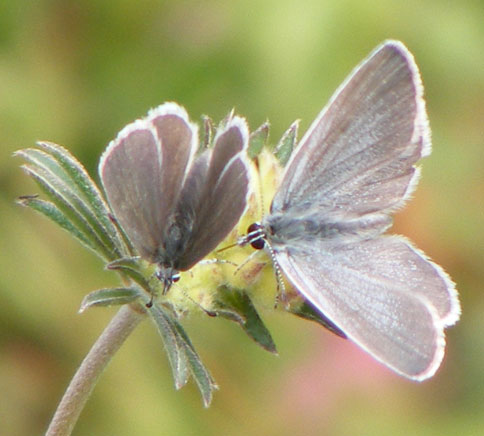 |
|
Male
Meadow Brown
|
Marbled
White Butterfly
|
Small
Blue Butterflies
|
On
Mill
Hill there were three Meadow Browns on
the grassy flat area south of the Reservoir. There were only occasional
butterflies
on the lower slopes and return by a quick route over the top spotting Small
Heath Butterflies, a few more Meadow
Browns, and a handful of Marbled
Whites and a few more Painted
Ladies. One tatty female Common
Blue settled on a Hawthorn sapling on
the northern end of the Privet inundated lower slopes. Small pyralid
micro-moths mostly
Pyrausta
purpuralis were frequently seen on
the lower slopes of Mill Hill with a few
Pyrausta
nigrata
and at least one Pyrausta
despicata and one of the larger Treble-bar
Moths. A Large
White Butterfly fluttered over Shoreham
town.
Seven
butterfly species
19
June 2009
A
summer Comma Butterfly
hid amongst the Stinging Nettles in the Butterfly Copse next to the Waterworks
Road on a sunny day with butterflies
spread widely. The next one seen was a Large
White at the western end of the Toll
Bridge, followed on a trip up the bridlepath from the Sussex Pad to
Lancing
Ring by three Speckled Woods,
two Meadow Browns,
three more Large Whites (including a courting pair) and a 6-spot
Burnet Moth on a Greater
Knapweed flower. The Chalk Pit area of Lancing
Ring Nature Reserve hosted a Small White,
two more Meadow Browns,
a
Marbled White
and a Large Skipper,
the last three amongst the long grasses.
 |

|
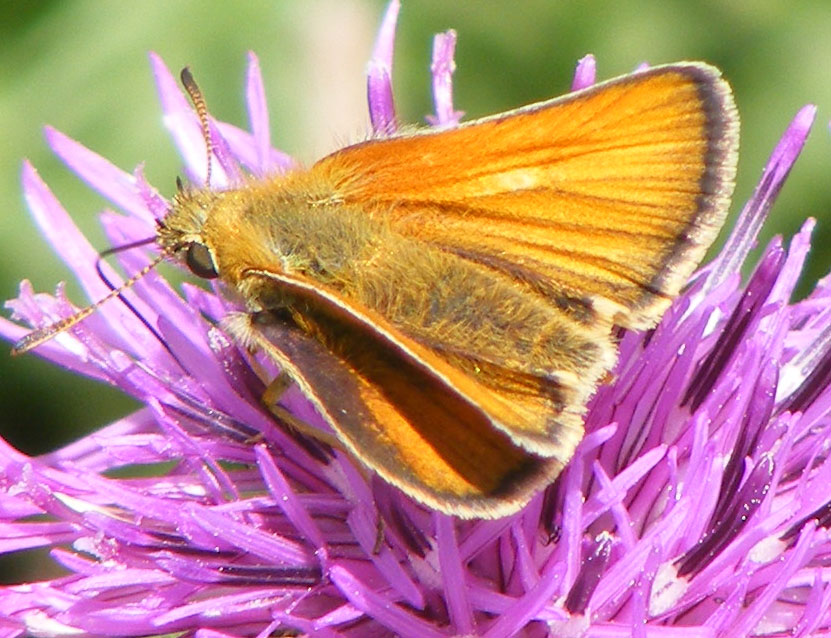
|
|
Marbled
White
|
Large
Skipper
|
Small
Skipper
|
In
the eastern car park area of Lancing Ring Nature Reserve a Comma
Butterfly flew rapidly up and away as well
as another Meadow Brown.
In the long grass and herb meadows, there was over five Large
Skippers in a prime spot, my first Small
Skipper of the year, (only identified
later by a photograph) one male Common
Blue, two Marbled
Whites and two more Meadow
Browns. The clump wooded area added a Large
White, two Meadow
Browns, two Speckled
Woods, two faded Painted
Ladies and a Red
Admiral. My return trip took me east along
the same bridlepath disturbing three
Meadow
Browns, a very tatty faded Small
Tortoiseshell, and another Painted
Lady, and in the central Hawthorn scrub area
of the meadow section, I noted another
Speckled
Wood. McIntyres Field hosted another Red
Admiral, a Large
White, three Meadow
Browns, a Painted
Lady, and a male Common
Blue.
(*
not 100% certain)
Adur
Butterflies: First Dates
Adur
Skippers
Twelve
butterfly species
15
June 2009
A
late afternoon foray to Buckingham Park recorded just two Speckled
Woods on passage, and to Buckingham
Cutting south found the usual fifty or so Small
Blue Butterflies, a few male Common
Blues and one Speckled
Wood. A Red
Admiral fluttered rapidly in the breeze
over the top section of the Pixie Path.
Four
species
14
June 2009
The
first butterfly on a sunny (19.1
°C at midday)
morning was a Holly Blue
over the top part of the Pixie Path (the Pixie
Path route was avoided on the day) followed by a Meadow
Brown on Mil Hill south of the Reservoir.
The lower slopes had relatively few butterflies: occasional
Meadow Browns, occasional Common
Blues, occasional Small
Heath Butterflies, one Marbled
White Butterfly, and a large white butterfly
that relentlessly patrolled the hedgerow in the manner of a female Brimstone
Butterfly. Finally, amongst the undergrowth
as I returned by the path on the lower slopes I was surprised by what appeared
at first to be an unfamiliar butterfly, but when it finally settled it
was revealed as a worn Small Tortoiseshell.
The small pyralid moth,
Pyrausta
purpuralis was frequently
seen on the lower slopes with a few Pyrausta
nigrata. I am not sure where I recorded
my first Painted Lady
of the day, but it was most likely to be on the Adur
Levels. A Large White
was seen over the car boot sale field to the west and below Mill Hill.
 Over
the Riverbank towpath by the houseboats, I observed two Small
Whites and a Red
Admiral. On the flowering
Shoreham Beach south of Winterton Way, there
were two more Small Whites
and a Painted Lady,
and at least three more Painted Ladies were
seen flying over the beach.
Over
the Riverbank towpath by the houseboats, I observed two Small
Whites and a Red
Admiral. On the flowering
Shoreham Beach south of Winterton Way, there
were two more Small Whites
and a Painted Lady,
and at least three more Painted Ladies were
seen flying over the beach.
Privet
was flowering in profusion and intruding on the lower slopes of Mill Hill
in a damaging way (damaging to the long term prospects of the butterflies).
Another noteworthy observation was a nest of the Common
Wasp, Vespula
vulgaris, in a small hole and scores
of wasps were seen entering and leaving in a few minutes, until I felt
it was too dangerous to stay around. I debated
about the significance of such a large congregation of predators on the
caterpillars of the butterflies?
Ten
butterfly species (including a further two not seen in the previous two
days)
13
June 2009
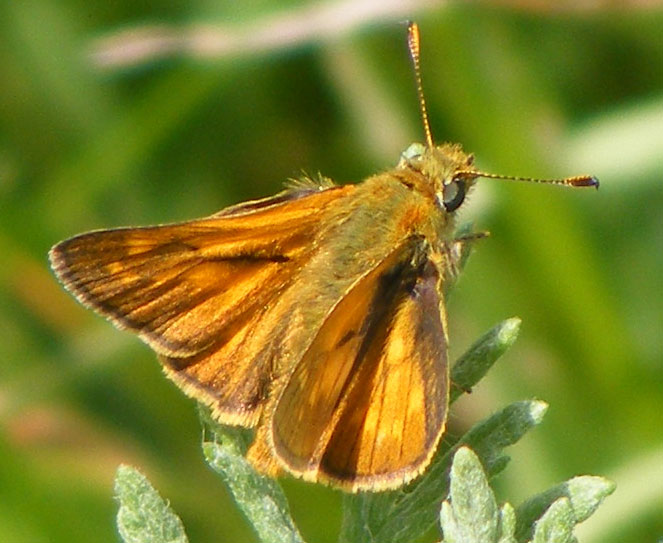 A
good condition Red Admiral
settled on the wooden towpath on Ropetackle near the Railway
Viaduct, followed by a Large White
on the Downs Link Cyclepath
(previously the Coastal Link Cyclepath) just
south of the
Toll Bridge, and on the
footpath on the southern border of Frampton's Field, Old Shoreham, a Painted
Lady, another Red
Admiral and a Speckled
Wood were observed. A Holly
Blue fluttered over The Driveway in north
Shoreham. On a humid warm Saturday, I detoured a route that took me from
the Buckingham Cutting along the linear path on the southern side of the
Slonk
Hill Cutting I spotted my first three
Large
Skippers of the year, 100+ Small
Blue Butterflies,
at least two tatty male
Common
Blues and a few male Meadow
Browns.
A
good condition Red Admiral
settled on the wooden towpath on Ropetackle near the Railway
Viaduct, followed by a Large White
on the Downs Link Cyclepath
(previously the Coastal Link Cyclepath) just
south of the
Toll Bridge, and on the
footpath on the southern border of Frampton's Field, Old Shoreham, a Painted
Lady, another Red
Admiral and a Speckled
Wood were observed. A Holly
Blue fluttered over The Driveway in north
Shoreham. On a humid warm Saturday, I detoured a route that took me from
the Buckingham Cutting along the linear path on the southern side of the
Slonk
Hill Cutting I spotted my first three
Large
Skippers of the year, 100+ Small
Blue Butterflies,
at least two tatty male
Common
Blues and a few male Meadow
Browns.
Adur
Skippers
Nine
species of butterfly (including two not seen the previous day)
12
June 2009
On
the Coastal Link Cyclepath just south of the
Toll
Bridge, Old Shoreham, the flying insect fluttering and being blown
about in the breeze was not a butterfly but
a Banded Demoiselle (a damselfly).
Adur
Dragonflies and Damsels 2009

|
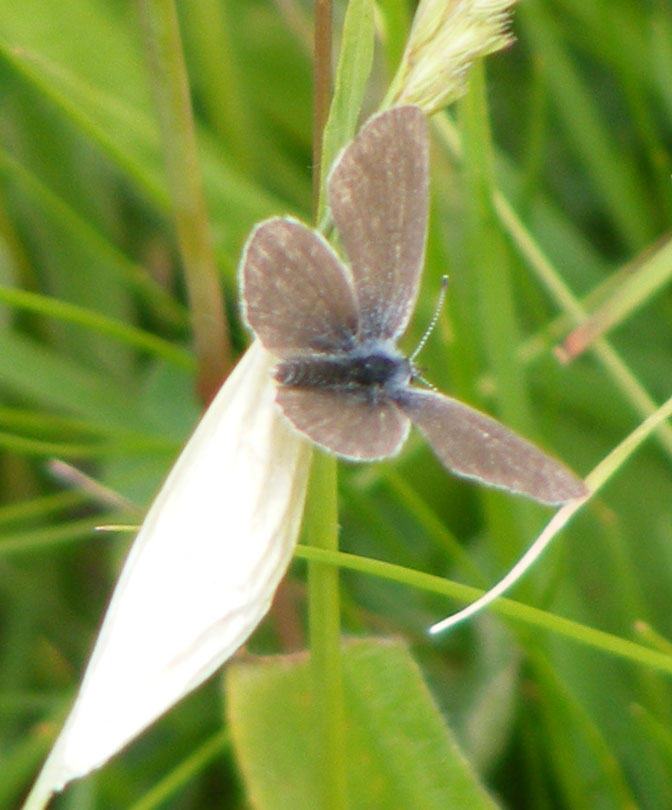
|
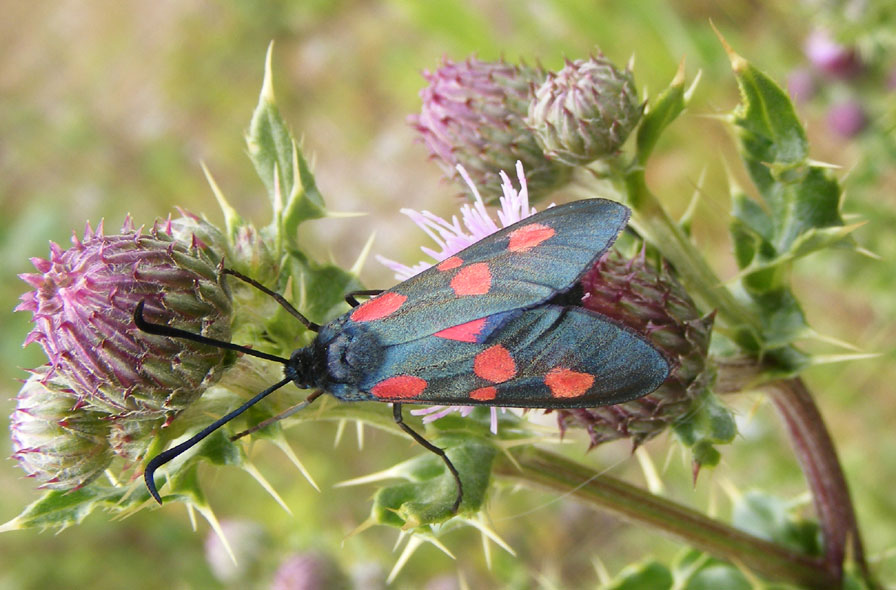
|
|
Meadow
Brown Butterfly
|
Small
Blue Butterfly
on
a Burnet cocoon on Anchor Bottom
|
Six-spotted
Burnet Moth
|
I recorded
my first Meadow Brown Butterfly
of 2009 over
the Coastal Link Cyclepath on a cycle ride to Botolphs. It was a male with
its all brown markings. There were about eight seen as I cycled past with
one Painted Lady,
two Large Whites,
a handful of Speckled Woods
and a few male Common Blues.
 My
first of the year Six-spotted Burnet Moth
was one of two on Creeping Thistle at
the back of Dacre Gardens next to Anchor Bottom.
Wild
Mignonette hosted a dozen Small
Blue Butterflies and one male Common
Blue in the same area. There were more Small
Blues on Anchor Bottom itself, at least another
six with two of them on a medium-dry cow pat,
and occasional Meadow Browns and
one tattered Cinnabar Moth.
On
the bottom of the fading Horseshoe Vetch,
Hippocrepis
comosa, patch amongst the long grass
there were two tattered male Adonis Blues
and about eight Small Heath Butterflies
courting and looking very lively. An undetermined
white butterfly flew over. I have no idea
which species out of three it could be?
My
first of the year Six-spotted Burnet Moth
was one of two on Creeping Thistle at
the back of Dacre Gardens next to Anchor Bottom.
Wild
Mignonette hosted a dozen Small
Blue Butterflies and one male Common
Blue in the same area. There were more Small
Blues on Anchor Bottom itself, at least another
six with two of them on a medium-dry cow pat,
and occasional Meadow Browns and
one tattered Cinnabar Moth.
On
the bottom of the fading Horseshoe Vetch,
Hippocrepis
comosa, patch amongst the long grass
there were two tattered male Adonis Blues
and about eight Small Heath Butterflies
courting and looking very lively. An undetermined
white butterfly flew over. I have no idea
which species out of three it could be?
Adur
Moths
Adur
Burnet Moths
Eight
species of butterfly
8
June 2009
An
afternoon outing on an overcast day produced a faded Painted
Lady flying low over Buckingham Park,
Shoreham, plus another four, including two on Mill
Hill. There were over a dozen fresh looking
Speckled
Woods in a small path in the north-west
of Buckingham Park with a good condition
Red
Admiral. On the southern side of Buckingham
Cutting, the small blue butterflies amongst the Brambles were all Small
Blues and the estimate was 75+ in this
small area. My first Marbled White Butterfly
of the year made a sudden appearance. This
was the earliest date recorded for this butterfly, three days earlier than
2008.
A
Treble-bar Moth
was noted on the Mill Hill Cutting south-west. Mill Hill was cloudy without
any rays of sunshine and I only managed to disturb two male
Adonis Blues and one dark Common
Blue on the lower slopes, plus a ragged
female Adonis Blue.
On the middle slopes a Wall Brown
briefly settled. At least one small pyralid
moth
Pyrausta nigrata in a brown colour
was noted amongst the remnants of the Horseshoe
Vetch,
Hippocrepis comosa,
with a Small Purple-barred Moth, Phytometra
viridaria.
Eight
butterfly species
Adur
Butterflies: First Dates
7 June
2009
A
few Large Whites
and Painted Ladies,
one Speckled
Wood plus one male Common
Blue were seen in Shoreham, the latter
on the verges of Coastal Link Cyclepath south
of the Toll Bridge, Old Shoreham.
4 June
2009
Having
finished work early I called into Mill Hill.
There were still plenty of Adonis
Blues
flying with most males past their best, however the females were still
looking good as were a few males. Several were courting and one pair were
found mating. Also there were two fresh Small
Tortoiseshells. Other butterflies seen
were Small Heath,
five Wall Browns,
Common
Blues, my first Meadow
Brown of the year, one Large
Skipper (first of the year) and ten Painted
Ladies.
Adur
Butterflies: First Dates
Adur
Skippers
2 June
2009
Frequent
Painted Lady Butterflies were seen regularly
throughout the day almost everywhere on Shoreham
Beach, in town and on the outskirts of
Shoreham and
Adur Levels. Over the footpath
south of Frampton's Field, Old Shoreham, a good condition
Red
Admiral rose from the bed of Stinging
Nettles. Large Whites
and Small Whites
were seen occasionally and there may have been a Green-veined
White over the Waterworks
Road, but it could not be confirmed. There
was a definite Cinnabar Moth that
visited a Green Alkanet flower
for a second. Cycling along the Coastal Link Cyclepath north from Old Shoreham
I spotted frequent Speckled Woods
and more Painted Ladies,
and at Upper Beeding there was a worn
Peacock
Butterfly.
Six
definite species of butterfly and one possible and one day-flying moth
31
May 2009
The
approaches to Mill
Hill yielded the following butterflies
and moths: two
Speckled
Woods in Buckingham Park, Shoreham, plus
another, about twenty lively Small Blues
on the southern side of the Buckingham Cutting,
where a male Common Blue
was spotted, a probable Wall Brown
and a Silver Y Moth and
my first Burnet Companion Moth
of the year. There was a Treble-bar Moth
on the Mill Hill Cutting (south-west), and a Holly
Blue in amongst the Ivy in the Butterfly
Copse next to the Waterworks
Road.
Mill
Hill added approximately 22 Common Blue
Butterflies, 14 Adonis Blues,
a few
Brimstone Butterflies,
five immigrant Painted Lady Butterflies
plus
two elsewhere, and two resident Small Heath
Butterflies. Two Green-veined
White Butterflies were seen over the lower
slopes with a Yellow Shell,
Mother
Shipton and a Cinnabar
Moth. There were three more Speckled
Woods in the scrub.
Other
butterflies seen in Shoreham town included
both Large Whites, Small Whites
and a dark vanessid (a Red Admiral
or Peacock).
Mill
Hill Report
Twelve
species of butterflies (eleven identified), plus a probable, and five medium-sized
day-flying moths.
I saw
my first Meadow Brown
Butterfly of the summer in the morning
at Beeding Hill.
I also saw a number of Six-spot Burnet
Moths flying. This
actually the first May report
for this butterfly on the last day of the month. This
was the first record of the year for Sussex in a location where early Meadow
Browns are seen.
Adur
Butterflies: First Dates
Adur
Butterfly Flight Times
29
May 2009
There
were frequent Painted Lady Butterflies
around
Shoreham
town and over Shoreham Beach and one
even fluttered around my head when I was shrimping
along the edge of the shallow sea at low tide.
A few Large White Butterflies
were noticed as well, including one over the Sea
Kale.
27
May 2009
The
Painted
Lady Butterflies were not as numerous
as the previous day and one every minute was seen along the western towpath
from the Toll Bridge to Cuckoo's Corner.They
visited
Hardheads,
and
Red and White
Clovers.
There
were a few white butterflies
as well and they could have been
Green-veined
or Small Whites
or both.
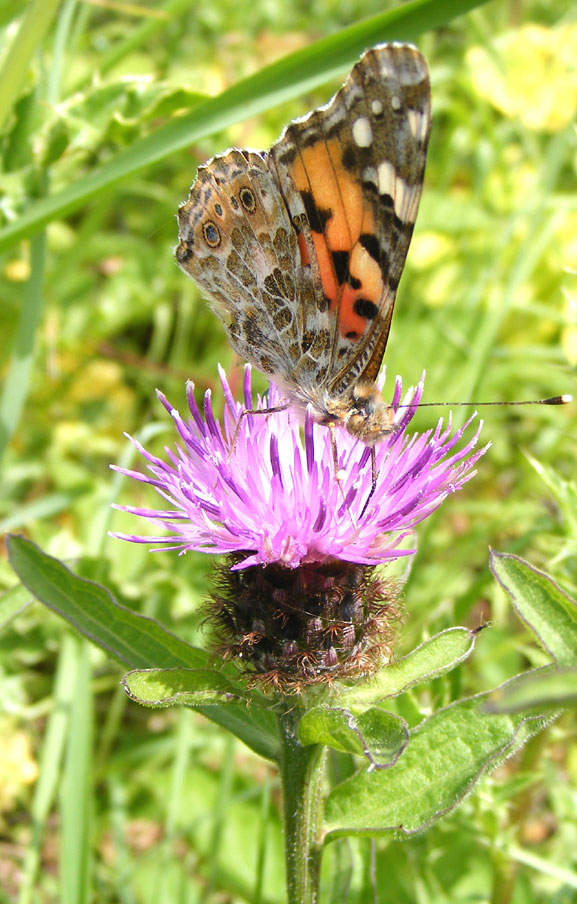 26
May 2009
26
May 2009
The
mass immigration of Painted Lady Butterflies
was
astonishing, throughout the morning over east Shoreham, Southwick and Portslade
the Painted Ladies exceeded
two a minute for an hour and were over one a minute the rest of the time,
with large numbers (100+) in Portslade Cemetery and on the main road that
traversed Hove Cemetery, the butterflies
flew across the road at over 30 every minute for five minutes in passing.
The conservative estimate was at least 500 seen as I cycled along the urban
roads. Their estimated speed was 8 mph although some seemed to have lost
their sense of steady northerly migration. Occasionally a Large
White Butterfly was spotted.
Painted
Lady Influx on UK Butterflies
25
May 2009
A
Painted
Lady Butterfly was seen in Corbyn Crescent,
Shoreham, at 7:30 am,
so I suspect a large influx all along coastal Sussex.
24
May 2009
An
influx of Painted Lady Butterflies
occurred although the evidence was only the first one seen flying over
Buckingham
Cutting south and in the early afternoon sunshine two more were seen
in Buckingham Road, Shoreham. The small verge area at Buckingham Cutting
on the southern side produced a dozen or so
Small
Blues scattered over a larger area than
the three days ago plus a male Common
Blue a few Treble-bar
Moths and a Silver
Y Moth.

|

|
 |
 |
|
Silver
Y Moth
|
Male
Common
Blue
|
Painted
Lady
|
Mother
Shipton Moth
|
The
lower slopes of Mill
Hill hosted 41 Adonis
Blues
(including
two females) in a 20 minute saunter over the
one acre transect, one Brimstone Butterfly,
one male Common Blue (and
another two on the return by the ridge route), and what at first glance
appeared to be Grizzled Skippers,
but close inspection revealed these to be three of the attractive Mother
Shipton Moths. There was at least one
Silver
Y Moth over the fading Horseshoe
Vetch,
Hippocrepis comosa,
on the lower slopes. Both
Small Whites
and Large Whites
were seen in town and on the outskirts and
a few Specked Woods
and a Wall Brown
flew over the top part of the Pixie Path and over the Mill Hill Cutting
south-west of the bridge over the A27.
A Holly Blue
and a few Speckled Woods
flew at the top of Buckingham Park, north Shoreham.
In
the early evening a further three Painted
Ladies flew rapidly (about 8 mph) by me, one
flying in off the sea.
Ten
butterfly species and three day-flying moths
22
May 2009
An
evening walk along Mill Hill produced plenty
of
Adonis
Blues,
many of them in pristine condition. At a rough guess I reckon I saw between
15 and 20 males (5 or 6 of them high up on the brow of the hill) and 2
or 3 females, the latter hugging the ground lower on the hill. One small
patch of low bramble and Tor Grass
held at least 6 males all clustered together, it was quite a sight as they
all suddenly flew up in the air only to settle back down again almost immediately.
Other species included one Small Heath,
two Dingy Skippers
and one Cinnabar Moth.
I looked for Wall Browns
on the brow of the hill but did not see any. It was very windy up there
which may be a factor but, on the other hand, I could have been looking
in the wrong place!
21
May 2009
A
leisurely cycle trip in the sunshine along the Coastal
Link Cyclepath to Upper Beeding recorded occasional Large
Whites, a few Small
Whites and Green-veined
Whites, about three Common
Blues noticed, one or more Brimstone
Butterflies, occasional vanessids
including a few worn Peacocks
and a good condition Red Admiral (no
vanessids
were recorded the previous day),
two Wall Browns
and a few Speckled Woods.
The pale female Brimstone
fluttered from one Common Vetch flower
to another.
Anchor
Bottom produced occasional (at least five) Small
Heaths, about five Common
Blues on the western bottom area, and by the
bed of Stinging Nettles there were a couple of Cinnabar
Moths. The south-facing patch of Horseshoe
Vetch,
Hippocrepis comosa
and Sainfoin hosted
occasional (at least ten) male Adonis Blues.

|

|

|
|
Small
Blue Butterflies
|
Small
Blue Butterfly
|
Female
Common
Blue Butterfly
|
In
the late afternoon there were about twenty Small
Blues in a three square metre patch of
Buckingham
Cutting south all fluttering about before they settled down to roost.
Some of them were fluttering around the Bramble
where I would expect to see Holly Blues,
and one noticeably larger blue butterfly of this species was seen flying
over the hedgerow. There was also a Red Admiral
and a female Common Blue.
Small
Blue Butterfly in Sussex
Thirteen
species, the equal most in a day this year
20
May 2009
The
Horseshoe
Vetch,
Hippocrepis comosa,
was more spectacular than three days earlier on the lower slopes of Mill
Hill. Many of the flowers (> 5%) were seen already to be withering.
The count of Adonis
Blue
Butterflies
was
52 males and
8 females, of
which 39 males
and 7 females were
in the one acre transect and one of each gender was recorded on the upper
part of Mill Hill. Other butterflies were
two good condition Grizzled Skippers,
one on the lower slopes and one on the upper plateau, at least two poor
condition Dingy Skippers
on the lower slopes, just a single first of the year male Common
Blue Butterfly on the lower slopes, just
the one Small Heath Butterfly,
a male Brimstone Butterfly skirting
the western straggly hedgerow to the lower slopes and another on in the
Hawthorn scrub, a Speckled Wood and
a Holly Blue
in the scrub and another one on the Pixie Path,
a poor condition Green-veined White Butterfly
resting
on the steps amongst the scrub, and a Small
White flying over the Alexanders
on the southern part of Mill Hill. There was a Treble
Bar Moth and my first Silver
Y Moth of the year, but the small pyralid
moths
were not seen.
Adur
Butterflies: First Dates

|
401.jpg)
|
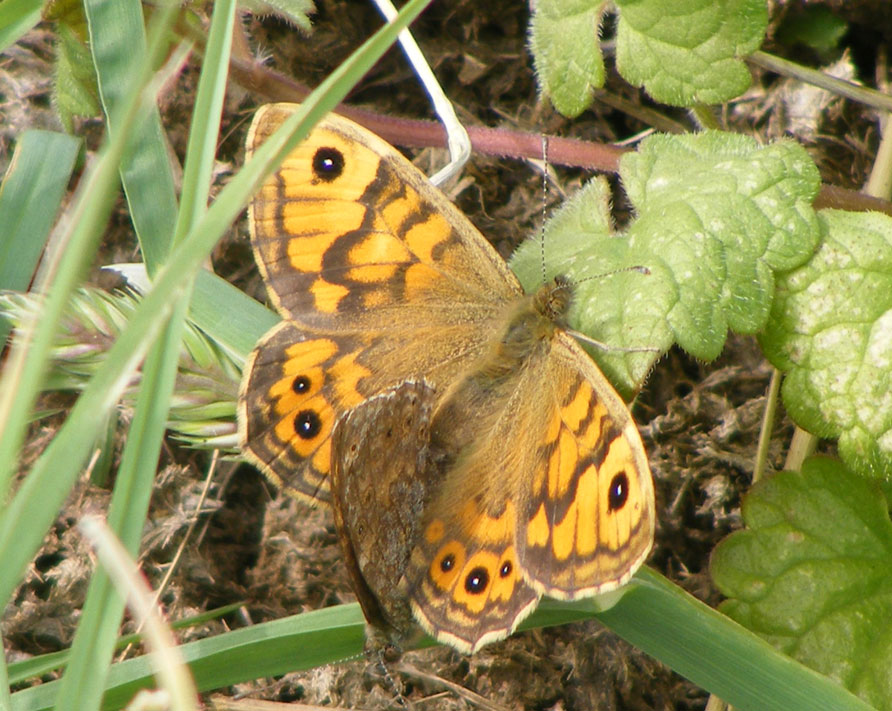
|
|
Small
Blue Butterfly (faded)
|
Female
Adonis Blue
|
Wall
Brown Butterflies
copulating
|
But
the highlight of an early afternoon were two pairs of copulating Wall
Browns (which
I had never seen before mating) in the clearing
to the west of the copse and another pair in the meadow to the north of
the upper car park. A Large White Butterfly
was seen over the verges of the Coastal Link Cyclepath
south
of the Toll Bridge, Old Shoreham.
In
the early evening I ventured up to Buckingham Cutting
south and I immediately spotted a handful of my first Small
Blue Butterflies of the year. None of
them were pristine and a few were faded so they must have been out for
a few days, probably at least a week.
Thirteen
species, the most in a day this year
19
May 2009
On
another blustery day, the only butterfly
seen in Shoreham and the immediate outskirts
was a Wall Brown on
the Coastal Link Cyclepath just north of the Toll
Bridge, Old Shoreham.
17
May 2009
 On
the lower slopes of Mill Hill, the Horseshoe
Vetch,
Hippocrepis comosa,
was at its peak on a blustery (Force
5 gusting to Force 6) late morning but
the Privet could be seen to be making serious inroads compared to previous
years. Because of the breezy conditions on an cloudy day, the butterflies
were not as many as would be expected on a sunny day. On the one acre transect
the count of Adonis
Blues
was
26
males and
three
females. Some of the males were ragged around
the edges. Dingy Skippers
were recorded at five positively identified, with one Small
Heath and my first Painted
Lady of the year. The Painted
Lady was far from pristine. I did not notice
any of the micro-moths in my brief visit. Because
of limited time, I returned quickly by the ridge route where no further
butterflies were seen.
On
the lower slopes of Mill Hill, the Horseshoe
Vetch,
Hippocrepis comosa,
was at its peak on a blustery (Force
5 gusting to Force 6) late morning but
the Privet could be seen to be making serious inroads compared to previous
years. Because of the breezy conditions on an cloudy day, the butterflies
were not as many as would be expected on a sunny day. On the one acre transect
the count of Adonis
Blues
was
26
males and
three
females. Some of the males were ragged around
the edges. Dingy Skippers
were recorded at five positively identified, with one Small
Heath and my first Painted
Lady of the year. The Painted
Lady was far from pristine. I did not notice
any of the micro-moths in my brief visit. Because
of limited time, I returned quickly by the ridge route where no further
butterflies were seen.
The
Pixie
Path produced a Speckled Wood
and my first Red Admiral
since 20 April 2009.
Two
Large
Whites and a Holly
Blue were recorded during passage along
the footpath section of the Waterworks
Road. Another Red
Admiral was blown about just north of Ropetackle.
Flowering
Dates of Horseshoe Vetch
Adur
Butterflies: First Dates
Eight
species
16
May 2009
On
Mill
Hill we saw one Cinnabar
Moth, one Painted
Lady, one Brimstone,
two Peacock Butterflies,
at least ten Dingy Skippers,
one Green Hairstreak
and around 70 Adonis Blues.
On our riverside walk opposite the old cement works in Upper Beeding we
saw one Wall Brown.
Around
Shoreham
I recorded just the one Holly Blue
in the breeze, one Small White
and a few Large Whites.
14
May 2009
In
a cycle ride around Shoreham that took about
an hour, I spotted just two Holly Blues
and a few Large Whites.
11
May 2009
A
Speckled
Wood Butterfly was seen over the Waterworks
Road, a species
not recorded the previous day. Large
Whites were occasionally see in Shoreham
town.
10
May 2009
A
luxuriant expanse of Horseshoe Vetch, Hippocrepis
comosa, covered the lower slopes of
Mill
Hill in the sunshine. Adonis
Blues
were courting and mating and there were too many to count (I gave up at
21) and there were about thirty in the acre transect and over forty seen
on the lower slopes, with occasional Dingy
Skippers including a mating pair, and
at least one pristine Grizzled Skipper,
and a few Brimstones and
at least one Peacock
Butterfly. My first Cinnabar
Moth of the year took flight showing its
distinct red underwing at the same time as my camera malfunctioned.

|
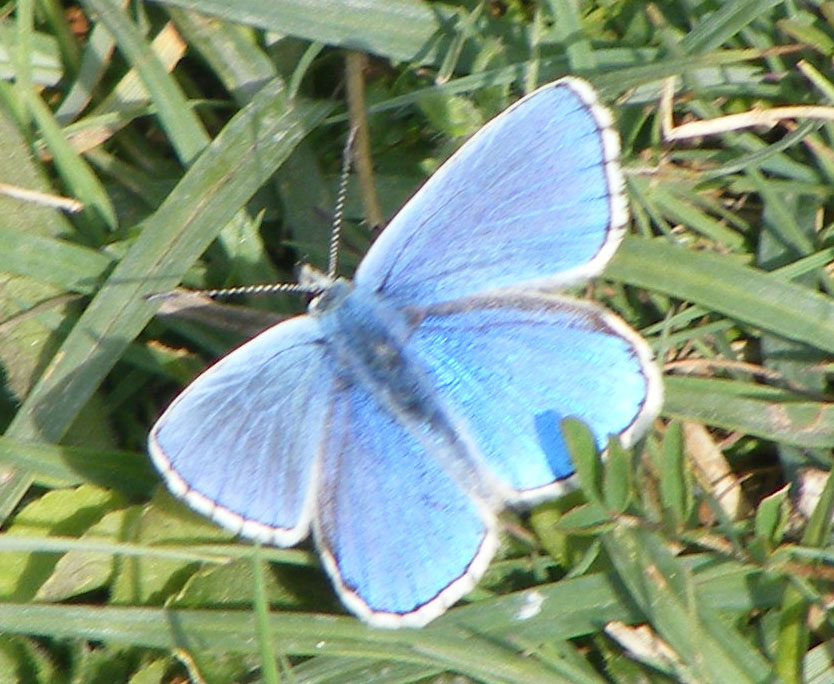
|
 |
|
Lower
Slopes of Mill Hill
|
Male
Adonis Blue
|
Small
Purple-barred Moth
|
The
visit was interrupted (as far as counting was concerned) by the arrival
of Brianne Reeve
and a party of butterfly watchers. On the breeze-blown top of Mill Hill
I encountered a Wall Brown
near the Reservoir, and a definite Green-veined
White on the side of the road near the
southern cattle grid. In Shoreham town and outskirts there were frequent
Large
White Butterflies and at least one Holly
Blue seen. A Small
Purple-barred Moth, Phytometra
viridaria, landed on a Horseshoe Vetch
flower.
Dingy
Skippers mating (photographs)
Nine
species of butterfly
9
May 2009
Three
Holly
Blue Butterflies were recorded whilst
cycling through Shoreham, with occasional Large
Whites in town and on the outskirts, a
few confirmed Green-veined Whites
in Old Shoreham, as well as a few Speckled
Woods over the Pixie
Path.
Four
species
7
May 2009
In
the overcast late morning two Holly Blues
were blown about in the breeze in Shoreham town,
and in the early afternoon when the sun shined, there were a few Speckled
Woods, one male Orange
Tip, one Green-veined
White, occasional
Peacocks,
frequent
Large Whites on the outskirts and one
Brimstone
Butterfly just north of the Toll
Bridge, Old Shoreham.
Then
I changed my mind and visited the lower slopes of Mill
Hill in the afternoon where eight male Adonis
Blues visited the now luxurious Horseshoe
Vetch,
Hippocrepis comosa,
and there were frequent Grizzly Skippers
and Dingy Skippers, three
Brimstones,
two
Peacocks
and a Large White.
There was also a mystery butterfly that almost certainly a female Adonis
Blue. Returning by the shortest ridge
route added four Wall Browns
to one seen earlier on the southern upper part of Mill Hill. On the way
to Mill Hill through the Dovecote Estate I saw more Peacocks
and a Holly Blue.
Eleven
species of butterfly, equal best day total of species this year
6 May
2009
On
a cloudy day when few butterflies would be
expected I saw my first female all-white Orange
Tip of the year flying over and settling
briefly on some Stinging Nettles on the verges of the Coombes Road between
Cuckoo's Corner and Ladywells. Over the verge of Red
Campion, Cow
Parsley and Garlic
Mustard at Ladywells there was a male Orange
Tip chasing a Green-veined
White around and a Speckled
Wood. At Cuckoo's Corner a Large
White Butterfly flew over.
Four
species
4 May
2009
It
was too cloudy and not warm enough for butterflies
to be in flight and a 20 minute visit to the lower slopes of Mill
Hill only showed a Wall Brown
over the southern steps and five Dingy
Skippers were disturbed and counted.
 3
May 2009
3
May 2009
Two
species of butterfly were seen for the first
time this year on the lower slopes of Mill
Hill. Just before midday the first male Adonis
Blue was spotted settled with its wings
folded and 25 minutes later my first definite Small
Heath Butterfly was identified as it settled
with its wings closed. At least five Brimstone
Butterflies were very active over the
lower slopes with frequent Dingy Skippers,
probably in excess of thirty over the one acre transect but only a handful
of Grizzled Skippers
were seen on a day when the sun only shined through the haze for a few
minutes. Danny McEvoy
confirmed the frequency of the Dingy Skippers.
The pyralid micro-moths
were less in numbers seen, frequent (40+) Pyrausta
nigrata, and occasionalPyrausta
despicata. I only visited the lower
slopes with the Horseshoe Vetch,
Hippocrepis
comosa, now flowering
in appreciable amounts but only about 20% of its peak coverage.
In
Shoreham town I spotted a few Large
Whites and on the outskirts there were
two
Speckled Woods.
Adur
Butterflies: First Dates
Seven
species of butterfly, including skippers
2 May
2009
A
very productive two hours on the lower slopes of Mill
Hill around lunchtime. Only one Grizzled
Skipper but 30-40 Dingy
Skippers, three or four Peacock,
one Small Tortoiseshell,
one Wall Brown,
two Holly Blues,
six to eight Brimstonesincluding
two females and one fresh male, a Common
Blue at the northern end, one absolutely
pristine male Adonis Blue
at the extreme south corner - a stunning sight.
This
report of the Adonis Blue and
Common
Blue preceded
my sightings.
(I have not amended the first sightings chart though.)
At
Mill
Hill in the afternoon there were at least
two Wall Brown
alongside four Grizzled Skippers,
twenty plus Dingy Skippers,
three Brimstone,
three Peacock
and single Small Tortoiseshell,
Large
White and Small
White. In our moth trap near Mill Hill
we have had our first Chocolate-tip
and Chinese Characterin
the last few days and Shuttle-shaped Dart
are now making an appearance.
1
May 2009
After
work today I took an hour out and headed up to Mill
Hill where I saw at least 20 Dingy
Skippers and at least 20 Grizzled
Skippers and my first of the year Treble-bar
Moth.
29
April 2009
Mike
Parsons and his two colleagues from Butterfly
Conservation in Dorset were bashing the
Privet
on the lower slopes of Mill Hill in an
unsuccessful attempt to find the caterpillars of the Barred
Tooth-striped Moth, Trichopteryx
polycommata. Mike identified
for me a Green Carpet Moth,
Colostygia
pectinataria.
I
had always realised that some of the Carpet
Moths seen on Mill Hill were different in
colour from the ones seen in Shoreham town and I have probably misidentified
them before as the Common
Carpet Moth,
Epirrhoe
alternata. The micro-moth Pyrausta
nigrata was very common on the lower
slopes as in the previous week.
Grizzled
Skippers and Dingy
Skippers were frequently seen with about
25 of each in the one acre transect, with four Brimstone
Butterflies in the sunshine, two Peacocks,
and two Speckled Woods
over the lower slopes. The Hawthorn scrub area added a further Speckled
Wood, a confirmed Green-veined
White and a Large
White. There were a further two Speckled
Woods, one in the copse at the top and one
on the windswept upper part of Mill Hill.
Other
butterflies
on the day included two male
Orange-tips
over the Waterworks Road and two Holly
Blues nearby.
Adur
Moths
Eight
species of butterfly
 26
April 2009
26
April 2009
A
hurried visit to the lower slopes of Mill Hill
was timed: it took 14 minutes for a trek over the 1.2 acre transect with
three stops. The expected frequent
Grizzled Skippers and Dingy
Skippers were estimated at about twenty
of each, plus three Brimstone Butterflies,
including one pale female. I returned by the same path. A Holly
Blue and a Large
White were seen at the top of Buckingham
Park in Shoreham. In the trees top of The Drive there was a Small
White, Speckled
Wood and a Peacock
Butterfly. At the top of Chanctonbury
Drive (SE of Mill Hill), there were a pair of Speckled
Woods, three Large
Whites, a Holly
Blue and a Peacock.
In Shoreham town another Holly Blue
and Speckled Wood
were noted. There were two further Speckled
Woods over the Waterworks Road and a small
white butterfly that would not settle for
identification. Over Spring Dyke (Adur
Levels) there was a definite Green-veined
White that settled amongst the plentiful
Stinging Nettles, plus a Peacock
and a Brimstone.
On the Coastal Link Cyclepath to Annington Sewer there were hardly any
butterflies
to be be seen so a single Holly Blue
was notable.
Nine
species
25
April 2009
A
passage visit via the
Waterworks
Road produced an instant and tatty Peacock
Butterfly (missing yesterday) on Ground
Ivy, a Small
White, two Large
Whites and a few Speckled
Woods. On the outskirts of Shoreham, there
were more Speckled Woods,
the most prevalent butterfly with over a dozen in under an hour of cycling
around.
A Holly
Blue flew over the path at the southern
end of Frampton's Field, Old Shoreham.
Five
species
24
April 2009
The
sun was out again although there was a Moderate Breeze (Force
4) from the ESE which meant that the south-west
facing slopes of Mill Hill were sheltered.
There was one Speckled Wood
on the steps down to the lower slopes from the south, the expected frequent
Grizzled Skippers and Dingy
Skippers on the lower slopes extending
their range above the ridge on the middle slopes, with a Brimstone
Butterfly and a Large
White also seen. The three local downs
species of Pyrausta
moths
were there in profusion and Pyrausta
nigrata
seemed to be everywhere on
the lower slopes with estimates exceeding 200 an acre.
The
Waterworks
Road hosted one Green-veined
White, two Small
Whites, a Large
White and one or two male Orange-tips.
On the outskirts of Shoreham, there were occasional
Speckled Woods, and more Large
and Small Whites.
A Holly Blue flew
over the path at the southern end of Frampton's Field, Old Shoreham.
Nine
species
23
April 2009
My
first ever confirmed Green Hairstreak Butterfly was discovered on
Mill
Hill in the central area of the lower slopes by the path.
I had suspected sightings in the same area before and this butterfly
had been reported by other visitors. My first
Wall
Brown Butterfly of 2009
was seen over the path approach to the copse from the north-west in an
area this butterfly had been seen regularly in previous years. This
was the first Wall Brown
recorded in the month of April.
On
a slightly duller day, the estimate for Grizzled
Skippers and Dingy
Skippers was about twenty each in the
one acre transect. There was a Speckled
Wood on the steps down to the lower slopes
and other butterflies on Mill Hill included a Small
White amongst the Hawthorn scrub, a handful
of Speckled Woods
under the copse at the top and more in the scrub in excess of a dozen altogether,
a Peacock
on the steps in the north-west, and a Large
White amongst the scrub.
Over
the verges of the Waterworks
Road there was a further Large
White, two male Orange-tips,
a definite Green-veined White,
with another Peacock
on the steps in the nearby Butterfly Copse. There was a handful of Small
Whites at Cuckoo's Corner, and on the verges near Ladywells just to the
north a Comma Butterfly
flew amongst the diseased Elms,
and a Green-veined White waited
on a flowering Garlic Mustard
and attracted an amorous male Orange-tip.
There was also a another Speckled Brown
in Shoreham town in Adelaide Square next to Middle Road allotments.
Eleven
species of butterfly, the most species seen in a single day this year,
despite two expected species (Holly Blue
& Brimstone)
being absent because of the short observation period
Adur
Butterfly Flight Times
Adur
Butterflies: First Dates
22
April 2009
I
was not in the mood for recording butterflies
but the sun was out on the warmest day so far this year, and the Alexanders
in Buckingham Park, Shoreham, were hosting scores of hoverflies
and bees, and the occasional
Holly Blue,
Small
White and Speckled
Wood Butterflies. A visit to Mill
Hill added Peacock,
Orange-tip
and
Brimstone
Butterflies on the upper part with more
Speckled
Woods. The lower slopes hosted at least seven
Grizzled
Skippers, a conservative count of 22 Dingy
Skippers, a few Orange
Tips, a few Brimstones,
a few Peacocks,
at least an estimated 150 Pyrausta
nigrata,
frequent
Pyrausta despicata and at least one
Pyrausta
purpuralis
of the pyralid
micro-moths.
 |
 |
The
Pixie
Path and Waterworks
Road added more Speckled
Woods, a Holly
Blue, another
Orange
Tip
and a confirmed Green-veined
White Butterfly. The Orange-tip
flitted rapidly between nectar plants that included Green
Alkanet, Ground Ivy and
Bluebells. The Green-veined
White was even more active visiting Green
Alkanet
and Ground
Ivy.
Nine
butterfly species
21
April 2009
A
small and colourful pyralid
micro-moth Pyrausta
purpuralisamongst the Horseshoe
Vetch,
Hippocrepis comosa,
leaves on the lower slopes of Mill Hill
was a first of the year. All the smaller white butterflies that settled
proved to be Small Whites
rather than Green-veined Whites.
The most prevalent butterflies on a trip
to Mill Hill and Adur Levels were
Brimstones
with nine on the downs and Speckled Woods
with a total of 17 mostly seen on the Coastal Link Cyclepath.
Adur
Moths
Pyrausta
(fire-winged)
Micro-moths
| Species |
Waterworks
Road & Pixie Path |
Mill
Hill |
Adur
Levels &
Shoreham
Town |
TOTAL |
| Peacock |
1 |
4 |
2 |
7 |
| Speckled
Wood |
4 |
3 |
10 |
17 |
| Small
White |
2 |
|
6 |
8 |
| Large
White |
|
1 |
|
1 |
| Comma |
1 |
|
|
1 |
| Holly
Blue |
2 |
|
|
2 |
| Brimstone |
|
9 |
|
9 |
| Orange
Tip |
1 |
3 |
1 |
5 |
| Grizzled
Skipper |
|
7 |
|
7 |
| Dingy
Skipper |
|
6 |
|
6 |
| TOTAL
10 |
11 |
33 |
19 |
63 |
| Pyrausta
nigrata |
|
17 |
|
17 |
| Pyrausta
despicata |
|
6 |
|
6 |
| Pyrausta
purpuralis |
|
1 |
|
1 |
63
butterflies of ten species, the most species in a single day this year
20
April 2009
A
visit to the overgrown Mash
Barn Lane, Lancing, recorded easily 20 Speckled
Woods, some mating, around five Holly
Blue, a female Orange
Tip, a Comma,
two
Small Tortoiseshell,
a Brimstone,
at least one Small White,
two or more Peacock,
all seen in a small area and in around 15 minutes watching time. Eight
species.
Three
Brimstone
Butterflies, and Orange
Tip and a few Small
Whites were seen near the Toll
Bridge.
Report
by John Knight
A
Speckled
Wood fluttered over my front garden in
Corbyn Crescent, Shoreham-by-Sea. On the outskirts of Shoreham the tally
was one Brimstone,
a few Small Whites and
a Red Admiral.
Four Large Whites
were noted over the short sward and Dandelions
of McIntyre's Field, Lancing Ring Nature
Reserve. The other butterflies on Lancing
Ring and the approaches were eleven Speckled
Woods, one Holly
Blue, one Red
Admiral, and one Comma.
Personal
tally of seven species
 19
April 2009
19
April 2009
A
morning visit to Mill Hill on a dull day
produced just a smattering of butterflies:
a handful (about five) of Grizzled Skippers,
my first Dingy Skipper of
the year, two whites probably Small Whites,
and two good condition Peacock Butterflies
and a Treble-bar Moth (that
landed on me) on the lower slopes. The scrub produced two more whites including
a Large White
and three Speckled Woods.
The most representative feature of the lower slopes were the frequency
(15+) of the small pyralid
moth
Pyrausta nigrata plus at least one
Pyrausta
despicata.
Six
butterfly species
16
April 2009
I
visited
Mill Hill and saw 25+ Grizzled
Skipper, 15+ Dingy
Skipper, six Brimstone,
one Speckled Wood,
four Large Whites,
three Orange-tips,
two Red Admirals,
a Small Tortoiseshell
and numerous Peacocks,
plus a Treble-bar Moth.
15
April 2009
We
visited Mill Hill where we met Neil
Hulme and saw between 20 and 30 Grizzled
Skippers and newly emerged Dingy
Skippers.
(first
of the year).
Adur
Butterflies: First Dates
Adur
Skippers
In
the late afternoon the butterfly count was a mere two Red
Admirals, one in Gordon Road, Shoreham,
and one over the Waterworks
Road, Old Shoreham.
14
April 2009
Two
small day-flying in moths put in their first appearance
of the year on the lower slopes of Mill Hill
(Old Shoreham): these were the pyralids, three
Pyrausta
despicata and two Pyrausta
nigrata. Two Grizzled
Skippers were recorded.
The
first yellow Horseshoe Vetch, Hippocrepis
comosa, flowers appear on the lower
slopes of Mill Hill, hosting small black pollen
beetles, Meligethes erichsoni.
This
report was incomplete because of a computer failure.
13
April 2009
In
the late afternoon, my first Holly Blue
Butterfly of the year was seen fluttering
over a garden overlooking the Waterworks
Road. Two or three male Orange-tip
Butterflies were seen over the Waterworks
Road with a few Speckled
Woods and one yellow Brimstone
Butterfly in the distance. Two Large
White Butterflies were seen in Shoreham
town and a Small White Butterfly
and another Speckled Wood
on the Pixie Path. A Red
Admiral flew over the Red
Lion public house and another one was seen at
at the top of Chanctonbury Drive, Shoreham, near Mill
Hill.
Seven
species
Adur
Butterflies: First Dates
Cabbage
Whites under Threat (Message on UK Wildlife Yahoo Group)
9 April
2009
There
were plenty of Grizzled Skipper action
on the lower slopes of Mill Hill (Shoreham)
(TQ 210 073)
. At least twelve were actively 'turf-hopping' as they constantly sought
out nectar from the violet
flowers. After about an hour I saw my first female of the year, probably
on her maiden flight. As soon as she appeared she was accosted by an amorous
male, and after a brief courtship (he crash-landing beside her and 'trying
it on' several times) they copulated. I was soon joined by David
Dancy, who was first to spot a Small
Copper (first of 2009)
at the northern end of the site. Other butterflies included six Peacock,
two Comma,
one Small Tortoiseshell,
one
Brimstone
and a Small White.
Seven
species
Adur
Butterflies: First Dates
Adur
Skippers
8
April 2009
The
first nest of the Brown-tailed Moth of
the year was discovered on the Slonk Hill Cutting
south in the overgrown clearing alongside the path.
Adur
Moths |
 |
7 April
2009
A
Speckled
Wood flew over the bridlepath near the
entrance road to Lancing College to Lancing
Ring. Another one was seen under the clump at the top, and a
Peacock
Butterfly over the bridlepath as it passed
the chalkpit and another one over the chalkpit itself. McIntyres Field
produced two Small Whites
and three Green-veined Whites
on a downhill passage journey.
 6
April 2009
6
April 2009
Two
further butterflies put in their first appearances
of the year: a single Speckled Wood
in the copse on top of Mill Hill, and a
male Orange-tip Butterfly
over the verges of Waterworks
Road. My first trek was to the lower slopes
of Mill Hill where five Peacock Butterflies
were seen, and one, possibly two Grizzled
Skippers at the northern end. A Large
White Butterfly flew over the Dovecote
Estate, north Shoreham, and a few Small
Whites were seen in town. In the early
afternoon, I made a passage visit to the Waterworks
Road, where a handful of Green-veined
White Butterflies
were seen immediately
together with a
Brimstone Butterflyand
a Comma Butterfly as
well as the already mentioned
Orange-tip.
Further
Peacock Butterflies
were seen during the day on the outskirts of Shoreham.
Adur
Butterflies: First Dates
Nine
species
5
April 2009
The
first of the year Lancing Ring Small
Tortoiseshell Butterfly was spotted.
The
first four confirmed Green-veined White
Butterflies of the year were seen on the
verges of Waterworks
Road, Old Shoreham,
with
a
Brimstone Butterfly,
and a Peacock Butterfly
sparring with a Comma Butterfly.
Other butterflies seen in town were a few
Small
Whites and a few Peacocks,
and on a round trip to Botolphs and back there a few Comma
Butterflies, occasional Peacocks,
and a few indeterminate Whites.
There was a suspected Speckled Wood flying
rapidly over the Coombes Road near the Rectory Cottage, Coombes.
Adur
Butterflies: First Dates
Five
confirmed species
4 April
2009 Evening
A
search of the Privet
bushes on Mill Hill did not produce the desired Barred
Tooth-striped Moth, Trichopteryx
polycommata,
but
we did find three Pale Flat-body, Agonopterix
pallorella, micro-moths on the lower
slopes.
Adur Moths
4 April
2009
A
Small
White Butterfly flew over a garden in
Dolphin Road, Shoreham, the same one as before.
2 April
2009
Two
Comma
Butterflies were spotted, one in the Butterfly
Copse near the Waterworks Road and
the other on the south-north section of the Pixie
Path. In the late afternoon a Peacock
Butterfly was seen on the steps of the
Butterfly Copse on another passing visit.
1
April 2009
A
Small
White Butterfly flew over a garden in
Dolphin Road, Shoreham.
An
interesting encounter with a butterfly occurred earlier in the evening.
Opening the front door in south Lancing to go out we discovered a
Large
White Butterfly had attached itself to
the green painted south facing door and settled for a doze on the warm
surface.
I
was able to fetch the camera and take several photographs without so much
as a flicker from the insect. At 8:00 pmand
just had a look to see it still there sound asleep !
Adur
Butterflies: First Dates
|
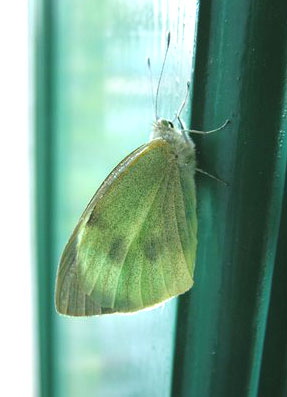 |
31
March 2009
A
large white Brimstone
Butterfly*
was seen on my travels through
Southwick as well as a Small White Butterfly.
(* It could have been a Large White?)
30
March 2009
The
first Grizzled Skipper
of the year seen on the lower slopes of Mill
Hill was a great surprise and the first one recorded in March.
I also recorded my first Small Tortoiseshell
of 2009 with
two of them visiting the violets
in the same location, as well as my first Small
White Butterfly of 2009
in Adur Avenue, north Shoreham. The frequent Peacock
Butterflies were the most plentiful on
the day which included four Brimstone Butterflies
mostly on the outskirts of Shoreham and one Comma
Butterfly on a fleeting visit to the Waterworks
Road.
24
butterflies
of seven species of were recorded in the sunshine including
a Red Admiral
at the top of Chanctonbury Drive, near Mill Hill.
Count:
Peacock
15, Brimstone 4, Small Tortoiseshell 2, Grizzled
Skipper 1,
Small
White 1, Red Admiral 1, Comma
1.
Adur
Butterfly Flight Times
Adur
Butterflies: First Dates
Adur
Skippers
22
March 2009
A
white
butterfly appeared over my Lancing garden
in the afternoon. I think it was a Large White*.
Also a Comma
settled close to my feet.
*NB.
I have put this down as a white Brimstone
Butterfly.
Large
Whites have not been recorded locally in March.
But it is still a possible?
At
least three Peacock Butterflies visited
the Sweet Violets on
the lower slopes of Mill
Hill. One characteristic of the violetson
this original chalkhill although there were tens of thousands scattered
over the main transect area, the leaves were exiguous compared to violets
growing in more fertile soil. A Comma Butterfly
landed on the northern part of Frampton's Field, and another Comma
landed
on the Waterworks Road,
Old Shoreham.
21
March 2009
A
Red
Admiral flew across Ray
Hamblett's garden in south Lancing.
20
March 2009
Spring
has definitely sprung at Mill Hill with
a minimum of four Small Tortoiseshell and
seven Peacock
Butterflies feeding amongst the profusion
of violets
on the lower slopes of Mill Hill. This
is the first report of a Small Tortoiseshell
in 2009.
Adur
Butterflies: First Dates
A
Brimstone
Butterfly settled for a fraction of a
second on a solitary Dandelion
flower on the verges of the Waterworks Road
(footpath section) but otherwise flew strongly to and fro along the hedgerow,
to the west, without settling. Between six to eight Comma
Butterflies were seen in scattered locations,
most of them on the Coastal Link Cyclepath at the Upper Beeding end, where
two Peacock Butterflies
flew past as I cycled to Botolphs and back.
18
March 2009
A Comma
Butterfly and a Peacock
Butterfly sparred over the meadow immediately
to the west of the copse to the west of the eastern car park of Lancing
Ring Nature Reserve. On a walk around the the main ring of trees at
least two more Comma Butterflies
and three or more Peacock Butterflies
were also seen on a sunny day.
17
March 2009
A
bright yellow Brimstone Butterfly
flew rapidly over Manor Hall Road, Southwick at the Portslade end (near
the Gardener Arms) and later a paler almost white Brimstone
Butterfly was seen flying over Portslade Cemetery.
16
March 2009
Three
Comma
Butterflies were recorded, one on the
Coombes Road, literally, north of Ladywells, one in the Butterfly Copse
next to the Waterworks Road,
and the third one over the top of Mill Lane in Shoreham. None of them settled
long enough for a photograph.
15
March 2009
My
second butterfly of the year was an unidentified vanessid
that flew from the western end of Rosslyn Road, Shoreham town over Buckingham
Road just after midday
in the weak sunshine (13.5 °C).
A
Comma Butterfly north
of Old Shoreham on the western end of the Field Maple footpath to the Waterworks
Road surprised me, and another surprise came
with a Peacock Butterfly
resting on the steps of the Butterfly Copse near the Waterworks
Road. There were two further vanessids,
probably Commas
nearby. I was even more surprised by a bright yellow Brimstone
Butterfly over the Pixie
Path at the northern end by the north east part of Frampton's filed,
but skirting the chestnut fencing that separates the path from Mill Hill
Cutting. These were all firsts of the year.
There was a Red Admiral
over the grass and the edges of the copse at the top of Chanctonbury
Drive, and probably the same one that was seen a week
earlier. There were five Peacock Butterflies
over Mill Hill, two on the lower slopes
and three amongst the scrub as I returned without visiting the upper part
of the hill.
12
butterflies of four species
Adur
Butterfly Flight Times
Adur
Butterflies: First Dates
Adur
Levels 2009
 8
March 2009
8
March 2009
My
first butterfly seen this year was a Red
Admiral induced out of hibernation by
the weak sunshine over the grass and the edges of the copse at the top
of Chanctonbury Drive, south-east of the bridge
over the A27
to Mill Hill.
3 January
2009
Our
first moth of 2009
was, unexpectedly, a Double-striped Pug,
Gymnoscelis
rufifasciata, that we found in our
kitchen (Mill Hill, Shoreham).
Butterfly
& Large Moth List 2008
Adur
Butterfly Flight Times (New File)
Adur
Butterflies 2008
Earliest
Butterfly Sightings Summary
Sussex
Butterflies
Butterfly
Flight Times (best site)
Butterfly
Conservation: First Sightings
UK
Butterflies Discussion Board
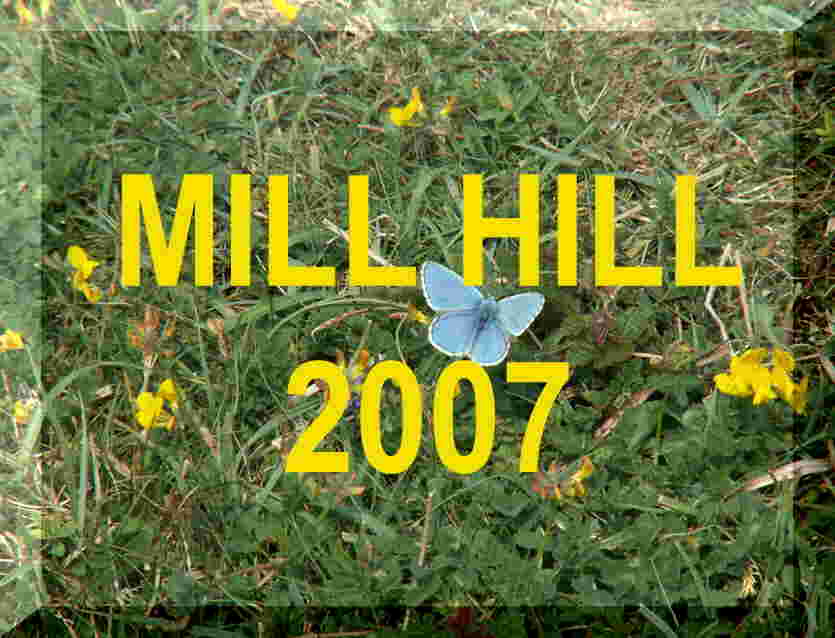


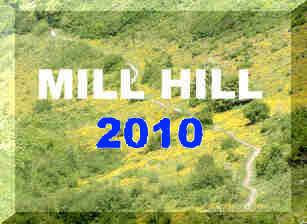
 All
observations by Andy Horton, unless stated otherwise.
All
observations by Andy Horton, unless stated otherwise.


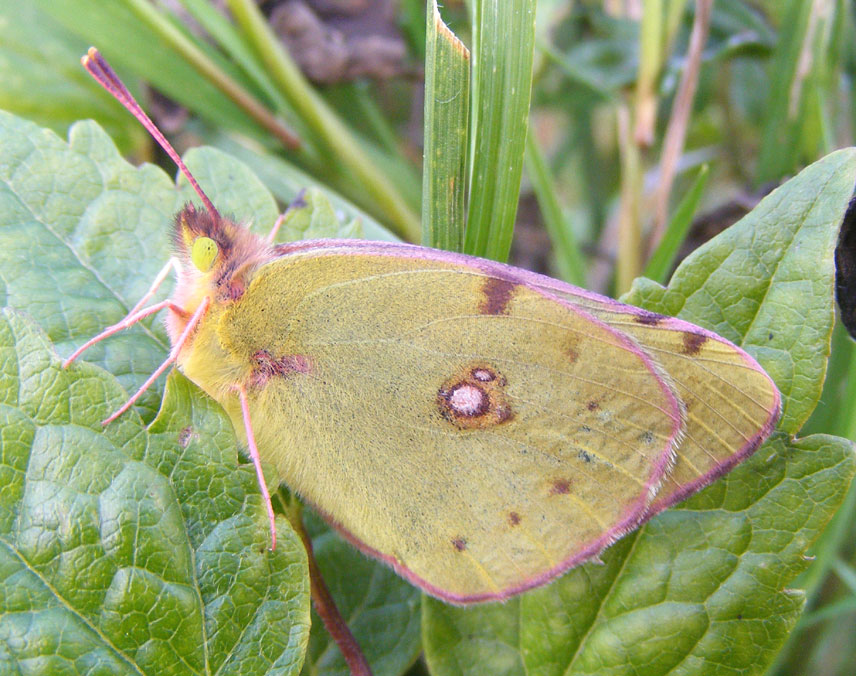



















 On
a breezy day, the lower slopes of Mill Hill
were sheltered compared to the exposed plateau. Meadow
Browns
were
the most prevalent butterfly with about fifty
seen on the lower slopes and something like the same number again on passage
over the top meadows and scrub. The most notable sightings were the large
number of female Adonis
Blues on the lower slopes only. Out of
38
Adonis
Blues,
21 were males and 17 were the brown
females and for most of the time the female count outnumbered the bright
blue males. This count of females is the highest
ever on the lower slopes. There was a possibility that a few, four at most,
were female Chalkhill Blues. On the lower
slopes there were four male Chalkhill Blues,
two Common Blues,
two Wall Browns,
a Large White or
two, at least one Small Heath,
one Speckled
Wood, at least one Gatekeeper
and
a strong flying Clouded Yellow.
There were frequent small pyralid
moths
and a few Shaded Broad-bar Moths,
Scotopteryx
chenopodiata. Both Speckled Woods
and Meadow
Browns
were
frequent in the Hawthorn scrub with two more Wall
Browns recorded. In contrast the top meadows
hosted Common
Blues
of
both genders in lesser numbers than previously but well over fifty actually
seen under an overcast sky. All the potential
Brown
Argus
turned out to be female Common Blues.
Blown
about on the top of the hill there was just one Painted
Lady and one Small
Heath seen and occasional Small
Whites. There was a Holly
Blue around the Ivy on the southern part
of the Pixie Path.
On
a breezy day, the lower slopes of Mill Hill
were sheltered compared to the exposed plateau. Meadow
Browns
were
the most prevalent butterfly with about fifty
seen on the lower slopes and something like the same number again on passage
over the top meadows and scrub. The most notable sightings were the large
number of female Adonis
Blues on the lower slopes only. Out of
38
Adonis
Blues,
21 were males and 17 were the brown
females and for most of the time the female count outnumbered the bright
blue males. This count of females is the highest
ever on the lower slopes. There was a possibility that a few, four at most,
were female Chalkhill Blues. On the lower
slopes there were four male Chalkhill Blues,
two Common Blues,
two Wall Browns,
a Large White or
two, at least one Small Heath,
one Speckled
Wood, at least one Gatekeeper
and
a strong flying Clouded Yellow.
There were frequent small pyralid
moths
and a few Shaded Broad-bar Moths,
Scotopteryx
chenopodiata. Both Speckled Woods
and Meadow
Browns
were
frequent in the Hawthorn scrub with two more Wall
Browns recorded. In contrast the top meadows
hosted Common
Blues
of
both genders in lesser numbers than previously but well over fifty actually
seen under an overcast sky. All the potential
Brown
Argus
turned out to be female Common Blues.
Blown
about on the top of the hill there was just one Painted
Lady and one Small
Heath seen and occasional Small
Whites. There was a Holly
Blue around the Ivy on the southern part
of the Pixie Path.

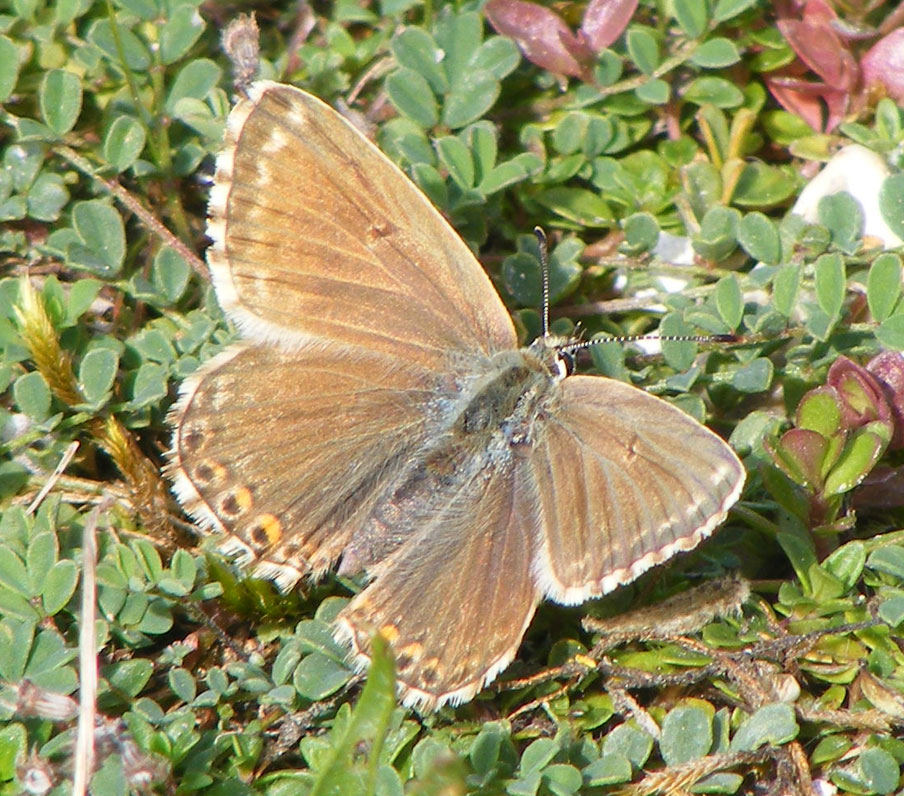
 16
August 2009
16
August 2009
5014.jpg)



 The
following butterflies were seen on route:
frequent
Large Whites, Small Whites,
Painted
Ladies, and Common
Blues,
occasional
Green-veined Whites,
Speckled
Woods,
Gatekeepers
and Meadow
Browns,
three Wall Browns,
three fresh Comma Butterflies,
two Red Admirals,
one Small Tortoiseshell,
five Chalkhill Blues
(including
one female at the Mill Hill Cutting south-west), two Holly
Blues, and a confirmed Brown
Argus
and a Small Blue
(both at Buckingham Cutting). Many of the
female Common Blues
are entirely brown on the upper wings with orange spots and no trace of
blue colour.
The
following butterflies were seen on route:
frequent
Large Whites, Small Whites,
Painted
Ladies, and Common
Blues,
occasional
Green-veined Whites,
Speckled
Woods,
Gatekeepers
and Meadow
Browns,
three Wall Browns,
three fresh Comma Butterflies,
two Red Admirals,
one Small Tortoiseshell,
five Chalkhill Blues
(including
one female at the Mill Hill Cutting south-west), two Holly
Blues, and a confirmed Brown
Argus
and a Small Blue
(both at Buckingham Cutting). Many of the
female Common Blues
are entirely brown on the upper wings with orange spots and no trace of
blue colour.













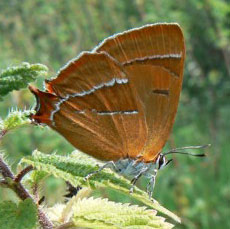





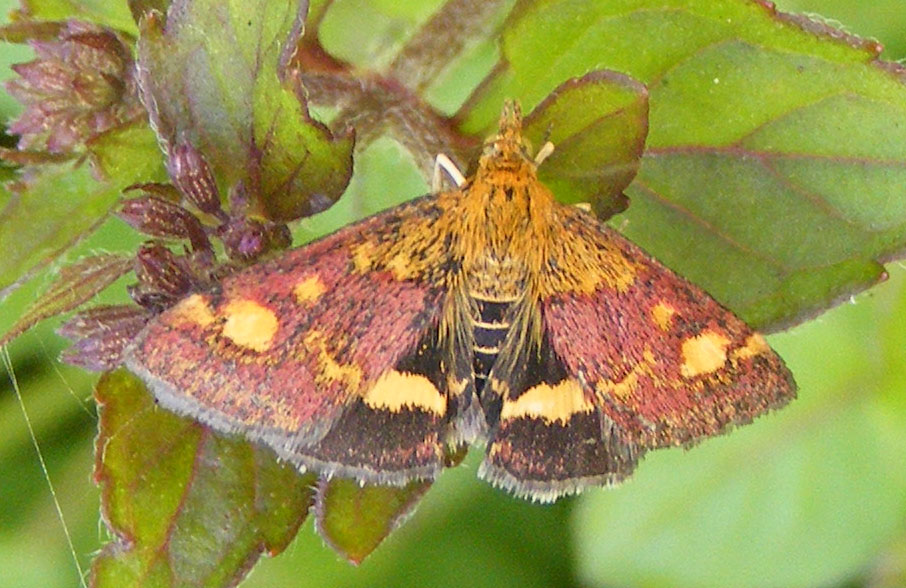























































401.jpg)













